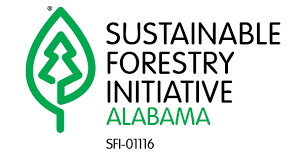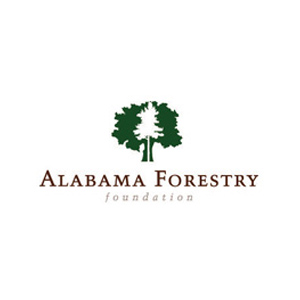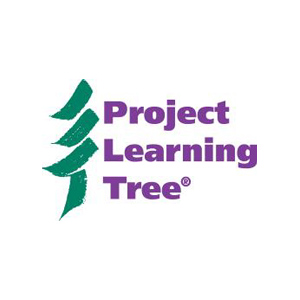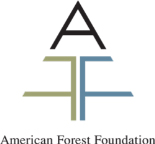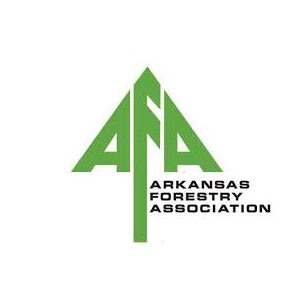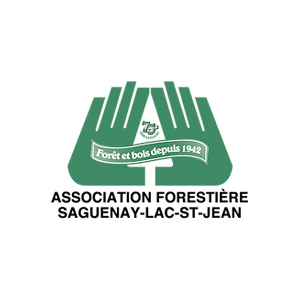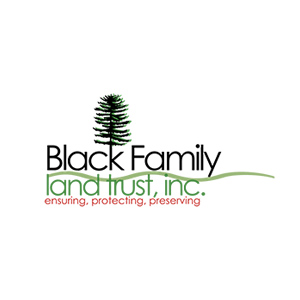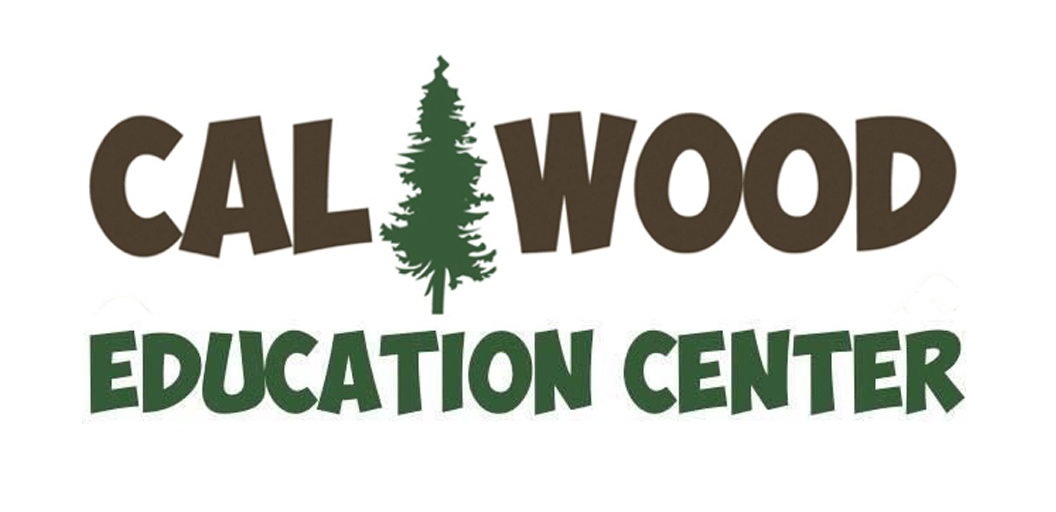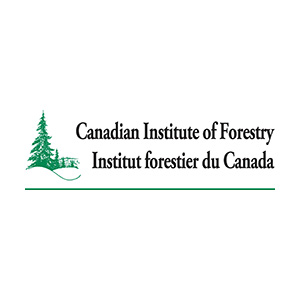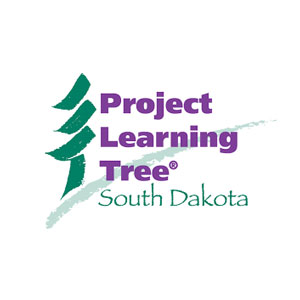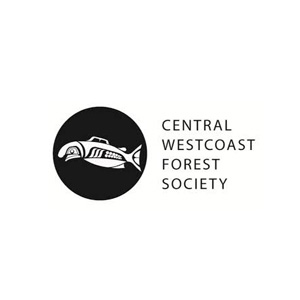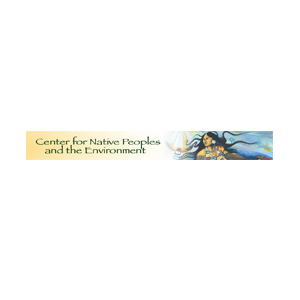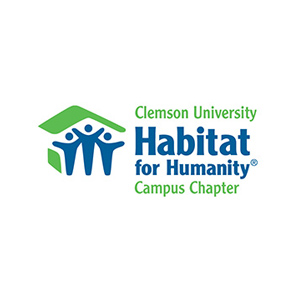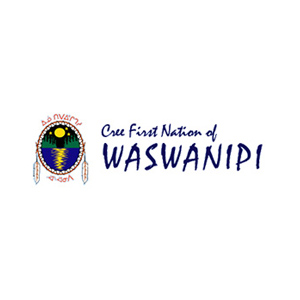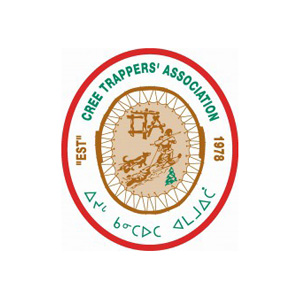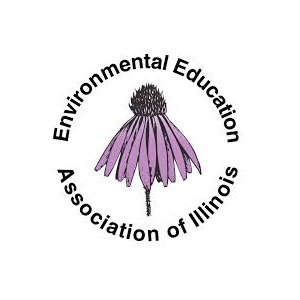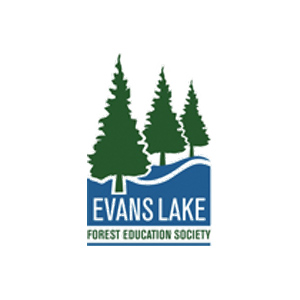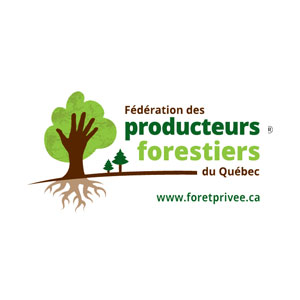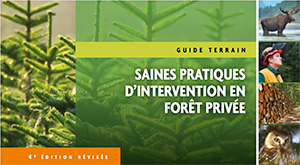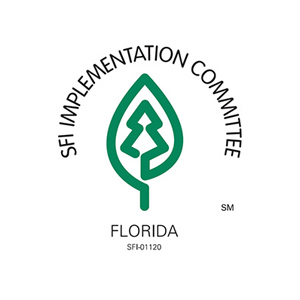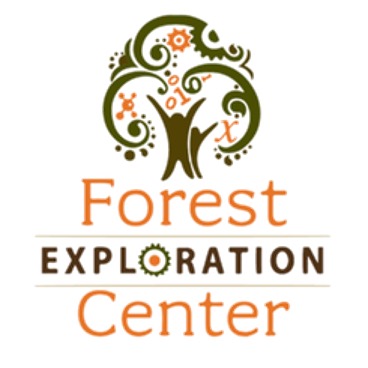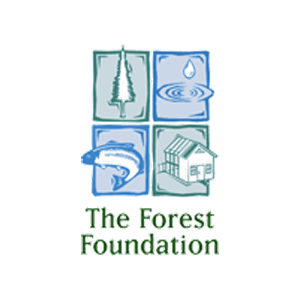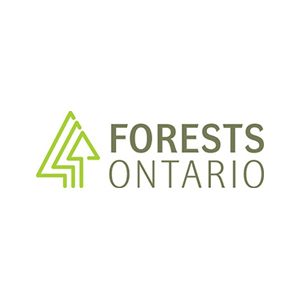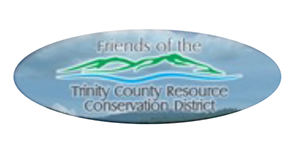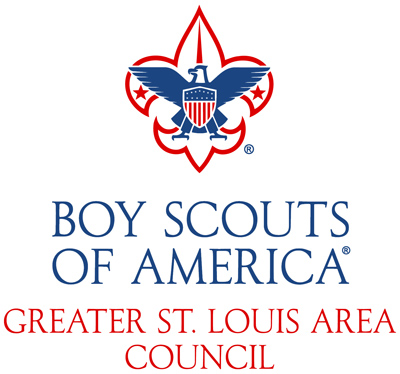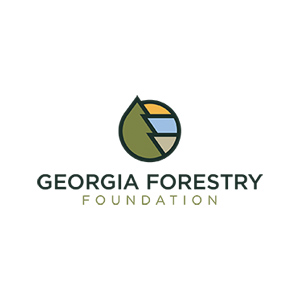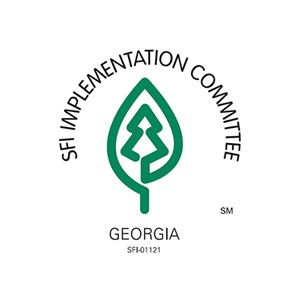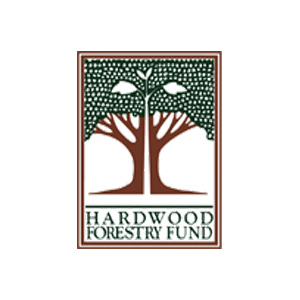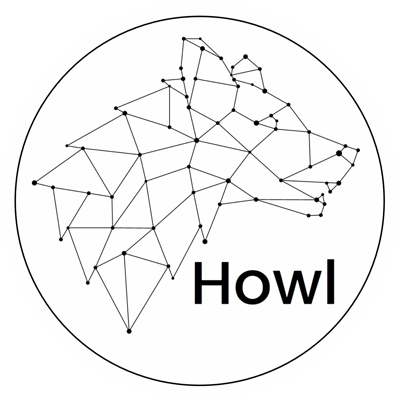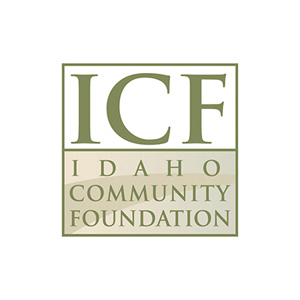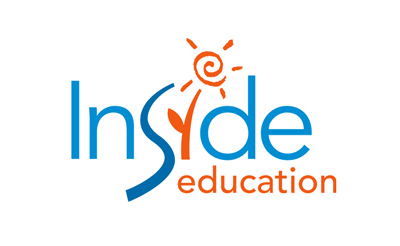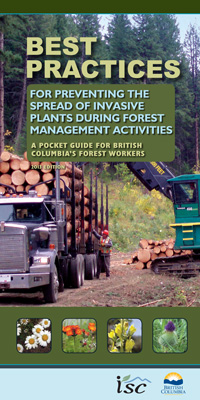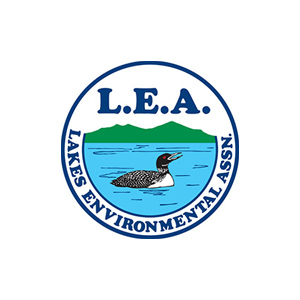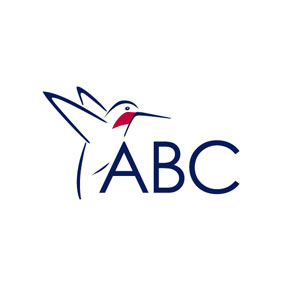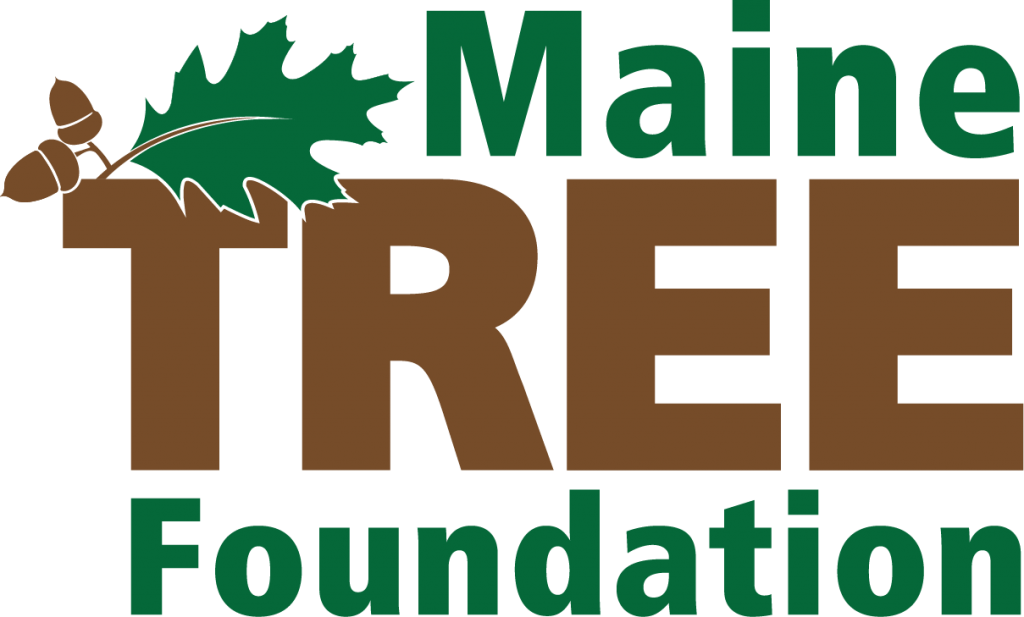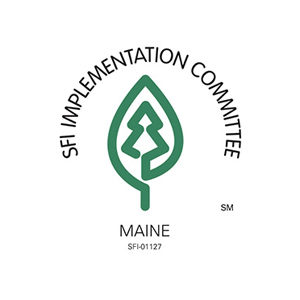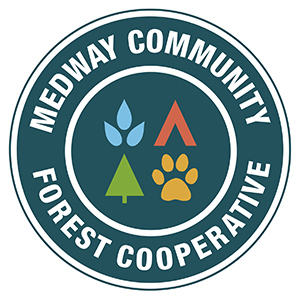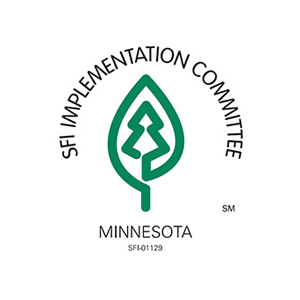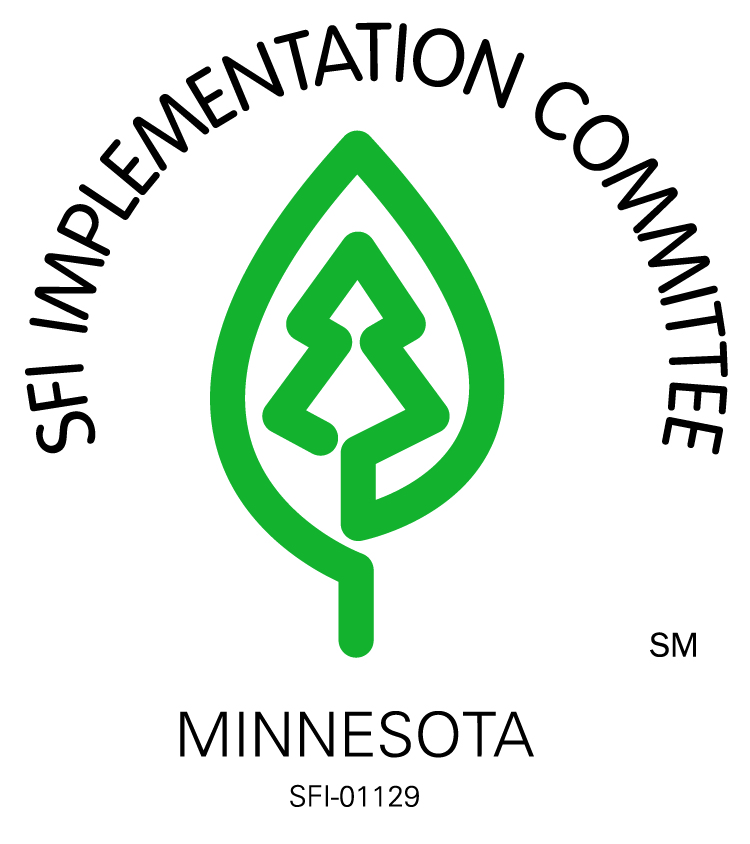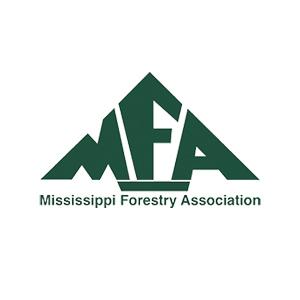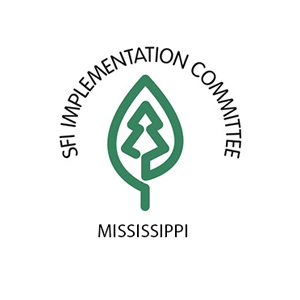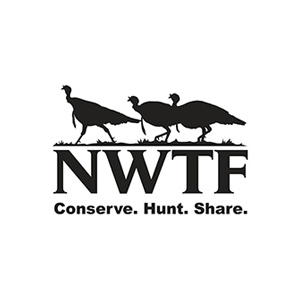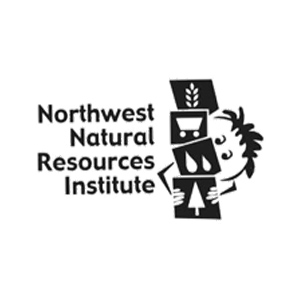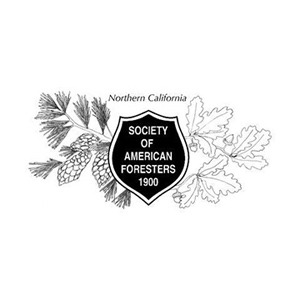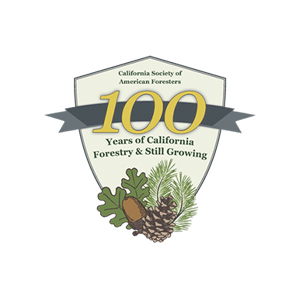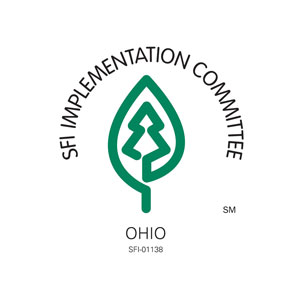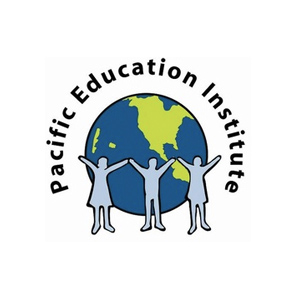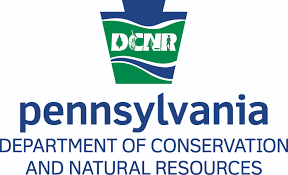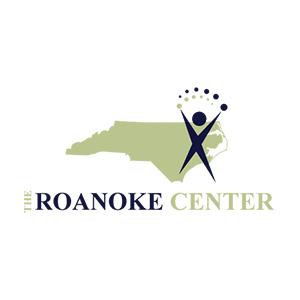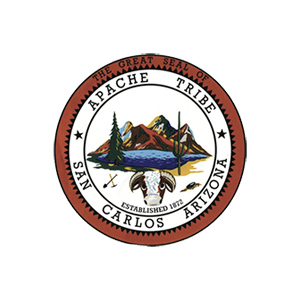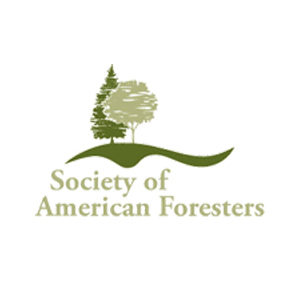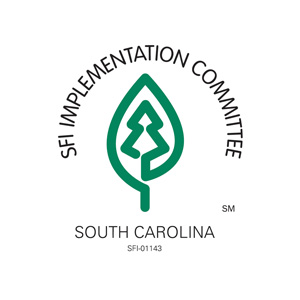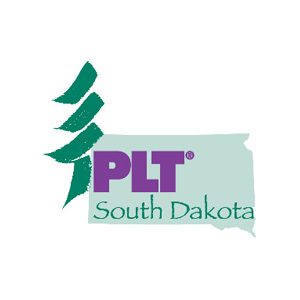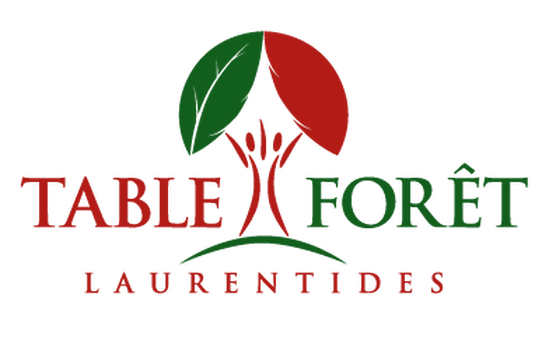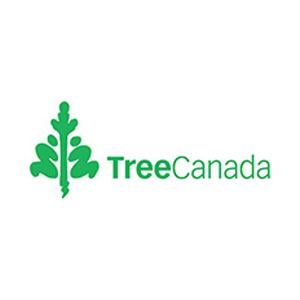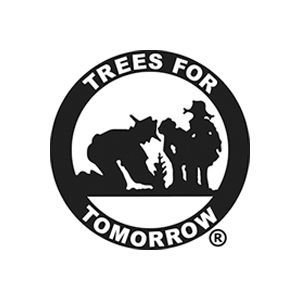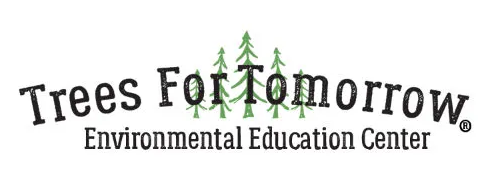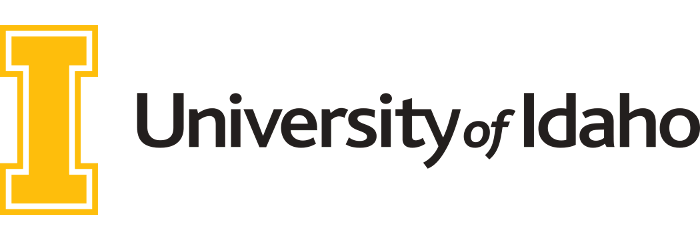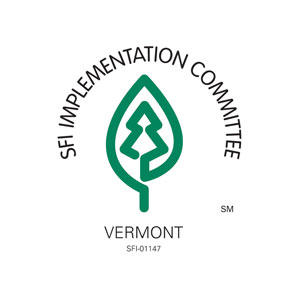SFI COMMUNITY GRANTS
The SFI Community Grants promote collaboration with the SFI Network to support local communities’ understanding of the value and benefits from sustainably managed forests.
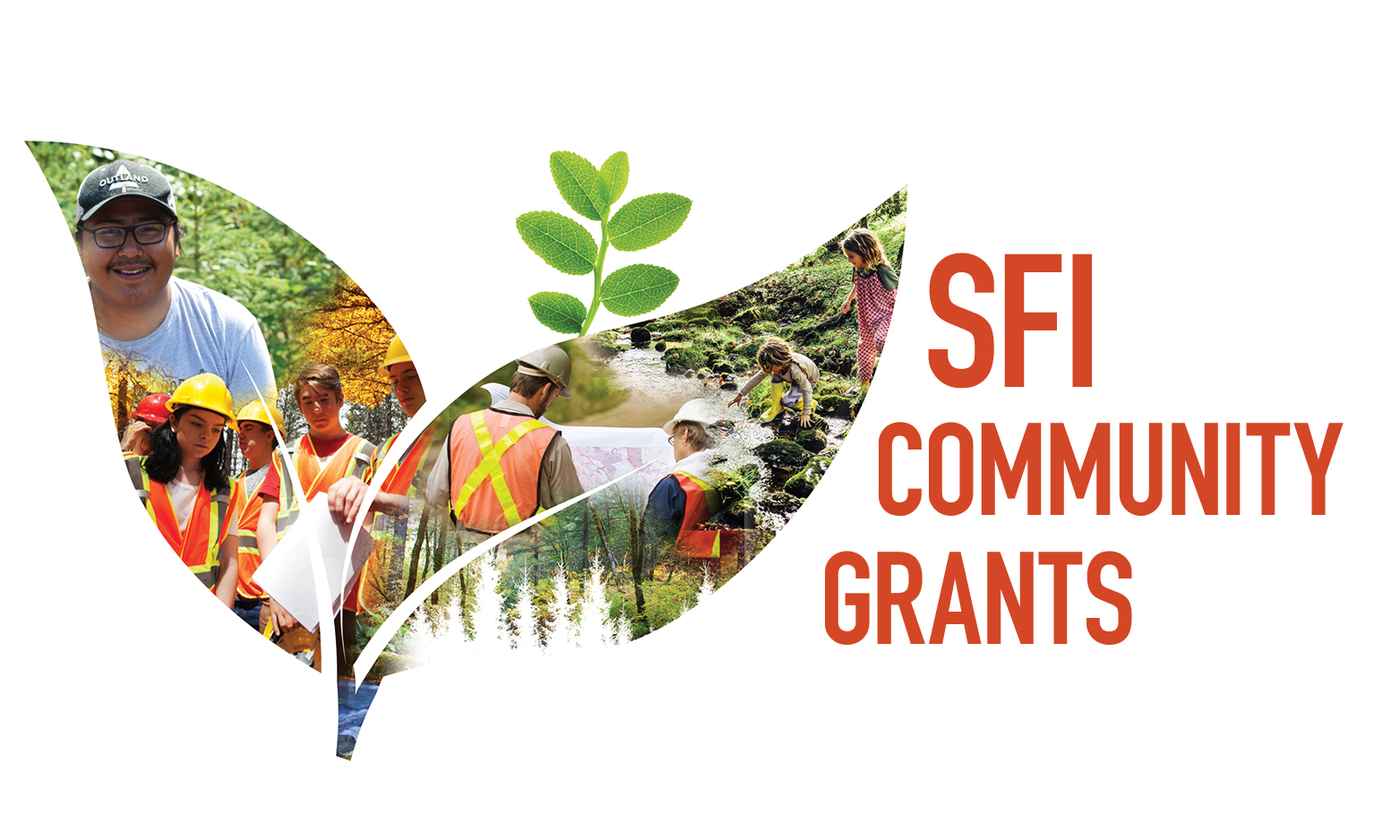

SFI Community Grants are awarded for collaborative community-based projects, activities or events that support SFI’s efforts to connect communities to forests. Projects supported have included providing educators with tools to showcase green career pathways with students, incorporating Indigenous knowledge into forest management planning and education curriculum, and building youth engagement in outdoor education and conservation project.
Since the SFI Community Grant Program started in 2010, SFI has awarded 118 grants totaling more than $1 million invested to foster community-building projects. The 16 new grants of the 2023 program represent a record-breaking number of projects supported and more than $215,000 in total funding announced.
SFI does not anticipate awarding any new community grants in 2025.
GRANTS BY CATEGORY
SFI Community Grants
GEORGIA SFI IMPLEMENTATION COMMITTEE
Influencing Biological Diversity Conservation in Georgia with Digital Outreach Tools
Providing Actionable and Accessible Conservation Recommendations for Loggers, Foresters, and Landowners Across the State of Georgia
Why this Project Matters
Forests account for 67% of Georgia’s total land area. These forest lands are being sustainably managed to meet the numerous needs of the state today, while ensuring resource availability in the future. But there are challenges to this bright future. Consider, for example, that 751 of Georgia’s native plant species are of “special concern.” Some are critically endangered with no protection by law, even on state or federal land. The populations are rapidly dwindling and could become extinct if conservation actions do not occur quickly, according to the State Botanical Garden of Georgia at the University of Georgia.
How This Project Will Influence Biodiversity Conservation in Georgia
The Georgia SFI Implementation Committee will leverage ongoing biodiversity conservation analysis to create targeted, professionally designed digital media products to summarize major findings. These summaries will include recommendations for conservation measures that will benefit the highest-priority Forests of Exceptional Conservation Value in Georgia. The grant will also support a library to target landowner and wood supplier audiences. The grant will develop regionally specific outreach and education tools, including online factsheets and information packets, tailored to specific regions. The materials will present targeted, engaging forest management recommendations that will be incorporated seamlessly into existing training programs and websites.
SFI’s Contribution
The SFI Community Grant Program and the Georgia SFI Implementation Committee are supporting this project.
Partners
This partnership includes state natural resources officials and an SFI-certified organization.
- Project lead: Georgia SFI Implementation Committee
- Sustainable Forestry Initiative
- Georgia Department of Natural Resources
Related Information
Georgia SFI Implementation Committee: Georgia Forestry Community Habitat for Humanity Build
Georgia SFI Implementation Committee Collaborates with Georgia Heirs Property Law Center

About Georgia SFI Implementation Committee
The Georgia SFI Implementation Committee vigorously supports compliance with Georgia’s Forestry Best Management Practices and sustainable forestry principles outlined in the SFI standards. The Georgia SFI Implementation Committee is part of a network of SFI Implementation Committees that respond to local needs at the state, provincial, and regional levels. SFI has been working to make a positive difference in Georgia forests since 1995. Learn more.
Share
COPY LINK: https://forests.org/grant-georgia-sic/
UNIVERSITY OF GEORGIA RESEARCH FOUNDATION
Brainstorming Implementation of the New SFI Urban and Community Forest Sustainability Standard
Increase Certification to the New SFI Urban and Community Forest Sustainability Standard
Why this Project Matters
The new SFI Urban and Community Forest Sustainability Standard is the world’s first forest standard for communities. Promoting nature-based solutions and resilience to climate change, the standard includes 16 objectives for urban and community forest certification. The standard applies to cities and towns of all sizes, anywhere in the world, and is also designed for corporate, hospital, and university campuses. This project is focused on maximizing the standard’s potential to enhance sustainability through communication and implementation strategies.
How This Project Will Help Spread Certification With the SFI Urban and Community Forest Sustainability Standard
This project will deliver a two-day workshop designed to increase certification to the SFI Urban and Community Forest Sustainability Standard. Workshop attendees will include a range of experienced people interested in urban forestry, as well as underrepresented groups and students. SFI’s standard development process already includes several opportunities for public input, including public comment periods and webinars. This project creates an additional opportunity in the form of a facilitated meeting to brainstorm communication and implementation strategies.
Reviewing the standard components will lead to a valuable discussion about the implementation and management of the standard. The discussion will inform communications and education regarding applying the standard across communities. One of the facilitators of the meeting, Dr. Parag Kadam, a standards auditor for almost five years, intimately understands SFI standards. Kristen Morales, Communications Director at the University of Georgia’s Warnell School of Forestry and Natural Resources, will be a primary facilitator.
SFI’s Contribution
The SFI Community Grant Program is supporting this project. SFI will share the project’s findings through its network to amplify its impact. SFI will also provide venues for presenting the project’s final report.
Partners
This partnership includes University of Georgia academics and staff, representatives from the International Society of Arboriculture and SFI.
- Project lead: University of Georgia Research Foundation
- Sustainable Forestry Initiative
- Georgia SFI Implementation Committee
- International Society of Arboriculture
Related Information
SFI Urban and Community Forest Sustainability Standard
Georgia Forestry Foundation 2023 Grant
Georgia SFI Implementation 2023 Grant
University Of Georgia: Quantifying Impacts of SFI’s Fiber Sourcing Standards in Georgia

About University of Georgia Research Foundation
The University of Georgia Research Foundation, Inc. (UGARF) performs two primary functions in support of research at the University of Georgia (UGA). UGARF is the named party to sponsored research agreements for projects to be performed at UGA. UGARF also owns the patents and other intellectual property developed at UGA. Through Innovation Gateway, UGARF protects, markets, and licenses its intellectual property portfolio throughout Georgia and the US and across the globe. Learn more.
Share
COPY LINK: https://forests.org/grant-uog-research-foundation/
ALABAMA SFI IMPLEMENTATION COMMITTEE
Home Tweet Home Alabama
Enhancing Forest Species Biodiversity Through Collaborative Education
Why this Project Matters
Alabama is blessed with rich biodiversity and myriad organizations that work hard to enhance it. But promoting and sharing that work across the state can be difficult. This project will support compiling a wide range of biodiversity data and information drawn from across the state to provide for greater educational outreach. Maximizing the educational impact of biodiversity champions across Alabama will have a powerful multiplier effect when it comes to enhancing Alabama’s overall biodiversity.
How This Project Will Influence Biodiversity Education and Conservation in Alabama
The Alabama SFI Implementation Committee is creating opportunities for collaborative educational work on species biodiversity to meet the requirements of the SFI 2022 Forest Management Standard. Critically imperilled, imperilled, threatened, and endangered species in Alabama will be the focus of this educational and collaborative work. This project focuses on bringing together various organizations to share knowledge, develop workshops and outreach programs, and create support materials. The primary focus will be on youth, private landowners, foresters, loggers, and other natural resources professionals. The Alabama SFI Implementation Committee will partner with Alabama Project Learning Tree, (Alabama PLT), SFI’s educational initiative in the state, to help develop and deliver educational materials.
SFI’s Contribution
The SFI Community Grant Program, the Alabama SFI Implementation Committee, and Alabama PLT are supporting this project.
Partners
This partnership includes state natural resources officials, academics, educators, and an SFI‑certified organization.
- Project lead: Alabama SFI Implementation Committee
- Sustainable Forestry Initiative
- Alabama Project Learning Tree
- Alabama Department of Conservation and Natural Resources
- Alabama Forestry Commission
- Alabama Natural Heritage Program
- Auburn University College of Forestry, Wildlife and Environment
Related Information

About Alabama SFI Implementation Committee
The Sustainable Forestry Initiative is represented across the state by the Alabama SFI Implementation Committee, which supports compliance with Alabama’s Forestry Best Management Practices and sustainable forestry principles outlined in the SFI standards. The Alabama committee operates as a grassroots infrastructure, reflecting geographic and organizational diversity throughout the state. The Alabama SFI Implementation Committee is part of a network of SFI Implementation Committees that respond to local needs at the state, provincial, and regional levels. Learn more.
Share
COPY LINK: https://forests.org/grant-alabama-sfi-sic/
ASSOCIATION FORESTIÈRE DE L’ABITIBI-TÉMISCAMINGUE
Forest Literacy and Education on Forest Certification Standards: A Case Study with SFI
Enhancing wetland conservation and engaging communities by providing sustainable forest management training packages.
Why this Project Matters
SFI-certified forests and products are powerful tools to achieve shared goals such as mitigating climate, reducing waste, conserving biodiversity, educating future generations, and sustainable economic development. But all too often, members of the public have a limited understanding of the benefits offered by the sustainable forest management requirements mandated by SFI and other forest certification standards. Enhancing forest literacy and encouraging a better understanding of forest certification will help spread practical, scalable solutions for markets and communities working to pursue a growing commitment to a sustainable planet.
How the Project Is Enhancing Forest Literacy and an Understanding of Forest Certification Standards
The project is creating and facilitating talks promoting sustainable forest management and why forest certification offers assurance of good practices. Five workshops are also planned and a certified forests component with interactive activities will be available for high school programs.
SFI’s Contribution
The SFI Community Grant Program is supporting this project. SFI will also provide technical assistance to ensure certification standards are interpreted and presented correctly.
How this Project Builds SFI Community Engagement
High schools and community groups will be directly engaged by this project. The public will be reached through the region’s network of more than 90 libraries.
Partners
This partnership includes conservationists, government officials, and SFI‑certified organizations.
- Project lead: Association forestière de l’Abitibi-Témiscamingue
- Sustainable forestry Initiative
- Quebec SFI Implementation Committee
- Norbord La Sarre (SFI-certified company)
- Resolute Forest Products (SFI-certified company)
- Eacom Val-d’Or (SFI-certified company)
- Emploi Québec
Related Information
Table Forêt Laurentides—Growing Forest Education in Québec by Building a Forest Ambassador Network
Association Forestiére Saguenay-Lac-St-Jean—Helping Youth Rediscover Quebec’s Forestry Culture
Maine Tree Foundation—Educating Maine’s Guidance Counselors about Forests and Green Career Pathways
About Association forestière de l’Abitibi-Témiscamingue (AFAT)
AFAT is a non-profit organization with about 600 members, comprising 200 companies and organizations, as well as 400 individuals. AFAT represents the many faces of the forest sector. The association is governed by a 15-person board of directors. AFAT has a team of five full-time staff. Each year, six to eight school leaders are hired to deliver the AFAT school educational program and to welcome the general public during their visits to Parc-Aventure Joannès. Learn more (French only).
Share
COPY LINK: https://forests.org/association-forestiere-de-labitibi-temiscamingue/
ALABAMA FORESTRY FOUNDATION
Wonder of Woodlands
Project Overview
The Alabama Forestry Foundation will develop learning materials and indoor/outdoor training sessions to educate stakeholders about some of the unique communities within Alabama’s landscape.
A $10,000 grant from SFI Inc. will help this project broaden the knowledge and expertise of foresters and loggers, and help tell the story of why it is critical to conserve Alabama’s diverse communities of animal and plant species. It will also help link how responsible forest management contributes to conserving this special ecosystem. Information on how to recognize, appreciate, and conserve these areas during active forest management will also be included.
Project Partners
In addition to the Alabama Forestry Foundation, partners include the Alabama Department of Conservation and Natural Resources, Alabama Forestry Commission, Alabama SFI Implementation Committee, Alabama Tree Farm, Auburn University’s School of Forestry and Wildlife Sciences and the U.S. Department of Agriculture Natural Resources Conservation Service.
Share
COPY LINK: https://forests.org/grantalabamaff/
AMERICAN BIRD CONSERVANCY
Working with Forest Landowners to Reverse Population Declines of
Forest Breeding Birds
American Bird Conservancy Managed Forests for Birds Workshop
Why This Project Matters
This project will deliver a workshop that explains how sustainable forestry can play a critical role in reversing the alarming decline in bird populations. An estimated three billion birds have been lost in the U.S. and Canada since 1970. This is the equivalent of more than a quarter of all birdlife. These findings were reported in the world’s leading scientific journal, Science, by researchers at seven institutions, including the American Bird Conservancy.
How This Project Will Help to Reverse Population Declines of Forest Breeding Birds
This workshop brings together SFI-certified forest management companies, forest harvesting professionals, and family forest landowners for discussions regarding forest management, bird habitat, and the critical role of managed forests in reversing population declines of forest breeding birds. This project will train and educate people who are engaged in actions affecting the future of our forests. It will also offer Continuing Forestry Education credits.
The workshop combines classroom-style presentations and forest-site discussions. This approach has proven to be valuable in several other states in training people in best practices at each stage of forest management to provide positive habitat conditions for birds. The birds range from species that readily respond to certain management practices such as harvest and replanting, thinning and burning, to bird species that require special considerations and advanced planning such as retention of snags, retention of large trees for nesting, or enhanced streamside management zones.
SFI’s Contribution
The SFI Community Grant Program is supporting this project. Bringing together partners from across the SFI network including forest industry, forest managers, wildlife biologists, state government representatives, and the Georgia SFI Implementation Committee will ensure that many perspectives and interests required for effective forest sustainability will be shared. Participants will include influential representatives of forest ownership and management. The diverse project partners will also ensure that they leverage resources and make the right connections for a productive workshop that can be replicated for additional impact.
How this Project Builds SFI Community Engagement
This project will elevate and enrich the link between people and forests by engaging both natural resource professionals who live and work in local communities as well as family forest owners. By bringing forest, wildlife, and harvesting professionals together with local landowners, the project will build a sense of community and appreciation of the different perspectives on forest management. With the Georgia Department of Natural Resources (DNR) involved in planning and execution, the project will directly engage the key wildlife conservation organization in Georgia.
The participation of Georgia DNR wildlife biologists and ornithologists as instructors will lend credibility and create opportunities for additional workshops in Georgia. The project leaders will also use their connections to Migratory Bird Habitat Joint Ventures to further network and engage bird conservation organizations and federal wildlife agencies with a mutual interest in well managed forests.
Partners
This partnership includes conservationists, researchers, SFI certified organizations, and family forest owners.
- Project lead: American Bird Conservancy
- Sustainable Forestry Initiative
- Georgia SFI Implementation Committee
- The Westervelt Company (SFI-certified organization)
- Timberland Investment Resources, LLC (SFI-certified organization)
- Georgia Department of Natural Resources
Related Information
American Bird Conservancy: Bringing Back the Forest Birds, Phase II
ABC Wins SFI President’s Award for Putting SFI’s Scale to Work for Birds
Collaborating for Conservation of Managed Forested Landscapes

About American Bird Conservancy
The American Bird Conservancy is a not-for-profit organization whose mission is to conserve native birds and their habitats throughout the Americas. ABC acts across the full spectrum of threats to birds to safeguard the rarest bird species, restore habitats, and reduce threats, unifying and strengthening the bird conservation movement. Learn more.
Share
COPY LINK: https://forests.org/grant-american-bird-conservancy-workshop/
AMERICAN FOREST FOUNDATION
From Nature’s Perspective
Project Overview
Fostering an appreciation and understanding of the natural world is critical to healthy development in kids; yet in North America studies consistently find that kids are spending more time indoors and losing this essential environmental connection. To address this issue the American Forest Foundation’s Project Learning Tree (PLT) program received $5,000 to partner with Michigan Project Learning Tree and the Grand Traverse Conservation District to sponsor a conference for PLT Coordinators and educators in order to provide meaningful arts and environmental education to Michigan students while creating a model that can be implemented nationwide by other PLT state program networks.
The grant offers an ideal opportunity for AFF, PLT, the Conservation District and local schools to partner in providing a lasting impact. The Conference attendees gained professional development experience allowing them to widely implement Project Learning Tree. Additionally, students from local schools were given the opportunity to share their Project Learning Tree journals and artwork with the larger conference audience.
Supporting the SFI Standard
The project supported SFI 2010-2014 Standard Objective 17: Community Involvement in the Practice of Sustainable Forestry, including Performance Measure 17.2 requiring program participants support and promote public outreach, education and involvement related to sustainable forest management.
PROJECT RESOURCES

About Project Learning Tree
Project Learning Tree (PLT) is an award-winning environmental education program designed for teachers and other educators, parents, and community leaders working with youth from preschool through grade 12. PLT is a program of the American Forest Foundation.

Share
COPY LINK: https://forests.org/grantaffplt/
ARKANSAS SFI IMPLEMENTATION COMMITTEE
Partners with Arkansas Forestry Association Education Foundation for PLT Workshops
Teacher Conservation Tour Workshop Series
Why this Project Matters
This extensive educator workshop, led by the Arkansas Forestry Association Education Foundation, focuses on the environmental, ecological, and economic benefits of Arkansas’s forestlands and timber industries. These benefits are often not fully appreciated by people outside the forest sector. Engaging teachers, who in turn will educate students, is an effective way to build understanding of and support for Arkansas’s sustainably managed forestlands.
Why is SFI Involved?
The SFI Community Engagement Grant Program is supporting this project.This project’s strong youth education component supports a core SFI priority. SFI offers teacher training and engages students in environmental education through Project Learning Tree (PLT) activities. PLT is an initiative of SFI that uses trees and forests as windows on the world to increase youth understanding of the environment and actions they can take to conserve it. PLT activities will be incorporated in the project.
These workshops provide extensive background information and knowledge to help educators incorporate PLT lessons into their course material and better teach on topics of forestry and natural resources management. Educators who have attended these workshops in the past have used the information with their students in career preparedness classes and job skill enhancement.
How the Project Builds SFI Community Engagement
The workshops offer opportunities for the Arkansas SFI Implementation Committee to collaborate with Arkansas PLT and the Arkansas Forestry Association Education Foundation to offer quality hands‑on education promoting sustainable forestry practices and wise use of wood resources. The Teacher Conservation Tour is one of the premier professional development workshops in Arkansas.
This extensive educator workshop focuses on the environmental, ecological, and economic benefits of Arkansas’s forestlands and timber industries. The sessions and onsite tours provide educators with a lot of time in the woods, learning about the interaction between forests, the environment, and the economy. Participants tour forest product manufacturing facilities, view forest ecosystems, and harvesting and replanting operations all while learning valuable information about our forest communities. Participants also meet and learn from natural resource professionals and members of the forest products industry who are in the field conducting this work on a regular basis.
Partners
This partnership includes educators, researchers, government, and SFI Program Participants.
- Project lead: Arkansas Forestry Association Education Foundation
- Sustainable Forestry Initiative
- Arkansas Forestry Commission
- Arkansas Game and Fish
- Farm Credit Services
- University of Arkansas Department of Agriculture Cooperative Extension Services
- Green Bay Packaging (SFI Program Participant)
- Weyerhaeuser (SFI Program Participant)
Related Information
- Project Learning Tree is an award-winning environmental education program designed for teachers and other educators, parents, and community leaders working with youth from preschool through grade 12.

About the Arkansas Forestry Association Education Foundation
The Arkansas Forestry Association Education Foundation sponsors a landowner education and assistance program for landowners seeking forest management information. As part of this program, the foundation holds a number of landowner education workshops throughout the state and publishes a variety of educational guides to provide landowners the information they need to make sound forest management decisions. It also serves as an information and education source to Arkansas’s teachers and students. The foundation offers teacher training as part of the Project Learning Tree curriculum as well as summer teacher training workshops and other activities. The Arkansas Forestry Association is the only private, nonprofit organization that speaks for the entire forestry community in Arkansas.
Share
COPY LINK: https://forests.org/grant-arkansas-sic/
ASSOCIATION FORESTIÉRE SAGUENAY-LAC-ST-JEAN
Helping Youth Rediscover Quebec’s Forestry Culture
Forests and Forest Products, a Culture to be Rediscovered
Why this project matters
The Forests and Forest Products, A Culture to be Rediscovered Program, from the Association forestière Saguenay-Lac-St-Jean, has a track record of delivering tangible and measurable results when it comes to connecting youth to forests through education. Making these connections is good for youth because it can inspire a lifelong interest in science, technology, engineering and math (STEM) and open up rewarding career paths. Forests benefit too as youth enhance their understanding of the central role forests play when it comes to environmental, recreational and economic values.
The association tours elementary schools from September until June offering a half-day program that takes place in classrooms and in woodlots near schools for fourth-, fifth- and sixth‑grade students. The program reaches about 12,000 students every year. School-based forest education aims to educate youth about the social, economic, ecological and cultural importance of the forest environment and sustainable forest management. The association also wants to promote forestry and wood as an element of sustainable development and to interest young people in careers in forestry.
Why is SFI involved?
Connecting youth to forests is a key focus at SFI. Fostering an appreciation and understanding of the natural world is critical to healthy mental and physical development in youth. But today’s American and Canadian kids spend more time indoors than previous generations. That’s why a key component of SFI’s community engagement is educating youth and getting them outdoors, to ensure they can be effective future leaders and have a strong understanding of the value of responsibly managed forests.
Forests and Forest Products, A Culture to be Rediscovered gets kids outdoors and potentially opens up STEM-based career options. Workshops organized with college- and university‑level STEM and architecture technology students are designed to generate interest in forestry and forest products and related technical careers and professions.
The Quebec SFI Implementation Committee (SIC) will work to help ensure connections to forest products certified to SFI and Project Learning Tree materials. Project Learning Tree, an SFI program, is an award-winning environmental education program designed for teachers and other educators, parents, and community leaders working with youth from preschool through grade 12. Forests and Forest Products, A Culture to be Rediscovered offers an opportunity to expand PLT Canada, an initiative of SFI, in Quebec.
How the Project Builds SFI Community Engagement
This is a great program to engage a variety of youth, from primary grades to technical schools that also include architectural students. The primary partner is the Quebec’s Ministry of Forests, Wildlife and Parks but multiple schools, regional municipalities and Employment Quebec are also included. The support of the Quebec SIC will also build connections between SFI Program Participants, youth, educators, and government officials at the municipal and provincial levels.
Partners
This partnership includes SFI Program Participants, youth, educators, and government officials.
- Project lead: Association forestière Saguenay-Lac-St-Jean
- Sustainable Forestry Initiative
- Quebec SFI Implementation Committee
- Quebec Ministry of Forests, Wildlife and Parks
- Employment Quebec
- Five regional municipalities
- Four CEGEPs
- Four school districts (Rives du Saguenay, Lac St. Jean, Pays de Bluets, de la Jonquiere)
- Natural Sciences and Engineering Research Council of Canada (NSERC) PromoScience Program
Related information
- Project Learning Tree, an SFI program, is an award-winning environmental education program designed for teachers and other educators, parents, and community leaders working with youth from preschool through grade 12.
- The Marten Monitoring and Youth Knowledge Transfer Program, led by the Cree First Nation of Waswanipi in Quebec, is evaluating the impact of wildlife management guidelines on marten populations and transferring knowledge to Cree youth.
- Funding from SFI helps the Earth Rangers School Assembly Program offer a curriculum-linked assembly presentation, for grades 1 to 6, that uses science-based information to educate students about the importance of conserving biodiversity across Canada.

About the Association forestière Saguenay-Lac-St-Jean
Founded in 1942, the Association forestière Saguenay-Lac-St-Jean (French only) is a non-profit organization dedicated to educating, informing and educating the regional population about the importance of forests, the environment and sustainable development. The association uses interactive educational workshops in schools and forests, and its annual conference, for training and knowledge transfer. The Forest Products, A Culture to be Rediscovered Program works to help the residents of the Lac Saint-Jean area understand the challenges facing forests as well as their economic, social, environmental and cultural importance from a sustainable development perspective.
Share
COPY LINK: https://forests.org/grantsaguenay/
AUBURN UNIVERSITY
Thinking Outside the Bark: We Show our Faces in all the Different Green Spaces
Creating an Environment for Students From Diverse Backgrounds to Thrive in Natural Resources Careers
Why this Project Matters
A 2019 US Census Survey found that fewer than three percent of foresters and conservation scientists identify as Black American. There is a general lack of awareness of green jobs among communities of color and a corresponding lack of awareness of the many contributions to forestry made by these same communities. This helps explain why Auburn University faces challenges recruiting students from diverse backgrounds. Through Auburn’s Minorities in Natural Resources and Related Sciences (MANRRS) program, the Auburn University College of Forestry, Wildlife and Environment is striving to create an environment where students from diverse backgrounds can thrive and grow in the many career paths that the natural resources field offers. SFI and MANRRS formalized a partnership aimed at ensuring young Black Americans have greater opportunities for rewarding careers in the forest and conservation sector at the end of 2021 with a signed memorandum of understanding.
How This Project Will Help Attract Underserved Youth to the Forest and Conservation Sector
Auburn University will increase awareness of career opportunities in the forest and conservation sector through a train-the-trainer model that focuses on a new one-of-kind resource—the SFI-PLT-MANRRS Black Faces in Green Spaces: The Journeys of Black Professionals in Green Careers guide. The guide is designed for middle and high school students, pre-professional youth, parents, and natural resource professionals looking to increase diversity within the natural resources professions.
This is a first-of-its-kind career resource guide developed in partnership with SFI, Project Learning Tree (PLT), SFI’s educational initiative, and MANRRS. The guide introduces young people to the many jobs in the forest and conservation sector. Within this guide, 22 Black professionals currently working in the sector share their green career journeys in hopes of inspiring the next generation. The guide offers a range of resources, including green career factsheets that summarize the top 14 jobs in the green job sector with salary ranges, skills, and education needed for each career.
This project will also support a Junior MANRRS Leadership Institute, which will be used to engage students from Tuskegee University, a historically Black university in Alabama. A three-day program builds the pathway for future forestry and natural resources students, along with a week-long Natural Resources and Sustainability Summer Leadership Academy.
SFI’s Contribution
The SFI Community Grant Program is supporting PLT Facilitator training. In addition, Auburn University hopes to have its students become PLT-trained to help with the forestry exposure programs that they host in the community. These programs are used to attract youth to the forest and conservation sector.
Partners
This partnership includes Auburn University faculty, Tuskegee University faculty, forestry professionals, teachers, and SFI and PLT staff.
- Project lead: Auburn University’s College of Forestry, Wildlife and Environment
- Sustainable Forestry Initiative
- Project Learning Tree
- Minorities in Natural Resources and Related Sciences program
- Tuskegee College of Agriculture, Environment and Nutrition Sciences
Related Information
Black Faces in Green Spaces: The Journeys of Black Professionals in Green Careers

About the Auburn University College of Forestry, Wildlife and Environment
Founded in 1947, the Auburn University College of Forestry, Wildlife and Environment (CFWE), offers undergraduate and graduate degree programs in a variety of natural resources disciplines. Its core undergraduate degree programs include forestry, wildlife ecology and management, and natural resources management, as well as graduate degrees at the master’s and PhD levels. In recent years, CFWE curricula has expanded beyond its core programs with the adoption of three new undergraduate degrees: geospatial and environmental informatics, sustainable biomaterials and packaging, and wildlife enterprise management. Learn more.
Share
COPY LINK: https://forests.org/grant-auburn-university/
AUBURN UNIVERSITY
Lion’s Park Boy Scout Hut Build
Project Description
Through the SFI Community Partnerships grant program, Auburn University’s Rural Studio completed a student design-build project. The Lion’s Park Boy Scout Hut provides the Boy Scouts of Greensboro, AL a much needed headquarters.
Supporting the SFI Standard
The project will support SFI 2010-2014 Standard Objective 7: Efficient Use of Forest Resources and Objective 17: Community Involvement in the Practice of Sustainable Forestry, including Performance Measure 17.2 requiring that program participants support and promote public outreach, education and involvement related to sustainable forestry management.
Project Partners
In addition to the Auburn University’s Rural Studio, partners include Boy Scouts of Greensboro, Al; Probate Judge of Hale County and the Greensboro, AL Lions Club.

About Auburn University’s Rural Studio
Rural Studio is an off-campus design-build program of the School of Architecture, Planning and Landscape Architecture at Auburn University. It gives architecture students a more hands-on educational experience. The students work within the community to define solutions, fundraise, design and, ultimately, build remarkable projects.
Share
COPY LINK: https://forests.org/grantauburn/
BIRDS CANADA
Newfoundland Breeding Bird Atlas—Citizen Scientists Map the Birds of Newfoundland’s Sustainably Managed Forests
Engaging citizen scientists to deliver the province’s first breeding bird atlas to map the distribution and abundance of all breeding bird species in Newfoundland
Why this Project Matters
Having solid baseline data about the distribution, abundance, and health of bird populations is essential for sound conservation and management decisions. Newfoundland is home to an abundance of waterfowl, waterbirds, land birds, and shorebirds, but much of the island is remote and difficult to access, and consequently information on Newfoundland’s bird populations is largely lacking.
To address this gap, Birds Canada is working to deliver the first Newfoundland Breeding Bird Atlas—a multi‑year project to map the distribution and abundance of all bird species breeding on the island. The Atlas has two main objectives: to establish standardized baselines for the status, distribution, and abundance of breeding bird species; and to increase public engagement and awareness of birds, their habitats, and citizen science. Producing the Atlas allows for the accomplishment of both goals, because much of the data collection is carried out by citizen scientists.
How the Project Is Producing a Breeding Bird Atlas and Carrying Out Targeted Bird Surveys
Surveys will be conducted through a combination of partnerships with government, NGOs, and industry, paid field technicians, and volunteer citizen scientists. The project relies on a three-pronged approach. First, it focuses on encouraging trained citizen scientists to survey forested areas that are relatively easy to access. Second, dedicated field technicians are hired to survey remote areas. Finally, Bird Studies Canada is collaborating with Corner Brook Pulp and Paper, an SFI‑certified company, to train their field technicians to collect Atlas data—either in person, or through the deployment of automated recording units. These units can be programmed to make acoustic recordings at specific times over days or weeks; this acoustic data can be used as a proxy for Atlas surveys in locations that are difficult to access.
SFI’s Contribution
The SFI Community Grant Program is supporting this project. SFI will also help to widely disseminate the Atlas so it can be used by government, industry, and conservation organizations to evaluate the success of current management strategies and inform decisions about land management, conservation, and development.
How this Project Builds SFI Community Engagement
Project funding will be used to enhance outreach to Newfoundland’s francophone communities, by completing translation of the Atlas website, and offering a bird identification workshop and Atlas training session in French. These sessions will be recorded and posted online where volunteers can easily access them. The Atlas also provides job and training opportunities in the conservation sector for young women who have been hired, and will continue to be hired, into coordinator and field technician positions. In addition to offering these sessions to staff at Corner Brook Pulp and Paper, the project will also focus on hosting sessions specifically aimed at under-represented communities, such as new immigrants to Newfoundland and Indigenous groups, by collaborating with organizations such as the Association for New Canadians and the Miawpukek First Nation.
Partners
This partnership includes conservationists, government officials, and SFI‑certified organizations.
- Project lead: Birds Canada
- Sustainable forestry Initiative
- Corner Brook Pulp and Paper Limited (SFI‑certified company)
- Environment and Climate Change Canada, Canadian Wildlife Service
Related Information
Working Forests at Work For Birds
Bird Lovers Unite with Biologists to Keep Migratory Bird Habitats Safe Across Canada

About Birds Canada
Together with its members, Birds Canada is Canada’s voice for birds. Its mission is to conserve wild birds through sound science, on-the-ground action, innovative partnerships, public engagement, and science-based advocacy. Birds Canada is a non-profit, charitable organization built on the enthusiastic contributions of thousands of caring members and volunteer citizen scientists. Data and observations collected by citizen scientists, alongside targeted research projects, are used to identify significant bird population changes and help direct conservation planning. Birds Canada’s national headquarters, in Port Rowan, Ontario, is connected to the historic Long Point Bird Observatory, with regional offices from coast to coast.
Learn more.
Share
COPY LINK: https://forests.org/birds-canada-newfoundland-breeding-bird-atlas/
BLACK FAMILY LAND TRUST
SFI Is Helping Keep Forestlands in the Hands of African American Families
Black Family Land Trust — A Tree, Is A Tree, Is A Tree 101
Why this project matters
Although African Americans had amassed 15 million acres/6 million hectares of land in the U.S. South between 1865 and 1919, today 97% of those lands have been lost, according to the Land Trust Alliance. The Black Family Land Trust is using forestry as a key tool to keep land in the hands of African American families.
Forestry offers many older farmers, landowners not living on their land, and multiple generations of heirs who want to keep their land together, an opportunity to protect their land assets while generating income from their land. Managed forestry can help landowners prosper in retirement and through multiple generations. It can also be a powerful tool to help resolve heirs’ property issues and ownership questions, and offers a means to help preserve the important social and cultural heritage of African American land ownership.
A Tree, Is A Tree, Is A Tree 101, supported in part by funding from SFI Inc., is the Black Family Land Trust’s three-part training on forest management, intended to introduce Southside Virginia landowners to managed forestry as an asset-protection strategy.
- Session I is an overview of forestry as a conservation and family economic development tool that highlights successful landowners with forest management plans who share their success stories.
- Session II introduces the concepts and terms of forest management and forest management planning.
- Session III is a basic overview of the economies of trees and forestry, and how to turn family forests into performing assets for today, tomorrow and for generations to come.
Why is SFI involved?
SFI is committed to identifying ways to support engaging African American forest owners in the U.S. South, including land retention. SFI, as an organization that stands for future forests, believes we can collaborate to help keep forests as forests and ensure that they are responsibly managed to provide conservation values as well as financial benefits to the African Americans who own these forestlands.
The Black Family Land Trust’s program aligns tightly with SFI’s support of underserved communities through forestry. Southside Virginia has one of the highest concentrations of forested and farm land held by African Americans in the state. We know from the Black Family Land Trust’s own work that the Southside region is ground zero for focusing on the potential loss of significant acres of forested land held in fragmented family ownership.
How the project builds SFI community engagement
This grant supports SFI’s community engagement efforts in two primary ways. It supports heritage values and it supports underserved communities through forestry programs. Through partnership and support of others operating effectively on these issues, and by using the natural connections of SFI Implementation Committees and our network of Program Participants, SFI can become a vital piece of the solution to the important issue of African-American land retention and sustainable management.
SFI’s community engagement efforts include the work of SFI Implementation Committees, SFI Community Grants Partners and SFI Inc. initiatives. These efforts have helped elevate and enrich the connections between people and forests. Our support for community-building organizations like the Black Family Land Trust enhances the vital links that exist between healthy forests, responsible purchasing and sustainable communities.
Partners
This partnership includes community leaders, government and the not-for-profit sector:
- Project lead: Black Family Land Trust
- Sustainable Forestry Initiative
- Virginia Department of Forestry
- U.S. Endowment for Forestry & Communities
Related information
- The U.S. Endowment for Forestry and Communities received a 2014 SFI Conservation and Community Partnerships Grant to support African American forestland owners.
- The U.S. Endowment for Forestry and Communities supports related work in multiple landscapes, including Southside Virginia.
- Black Family Land Trust

About Black Family Land Trust
The Black Family Land Trust, Inc. (BFLT), based in North Carolina, is one of the nation’s only conservation land trust dedicated to the preservation and protection of African-American and other historically underserved landowners assets. The BFLT utilizes the core principles of land conservation and land-based community economic development to achieve our goals. We measurably improve the quality of life for landowners, by providing families with the tools necessary to make informed, proactive decisions regarding their land and its use. The BFLT works primarily in the Southeastern United States, our programs are intergenerational in their design. We honor the legacy of those stewards of the land that came before us and have faith in those stewards of the land that will come after us.
Share
COPY LINK: https://forests.org/grantblackfamilylandtrust/
BRUSHWOOD CENTER AT RYERSON WOODS
Chicago Area Youth Learn How to Care for Urban Forests
Forest of Health / Bosque de Salud
Why This Project Matters
The project is important because 50% of those involved will be Latino and come from communities with a 60% greater rate of obesity, cardiovascular disease, diabetes, poor mental health outcomes and reduced quality of life. Research shows that visiting a forest has real, quantifiable physical and mental health benefits. Some studies show that even five minutes around trees may improve health by boosting the immune system, lowering blood pressure, reducing stress, improving mood, and increasing the ability to focus — even in children with ADHD.
The Forest of Health/Bosque de Salud program, led by Brushwood Center at Ryerson Woods engages and educates youth to encourage understanding, appreciation, and hands-on interaction with the natural world. By reaching youth, their parents, and their community of care, this program is a creative approach to exposing urban youth to trees and woodlands and encouraging their future care.
Why is SFI Involved?
The SFI Conservation and Community Partnerships Grant Program is supporting this project. SFI is focused on fostering an appreciation and understanding of the natural world in today’s youth because it’s critical to their healthy mental and physical development. But today’s American and Canadian kids spend more time indoors than previous generations.
That’s why a key component of SFI’s community engagement is educating youth, through projects like Forest of Health / Bosque de Salud, to ensure they can be effective future leaders and have a strong understanding of the value of responsibly managed forests. The project will also use Project Learning Tree (PLT)materials to empower community partners to help teach youth about the value of forests. PLT is an award-winning educational initiative of SFI.
How the Project Builds SFI Community Engagement
The program supports underserved communities who live near urban forests. Its primary goal is to equip each community with the knowledge, skills, and tools to appreciate and care for trees in their own neighborhoods. This will be achieved by empowering the community partners through PLT training, engaging parents in the learning program, and by conducting follow-up activities with each community.
Each of the communities Brushwood Center will work with will learn how to assess the health benefits of trees and how they, in return, can help trees. This program includes a field trip to the Brushwood Center at Ryerson Woods. The Brushwood Center has a strong history of partnership with Latino and Hispanic communities and the center is committed to culturally competent programs that respect the authentic wisdom of each community.
Partners
This partnership includes educators, researchers, conservationists and industry.
- Project lead: Brushwood Center at Ryerson Woods
- Sustainable Forestry Initiative
- Round Lake Bilingual Parent Advisory Committee
- Openlands
- Nuestro Center
- North American Association for Environmental Education (NAAEE)
- Nature Start Alliance
- Foss Park District
- Roberti Community House
- Cool Learning Experience
Related Information

About the Brushwood Center at Ryerson Woods
Located among pristine woodlands in the Ryerson historic home in Riverwoods, Il., Brushwood Center at Ryerson Woodspromotes the importance of nature for nurturing personal and community wellbeing, cultivating creativity, and inspiring learning. The center celebrates the legacy of those who came before us on this land and champions a region where people will care about and for nature.
Share
COPY LINK: https://forests.org/grant-brushwood/
CCI GROUP OF COMPANIES
Tsuut’ina Nation Forestry Economic Development Program
Providing Tangible, Transferable, Future-Facing Economic and Skills Development Opportunities for the Tsuut’ina Nation
Why this Project Matters
This project will provide tangible, transferable, future-facing economic and skills development opportunities for members of the Tsuut’ina Nation. The Tsuut’ina Nation will be the sole beneficiary of this project, including all residents and the communities on nation lands. The knowledge and skills developed during this project will provide the foundation for further development and execution of long-term sustainable forest management and community wildfire resiliency objectives, which can then be led by the Tsuut’ina Nation Lands Administration Office and newly skilled crews.
How This Project Will Help Support Economic and Skills Development
The project will require collaboration with the Land Administrative Body, Executive Directors Office, Public Works Division, and the Chief and Council Office; all members of the community will be actively engaged in and informed of the project. The primary governing body overseeing this project, the Land Administration Office, is made up of nine positions held by Indigenous members of the Tsuut’ina community.
The project will directly benefit the Tsuut’ina Nation by facilitating professional forestry skills development, equipment acquisition, forestry crew employment, mitigation of wildfire risk to homes, community assets and infrastructure, development of professional video content for community engagement, and an open house event.
This project’s goals are directly related to the long-range objectives of the Tsuut’ina Nation’s Sustainable Environmental Management Plan. Specifically, the plan’s sustainable forest management and wildfire mitigation pillars. This funding will facilitate training in and execution of proven community wildfire mitigation strategies through ecosystem and vegetation management practices in high-risk areas, within an industry-accepted framework and be completed to industry standards.
SFI’s Contribution
The SFI Community Grant Program is supporting this project, which is also leveraging the expertise and skills of two SFI-certified organizations.
Partners
This partnership includes the Tsuut’ina Nation, SFI staff, and two SFI-certified organizations.
- Project lead: CCI Group of Companies (SFI-certified organization)
- Tsuut’ina Nation
- Sustainable Forestry Initiative
- Spray Lake Sawmills (SFI-certified organization)
Related Information
A Guide to Green Jobs in Canada: Voices of Indigenous Professionals
SFI Forest Certification Indigenous Partners
SFI Small-Scale Forest Management Module for Indigenous Peoples and Families

About CCI Group of Companies
CCI Group of Companies is committed to being an environmentally conscientious company. Its portfolio of companies includes integrated resource management, forest and land management, drilling and pipelines, and environmental services. CCI’s commitment to sustainability lives through the company and acts as an example to its employees and clients. CCI uses expertise in forestry industry and carbon budget modelling to calculate its carbon footprint. Learn more.
Share
COPY LINK: https://forests.org/grant-tsuutina-nation/
CAL-WOOD EDUCATION CENTER
Cal-Wood Latino Forestry Career Development Program
Latino Youth and Their Families Head to the Mountains for Forestry Education
Why This Project Matters
Forests are one of Colorado’s defining characteristic, but many Latino children in the state do not have the opportunity to experience them firsthand. There is a large gap between public land and outdoor recreation use between the state’s Latino communities and the rest of the population. In an effort to change that, Cal‑Wood brings 5,000 students to its school programs, with more than 50% attendance from under-resourced schools. In the summer, Cal-Wood hosts 45 low-income high school students in week-long intensive forestry and ecology summer camps, and they bring together 360 family members in two-day Family Camps. Typically, 90% of the participating families are Latino.
How This Project Will Encourage Latino Youth to Pursue Green Careers in Forestry
This grant will help support summer camps for Latino youth and multi-generational family groups that feature activities and outdoor education in the mountain forest. Youth will learn about forestry careers from Latino educators and forestry professionals and work with scientists doing research, exploring topics such as fire ecology, forest fire mitigation, and forest restoration. Together, these efforts will introduce Latino youth each year to the many careers available in forestry. Project Learning Tree (PLT), SFI’s educational initiative, will help supply educational materials.
SFI’s Contribution
The SFI Community Grant Program, PLT, and SFI conservation partners are supporting this project.
Partners
This partnership includes federal natural resources officials, foresters, educators, and SFI-certified organizations.
- Project lead: Cal‑Wood Education Center
- Sustainable Forestry Initiative
- Project Learning Tree
- The Nature Conservancy
Related Information

About Cal-Wood Education Center
Cal-Wood’s mission is to offer a unique outdoor educational experience to youth and adults. Cal-Wood’s founding vision has guided the organization since 1982: to inspire a greater appreciation for the natural world; to offer environmental education to those who would not otherwise experience it; and to provide unique educational opportunities in a special mountain setting. Learn more.
Share
COPY LINK: https://forests.org/grant-calwood-education-center/
CANADIAN INSTITUTE OF FORESTRY
INSTITUT FORESTIER DU CANADA (CIF-IFC)
Forestry Professionals Across Canada Receive World‑Class Professional Development
National Knowledge Exchange Program
Why this Project Matters
This project provides an effective way to support ongoing training of forest professionals who in many cases work in remote areas with limited access to professional development. Forest practitioners who are involved in on-the-ground resource decision making or who do not have direct access to professional development opportunities, will greatly benefit from the Canadian Institute of Forestry’s (CIF) National Knowledge Exchange Program. The program also has a strong focus on engaging and educating youth, because many of the targeted forestry professionals are in the early stages of their careers.
Why is SFI Involved?
The SFI Conservation and Community Partnerships Grant Program is supporting this project.It will meet the SFI priority area of training and educating current and future forestry professionals who are engaged in actions affecting the future of our forests. Additionally, an effort will be made to host field tours and workshops in rural forest-dependent communities, where professional development and continuing education opportunities are limited.
Another critical focus of the project will be to increase the awareness of forest practitioners relating to protecting Indigenous values within actively managed forests. This will continue to enhance sustainable forestry practices across Canada, while also encouraging the involvement of Indigenous communities in forest management planning. This goal will be achieved through e-lectures in addition to being a theme or component of field courses.
How the Project Builds SFI Community Engagement
CIF will use its robust grassroots connections through its 19 regional sections located across Canada and internationally. CIF acts as a conduit for over 2,000 forestry professionals and forestry or natural resources focused organizations to collaborate, network and promote sustainable forestry practices across Canada and internationally. CIF Sections are well-positioned to understand and identify the needs of working forestry professionals within their areas. This knowledge will be crucial to determine specific themes or topics for field-based workshops. Additionally, CIF Sections will identify topics within their areas that have been underserved with regards to professional development opportunities.
CIF will consult with SFI, partner organizations and sustaining corporate members, including SFI Program Participants, to promote the outcomes and overall goals of the project. They will use this network to identify specific topics or themes to be addressed through virtual learning and field tours and identify potential subject matter experts within the focal areas. CIF’s network includes both federal and provincial government agencies, academic institutions, professional forestry associations, research and development organizations, Indigenous groups, and the forest industry.
Partners
This partnership includes educators, researchers, foresters and conservationists.
- Project lead: Canadian Institute of Forestry – Institut forestier du Canada (CIF-IFC)
- Sustainable Forestry Initiative
- CIF-IFC Cariboo Section, Northern British Columbia
- CIF-IFC Newfoundland and Labrador
- CIF-IFC Rocky Mountain Section
- CIF- IFC Vancouver Island Section
- Strategic Natural Resource Consultants
- FPInnovations
Related Information

About the Canadian Institute of Forestry — Institut forestier du Canada (CIF-IFC)
Established in 1908, the CIF-IFC is the oldest forest society in Canada. It’s a community of like-minded individuals who are passionate about our forests and who make a real impact locally and abroad. The Institute serves as the voice of forest practitioners representing foresters, forest technologists and technicians, ecologists, biologists, educators and many others with a professional interest in forestry. The Institute provides national leadership in forestry, promoting competency among forestry professionals, and fostering public awareness of forestry issues. It includes 2,200 members from government, industry, and academia united as the voice of forest practitioners across 19 national sections, and one international section providing local and regional presence.
Share
COPY LINK: https://forests.org/grant-cif-ifc/
CENTRAL ROCKIES SFI COMMITTEE
Supports At-Risk Youth with Valuable Environmental Education Opportunity
The Next Seven Generations: Supporting Indigenous Values and Improving Well-Being Through Forest Education
Why this project matters
This program promotes environmental literacy, well-being and traditional Lakota values to engage underserved youth from the Pine Ridge Indian Reservation. It is based on an Indigenous approach to land management that says decisions we make today should result in a sustainable world seven generations into the future.
This program will foster a love of learning, leadership and coping skills, provide a place to grow, and support Lakota heritage, to inspire the future stewards of their lands. This part of Southwest Dakota includes counties with some of the lowest median household incomes in the U.S. This program adds to the quality of life in underserved communities because it gives youth a voice, fosters leadership skills, self-confidence, and self-actualization — inspiring them to know that they can make a difference in their lives, and their communities.
Led by South Dakota Project Learning Tree, and supported by the Central Rockies SFI Implementation Committee, the program will give over 150 children and youth, aged five to 17, a chance to attend seasonal camps, with learning activities correlating to that specific season. Activities include hands-on environmental science, technology, engineering and math (STEM) education, and outdoor recreation activities based on Traditional Lakota Values. Environmental science activities from Project Learning Tree are used to facilitate hands-on learning about our natural world. Tribal elders and Indigenous resource professionals volunteer their time to assist in these programs to give youth a solid background in their traditional Lakota values and way of life — an area under threat of being lost because of economic disadvantages.
Why is SFI involved?
The SFI Community Engagement Grant Program is supporting this project. Educating youth is a key priority at SFI. SFI offers teacher training and engages students in environmental education through Project Learning Tree (PLT) activities. PLT is an initiative of SFI that uses trees and forests as windows on the world to increase youth understanding of the environment and actions they can take to conserve it. PLT activities will be incorporated into the program by South Dakota Project Learning Tree.
SFI actively outreaches and builds partnerships with Indigenous communities. SFI also promotes Indigenous rights, respect and engagement through its standards and partnerships with Indigenous communities. The SFI Forest Management Standard is aligned with Indigenous values, including rights, knowledge, and environmental considerations. Indigenous communities began certifying to SFI in 2010. Today, 39 Indigenous groups across the U.S. and Canada work on over 10-million acres/4-million hectares of land certified to SFI.
How the project builds SFI community engagement
This program is supported by nine partners, including Tribal leaders, educators, conservationists, and an SFI Program Participant. Together, they will engage Tribal elders and resource professionals and expose youth to the Lakota way of life. Tribal elders will volunteer their time to lead and support camp activities. They will also attend community gatherings, set up throughout the year, to get youth interested in signing up for the camps.
Partners
This partnership includes Tribal leaders, educators, conservationists, and SFI Program Participants.
- Project lead: South Dakota Project Learning Tree
- Sustainable Forestry Initiative
- Central Rockies SFI Implementation Committee
- Tatanka Mani Camp
- Hochoka Healing Center
- Journey On!
- Oglala Sioux Tribe
- South Dakota Family Forests Association
- Canyon Calm Cultural Learning and Event Center
- Neiman Enterprises (SFI Program Participant)
Related information

About South Dakota Project Learning Tree
PLT is an award-winning non-profit, multi-disciplinary environmental education program for educators and students from preschool through grade 12. PLT is one of the most widely used environmental education programs in the United States and abroad and continues to set the standard for environmental education excellence. South Dakota Project Learning Tree promotes balanced natural resource education in all areas of the state. South Dakota PLT’s programs are implemented by a part-time state coordinator and a team of professionally trained PLT volunteer facilitators. It distributes premier environmental curriculum and training through workshops and training sessions, enriching the classroom learning opportunities throughout the state. South Dakota PLT partners with other environmental programs and agencies that have a similar vision.
Share
COPY LINK: https://forests.org/grantcrsfi/
CENTRAL WESTCOAST FOREST SOCIETY
Indigenous Youth on Vancouver Island Gain Forestry Skills Experience
Ucluelet and Tofino Field School — Education, Restoration and Monitoring Program
Why this project matters
This project, led by the Central Westcoast Forest Society, is focused on educating and engaging children and youth within the Tofino-Ucluelet region on Vancouver Island through a field school. It is reaching the surrounding First Nation communities of Toquaht, Hitacu, Esowista, Ty-histanis, Ahousaht, and Hesquiaht. These small communities, with 50 to 1,700 members, are located on the far west coast of Vancouver Island. This project is helping to encourage stewardship and a sense of belonging in these underserved communities. Local school children are learning about forest and stream ecology while gaining hands-on field skills and experiences.
Why is SFI involved?
The SFI Conservation and Community Partnerships Grant Program is supporting this project. A key component of SFI’s community engagement is educating youth, to ensure they can be effective future leaders and have a strong understanding of the value of responsibly managed forests. SFI also promotes Indigenous rights, respect and engagement through its standards and partnerships with Indigenous communities. The SFI Forest Management Standard is aligned with Indigenous values, including respect for rights, knowledge, and environmental considerations. Today, 39 Indigenous groups across Canada and the U.S. work on over 4-million hectares/10-million acres of land certified to SFI.
How the project builds SFI community engagement
The field component of this program is helping to train and educate future forest practitioners on the importance of sustainable and ethical forestry practices. Children and youth take part in guided forest walks where they learn about forests as well as riparian forest structures and the important role riparian areas play in ecosystem health. This program is being hosted on Yuułuʔiłʔatḥ First Nation territory and will support and promote Indigenous heritage and land values by inviting a Yuułuʔiłʔatḥ First Nation member that can speak to the roles forests play in their historical and current way of life.
The Raincoast Education Society, a project partner, offers other field components to their Ucluelet and Tofino Field Schools, many of which include First Nation language and cultural educational opportunities. This project is part of a larger goal to bring a better understanding of the local ecosystems and First Nation values to the children of these communities. BC Timber Sales, an SFI Program Participant and project partner, is providing access to their tender lands.
Partners
This partnership includes educators, conservationists, and an SFI Program Participant.
- Project lead: Central Westcoast Forest Society
- Sustainable Forestry Initiative
- Raincoast Education Society
- BC Timber Sales (SFI Program Participant)
Related information
- Addressing Indigenous Interests and Building Partnerships (fact sheet)
- SFI’s Kathy Abusow speaks on CBC Radio about the SFI Small-Scale Forest Management Module for Indigenous Peoples, Families, and Communities pilot (listen)
- SFI Small-Scale Forest Management Module for Indigenous Peoples, Families and Communities

About the Cental Westcoast Forest Society
The Central Westcoast Forest Societywas founded in 1995 by loggers, First Nations, biologists and forestry professionals who recognized the need to address the loss of habitat in order to preserve wild fish stocks. The Society works closely with the five Nuu-chah-nulth Nations in the region. These partnerships ensure members from each First Nation are provided opportunities to work within their own territory to help rebuild wild salmon habitat.
Share
COPY LINK: https://forests.org/grant-cwfs/
CENTRE FOR FOREST INTERDISCIPLINARY RESEARCH, UNIVERSITY OF WINNIPEG
SFI Is Helping Foster Innovation in Forestry
The Forest-Community Innovation Network
Why this project matters
Canada’s forest industry and the communities that depend on it must address economic transition, social pressures and environmental change to remain viable. In response, different forest groups are engaging in public debate, grassroots organizing, technological and product innovation, and policy reform processes. These efforts are focused on rethinking relationships among communities, governments, Indigenous peoples, industries and Canada’s forests. Although implementing creative and new collaborative approaches is proving to be a complex task, new arrangements involving Indigenous and community groups, companies and governments already offer a growing body of experience to draw upon.
Led by the Centre for Forest Interdisciplinary Research at the University of Winnipeg, the Forest-Community Innovation Network is an active collaborative knowledge forum to support ongoing networking and practical research work critical to engaging diverse forest groups in processes of innovation. The Innovation Network is dedicated to implementing a vision for an integrated knowledge network dedicated to community resilience, cross-cultural collaboration, adaptation to environmental change, and innovation.
Why is SFI involved?
One of SFI’s priorities is to bring diverse partners together to advance responsible forestry through training and education. SFI and the Canadian Council for Aboriginal Business have had a long-standing partnership focused on enhancing collaborative business relationships and progressive aboriginal relations.
The Forest-Community Innovation Network will help SFI further engage with existing partners, such as the Canadian Council for Aboriginal Business, and build new partnerships, and will assist SFI in leveraging its cross-Canada scale at the community level. In addition, the Forest-Community Innovation Network recognizes that conventional forestry training is evolving and the network of partners needed to address complex forest issues is expanding and becoming more diverse.
More importantly perhaps, is the co-learning now taking place as a result of the collaborative engagements involving Indigenous groups, communities, companies and government, for example. Ultimately, the Forest-Community Innovation Network will create further opportunities to collaboratively investigate and develop training and education modules specifically targeted to sustainable forest management issues. Training resource professionals is a key focus for SFI. In 2015, more than 10,000 resource and harvesting professionals participated in training run by SFI Implementation Committees.
How the project builds SFI community engagement
The Forest-Community Innovation Network will give SFI Program Participants an avenue to support and promote Indigenous values through close partnerships with Indigenous organizations and representatives. The partnership will benefit from the guidance of Indigenous and non-Indigenous partners who are committed to working together and who have experience in cross-cultural collaborative forestry settings. This initiative will also enable Indigenous partners and other communities to enhance community and forest sustainability.
The Forest-Community Innovation Network is also designed to serve underserved communities by linking forest users of many stripes to knowledge and resources for improving sustainable management of forests. Target users are typically Indigenous and non-Indigenous community groups that do not have ready access to forest management extension services and expertise. The network will include opportunities to promote awareness of the SFI Program and forest management certification.
Partners
This partnership includes representatives from Indigenous groups and academia. These partners include:
- Project lead: Centre for Forest Interdisciplinary Research, University of Winnipeg
- Sustainable Forestry Initiative
- Canadian Council for Aboriginal Business
Related information
- In 2013, SFI signed a Memorandum of Understanding with the Canadian Council for Aboriginal Business (CCAB) to assist in growing our relationship, engagement and outreach with the indigenous community by encouraging SFI Program Participants to seek certification under their Progressive Aboriginal Relations (PAR) program and support a dual-logo process.
- Read the SFI fact sheet: Addressing Indigenous Interests and Building Partnerships.
- SFI supports training for certified harvesting professionals and the use of trained loggers.
- Centre for Forest Interdisciplinary Research, University of Winnipeg

About Centre for Forest Interdisciplinary Research, University of Winnipeg
The Centre for Forest Interdisciplinary Research (C-FIR) at The University of Winnipeg is dedicated to interdisciplinary research, education, and training in forest science, policy and management. Established in 1998, C-FIR focuses on understanding the ecological, economic, and socio-cultural conditions that shape forests and the natural resources provided by forest systems in Manitoba and around the world. C-FIR researchers carry out leading edge natural and social science research to advance understanding of past, present and future changes and impacts, as well as the links between forest ecosystems and society, in order to promote more sustainable use of forest environments.
Share
COPY LINK: https://forests.org/grantcfiruofwinnipeg/
CENTER FOR NATIVE PEOPLES AND THE ENVIRONMENT
Exploring Forest Sustainability with Indigenous Youth
Project Overview
Centre for Native Peoples and the Environment: State University of New York – College of Environmental Science and Forestry will develop and implement an educational program that focuses on the sustainability of ecologically and culturally significant tree species that we will incorporate into the Native Earth Environmental Youth Camp (NEEYC). NEEYC is a camp devoted to sustainable science and traditional ecological knowledge that they run in partnership with the Haudenosaunee Environmental Task Force.
Project Partners
Haudenosaunee Environmental Task Force

About Center for Native Peoples and the Environment
Our region is the home of two great intellectual traditions regarding stewardship of the earth: traditional ecological knowledge of indigenous people and scientific ecological knowledge. The mission of the SUNY-ESF Center for Native Peoples and the Environment is to create programs that draw on the wisdom of both indigenous and scientific knowledge in support of our shared goals of environmental sustainability.
Share
COPY LINK: https://forests.org/grantcnp/
CLEMSON UNIVERSITY HABITAT FOR HUMANITY
Homecoming Build 2016
Project Overview
Every year, more than 500 Clemson University students come together to build a Habitat house for a local family on the campus’ Bowman Field, during the 10 days leading up to the homecoming football game. Clemson University’s Habitat chapter will receive a $10,000 grant to build the 24th Annual Homecoming House.
After the 10-day build, the walls and roof are up, the drywall and siding have been hung, and the windows, doors, and basic electricity and plumbing have been installed. The house is opened for public viewing on Saturday, and then moved to a local neighborhood. Wood products certified to the SFI Standard will be used in the build.
Project Partners
In addition to the Clemson University Campus Chapter of Habitat for Humanity, partners include the South Carolina SFI Implementation Committee and the Lutheran Campus Ministry at Clemson.

About Clemson University Campus Chapter of Habitat for Humanity
The Clemson University Campus Chapter of Habitat for Humanity was established in 1994 following its participation in the building of a home on Bowman Field during the 1993 homecoming celebration. Since then, the chapter has organized several outstanding projects, including the 2001 “Blitz Build” during which five houses were completed. In 2003, Clemson Habitat spurred the building of the first ever Youth United home in partnership with D.W. Daniel High School in Central, South Carolina.
Share
COPY LINK: https://forests.org/grantclemsonh4h/
CLEMSON UNIVERSITY
Piloting the SFI Urban and Community Forest Sustainability Standard
Collecting Data and Documenting the First SFI-Certified Urban Forest
Why this Project Matters
North America contains some of the most urban landscapes on the planet, with more than 80% of the US and Canadian populations living in cities. Forests are an important element of these urban environments, providing many social and environmental benefits, including improved health and wellbeing, access to outdoor learning environments, climate change solutions, reduced air pollution, lower temperatures, and improved urban design. Despite these benefits, tree canopy coverage and maintenance varies between communities, and not all city-dwellers equally enjoy the life-saving benefits trees provide.
How the Project Is Helping Collect and Share Important Certification Documentation
Urban and community forestry involves both planning and managing urban forests because healthy urban forests require the right tree, planted in the right place, in the right way. The first university forest certified to the SFI Forest Management Standard, Clemson has been a pioneer in sustainable management of their campus’s trees (including the more than 17,000-acre/6,880 hectare Clemson Experimental Forest), having maintained SFI certification since 2013. Now, they are working to obtain certification to the new SFI Urban and Community Forest Standard for the 1,400 acres/566 hectares of urban forest on campus and documenting their efforts of continuous improvement. As part of the project, the university will create a public website to share how they document and prepare for third-party verification.
SFI’s Contribution
The SFI Community Grant Program is supporting Clemson University by providing resources needed for data collection and documentation leading to certification, essential for the future management decisions and financial support of the university.
Partners
This partnership includes Clemson University faculty and graduate students, forestry professionals, and an SFI certified organization.
- Project lead: Clemson University
- Sustainable Forestry Initiative
- South Carolina SFI Implementation Committee
- South Carolina Forestry Commission (SFI-certified organization)
Related Information
Grant – Clemson University The South Carolina Women Owning Woods Network
SFI Collaborating with Women Changing the Face of Forestland Ownership
South Carolina Forest Products Sector: Connecting Teachers and Foresters
SFI Is Helping Inspire Future Forest Leaders in South Carolina

About Clemson University Cooperative Extension College of Agriculture, Forestry and Life Sciences
Clemson University was established to fulfill its founder’s vision of “a high seminary of learning” to develop “the material resources of the state” for the people of South Carolina. Clemson Extension helps improve the quality of life of all South Carolinians by providing unbiased, research-based information through an array of public outreach programs in youth development, agribusiness, agriculture, food, nutrition and health, and natural resources. With offices in all 46 counties of the state, Clemson Extension works to help support South Carolina’s $42 billion agriculture and forestry industries; strengthen families and communities; improve stewardship of natural resources and the environment; strengthen connections between people and their food; and expose South Carolina youth to opportunities in agriculture, science, technology, engineering, and math.
Learn more.
Share
COPY LINK: https://forests.org/clemson-urban-forest/
CLEMSON UNIVERSITY COOPERATIVE EXTENSION COLLEGE OF AGRICULTURE, FORESTRY AND LIFE SCIENCES
The South Carolina Women Owning Woods Network: Using Forestry and Natural Resources to Educate and Empower Women
Enhancing the South Carolina Women Owning Woodlands (SC WOW) program by providing resources for targeted, advanced trainings to women landowners
Why this Project Matters
In the United States, private families and individuals own about 60% of the nation’s forested land, and for about a quarter of private family or individual woodland ownerships, a woman is the primary decision maker. Evidence suggests that women will play a large role in the future of forests, making final end-of-life land use decisions that could lead to conservation or development. Forestry remains a male-dominated field in a professional, personal, and social sense, which means that women may lack experience and knowledge with woodland ownership and management.
Ownership objectives among women who purchase or inherit woodlands vary, ranging from privacy and aesthetic enjoyment to generating income from timber extraction. The Women Owning Woodlands (WOW) Network in South Carolina is recruiting, engaging, and teaching female participants about sustainable forest management. Also, because women tend to inherit property later in life, getting them involved when they are younger and more physically active will potentially lead to them implementing more forest management practices over the course of their ownership. Preparing women to take a more active role in management of family forests will provide the skills needed to manage forests sustainably.
How the Project Is Using Forestry and Natural Resources to Educate and Empower Women
To address the needs of educating women forest owners and supporting women in forest leadership roles, the WOW program was established as a collaborative project of the National Woodland Owners Association and the United States Forest Service. This project will build on the success of a pilot program by offering additional workshops in more advanced topics. The WOW network will facilitate specific skills development for women including chainsaw and pesticide safety. Using other state WOW networks as models, Clemson University, with support from the Forestry Association of South Carolina and the South Carolina Forestry Commission, has formed the SC WOW network to provide training and educational opportunities for women who own or have an interest in woodlands management. Clemson will enhance the SC WOW program by offering additional forestry 101 workshops in new regions, developing new educational content, and continuing training a group of WOW network facilitators.
To encourage an interest in forestry among women from a younger age, scholarships will be offered to 10 high school students to attend the South Carolina 4-H Forestry Clinic. This weekend-long event is an excellent opportunity for high-school-aged youth to learn more about forestry and forest practices. During the clinic, participants will gain hands-on experience from Clemson University professionals.
SFI’s Contribution
The SFI Community Grant Program is supporting this project. SFI’s previous collaborations with WOW and the expertise of the SFI network will also be leveraged to support his project.
How this Project Builds SFI Community Engagement
The project team will communicate with and leverage the SFI network to build mutual understanding in the communities where they operate about the benefits of sustainably managed forests and products. The project will grow meaningful relationships with Indigenous, African American, and underserved communities to advance social, economic, and environmental opportunities. Professional development for educators, loggers, architects, and other influencers will be made available to enable them to make informed decisions and take responsible actions. The project also offers outdoor activities and advice on green career pathways for youth through a collaboration with South Carolina 4H.
Partners
This partnership includes conservationists, communications professionals, and SFI‑certified organizations.
- Project lead: Clemson University
- Sustainable forestry Initiative
- Forestry Association of South Carolina
- Steward Terra Communications LLC
Related Information
SFI Collaborating with Women Changing the Face of Forestland Ownership
South Carolina Forest Products Sector: Connecting Teachers and Foresters
SFI Is Helping Inspire Future Forest Leaders in South Carolina

About Clemson University Cooperative Extension College of Agriculture, Forestry and Life Sciences
Clemson University was established to fulfill its founder’s vision of “a high seminary of learning” to develop “the material resources of the state” for the people of South Carolina. Clemson Extension helps improve the quality of life of all South Carolinians by providing unbiased, research-based information through an array of public outreach programs in youth development, agribusiness, agriculture, food, nutrition and health, and natural resources. With offices in all 46 counties of the state, Extension works to help support South Carolina’s $42 billion agriculture and forestry industries; strengthen families and communities; improve stewardship of natural resources and the environment; strengthen connections between people and their food; and expose South Carolina youth to opportunities in agriculture, science, technology, engineering, and math. Learn more.
Share
COPY LINK: https://forests.org/clemson-u-sc-wow/
CORNELL UNIVERSITY
Building STEM Engagement Focused on Homes for Nesting Birds
Project Overview
Cornell University will engage local youth in the construction of nest box trails for the benefit of native birds and the environment. Wood products certified to the SFI Standard will be used to build the nest boxes. The university will also develop a free online curriculum, to expand the project’s reach, and deliver 18 workshops with their partners to test curriculum and engage students.
Through this series of workshops focused on youth, family and community, the curriculum will include lessons in science (biology, ecology, habitat) and technology (mapping, data exploration) surrounding the NestWatch citizen-science project for afterschool and 4-H audiences. Cornell University will receive $8,733 in 2016, 2017 and 2018 to complete this project.
Project Partners
In addition to the Cornell University, partners include the Cornell Lab of Ornithology, Cornell Co-Op Extension Jefferson County and Columbia/Greene Counties, and New York State 4-H.

About the Cornell Lab of Ornithology
The Cornell Lab of Ornithology is a world leader in the study, appreciation, and conservation of birds. Its hallmarks are scientific excellence and technological innovation to advance the understanding of nature and to engage people of all ages in learning about birds and protecting the planet.
Share
COPY LINK: https://forests.org/grantcornelluniversity/
CREE FIRST NATION OF WASWANIPI
SFI Is Supporting the Transfer of Scientific and Traditional Knowledge to Cree Youth in Waswanipi
Marten Monitoring and Youth Knowledge Transfer
Why this project matters
Indigenous youth are Canada’s fastest-growing demographic group. At the same time, many of these Indigenous youth feel unsure of the opportunities they will be able to enjoy as adults. The Marten Monitoring and Youth Knowledge Transfer project will help youth see how the Cree way of life still connects very strongly to the land. It will pass on the values that teach the Cree to take only what they need from the land and ensure the continued existence of forests, rivers and wildlife. The program will also introduce Cree youth to scientific concepts and encourage them to consider careers as wildlife and resource professionals.
The monitoring program, based in the Cree community of Waswanipi, 700 kilometres/435 miles north of Montreal, will evaluate the impact of wildlife management guidelines on marten populations. The monitoring program combines western science and traditional knowledge aimed to transfer knowledge to Cree youth in the community. The monitoring program will also support the implementation of Cree standards and wildlife management for Cree wildlife sites of interest on Waswanipi lands.
The project will bring Cree youth to the trap line to monitor wildlife in an educational way, using scientific and traditional knowledge. They will participate in all the steps of the monitoring, from the elaboration of measuring instruments to the analysis of data, and will learn from the proven tracking methods of their forefathers. Learning will take place with peers in a natural setting as much as possible. The monitoring program will also include formal training with wildlife-monitoring techniques, which could potentially lead to career opportunities in resource and wildlife management.
Why is SFI involved?
SFI values this project because it will help transfer knowledge to youth and combine traditional and scientific approaches. The project’s potential to lead to career opportunities in resource and wildlife management is another key reason for SFI’s support.
One of SFI’s priorities is to connect youth to forests through education. We look for ways to instill a lifelong appreciation for the value forests represent for biodiversity, the broader environment, sustainable communities, responsibly sourced forest products and for our shared quality of life. The educational focus of this project also supports SFI’s focus on encouraging the next generation of future forest leaders.
Our work with Girl Guides of Canada, Scouts Canada, Boy Scouts of America, and other youth organizations and school programs like Earth Rangers and Project Learning Tree helps build healthy kids. It also engages youth in conservation activities and outdoor education.
Our kids’ contact with nature keeps shrinking. Today’s emphasis on screen time and indoor play is also linked to psychological and physical effects like obesity, loneliness, depression and attention problems. Getting kids into forests and helping them learn about sustainability is good for forests and good for kids.
How the project builds SFI community engagement
This project stands out from standard scientific monitoring programs because it advocates the integration of traditional knowledge from trappers and elders of the community in the development of protocols and the establishment of the monitoring.
The project also gives Resolute Canada and other SFI Program Participants in the Quebec SFI Implementation Committee an opportunity to engage directly with the community of Waswanipi. It will ultimately lead to a new rigorous resource management tool developed by and for the community, which could include prescribed guidelines for companies who work in the territory and who are likely to have an impact on the natural environment or on the practice of Cree traditional activities.
Partners
This partnership includes representatives from non-profit groups and SFI Program Participants. These partners include:
- Project lead: Cree First Nation of Waswanipi
- Sustainable Forestry Initiative
- The Gull Family
- Willie J. Happyjack Memorial School
- Waska Resources
- Cree Trappers Association
- Resolute Canada (SFI Program Participant)
- Quebec SFI Implementation Committee (consisting of SFI Program Participants)
Related information
- Read the SFI fact sheet: Addressing Indigenous Interests and Building Partnerships.
- Heiltsuk First Nation: Heiltsuk Culturally Modified Tree Database and Management System
- Montreal Lake Cree Nation Certified to SFI Standard to Enhance Forestry Operations and Community Sustainability
- SFI helped support the Native Earth Environmental Youth Camp, which is devoted to sustainable science and traditional ecological knowledge and run by the State University of New York in partnership with the Haudenosaunee Environmental Task Force.
- Cree First Nation of Waswanipi

About Cree First Nation of Waswanipi
The modern community of Waswanipi is located on Highway 113 along Waswanipi River and is accessible by road. Waswanipi means “Light on the Water”, it describes our past when we used the torch light fuelled by pine tar, to spear and catch sturgeon that had gathered to spawn at the mouth of Waswanipi River.
While the development of the region has had an impact on our lands and community, we are committed to the sustainable management of our resources. Our hard work and dedication with the model forest networks is an example to what can be achieved through proper consultation and research on development with our respective traditional territory. We have locally owned businesses to provide you with meals, groceries, supplies and equipment. We have hiking and cross-country ski trails, rustic camping spots, and a number of beautiful lakes and several challenging rivers for canoeing and kayaking.
Share
COPY LINK: https://forests.org/grantcreefirstnationofwaswanipi/
CREE FIRST NATION OF WASWANIPI
Partners for Sustainable Management of American Marten
Sustainable management of American marten trapping activities: training, development, monitoring, and enhancement of economic benefits
Why This Project Matters
Indigenous youth are Canada’s fastest-growing demographic group. At the same time, many of these Indigenous youth feel unsure of the opportunities they will be able to enjoy as adults. This project will help youth see how the Cree way of life still connects very strongly to the land. It will pass on the values that teach the Cree to take only what they need from the land and ensure the continued existence of forests, rivers, and wildlife. The program will also introduce Cree youth to scientific concepts and encourage them to consider careers as wildlife and resource professionals.
This project aims to find alternative solutions to help preserve American marten populations and to support traditional activities practiced by Cree tallymen, in the context of harmonization of traditional activities with forestry operations. A Cree tallyman is a Cree person recognized by a Cree community as being responsible for supervising harvesting activities on a Cree trapline.
Why is SFI Involved?
The SFI Conservation and Community Partnerships Grant Program is supporting this project. This project supports education and outreach around American marten populations, and it will propose solutions to harmonize traditional activities with sustainable forest management. SFI also values this project because it will help transfer knowledge to youth and combine traditional and scientific approaches. The project’s potential to lead to career opportunities in resource and wildlife management is another key reason for SFI’s support.
One of SFI’s priorities is to connect youth to forests through education. We look for ways to instill a lifelong appreciation for the value forests represent for biodiversity, the broader environment, sustainable communities, responsibly sourced forest products and for our shared quality of life. The educational focus of this project also supports SFI’s focus on encouraging the next generation of future forest leaders. This project builds on the success of a related 2017 project: Marten Monitoring and Youth Knowledge Transfer.
How the project builds SFI community engagement
Young people and Cree tallymen will work together at each stage of this project. This approach, combined with communication and promotional tools, will generate interest across the entire Waswanipi community and other Indigenous communities. Public information sessions with visual support materials such as field equipment, a leaflet in three languages and multimedia presentations are planned. In addition, a trapping logbook and newsletters will be produced and distributed to the community and to Cree Trappers’ Association offices. Free marten nesting boxes will also be distributed in the community.
This project also stands out from standard scientific monitoring programs because it advocates the integration of traditional knowledge from trappers and elders of the community in the development of protocols and the establishment of the monitoring. The project also gives SFI Program Participants in the Quebec SFI Implementation Committee an opportunity to engage directly and learn from the community of Waswanipi.
Partners
This partnership includes educators, researchers, conservationists, government, and industry.
- Project lead: Cree Trappers Association and Cree First Nation of Waswanipi
- Sustainable Forestry Initiative
- WashWa Nu
- Societé du Plan Nord
- Quebec SFI Implementation Committee
Related information
- Addressing Indigenous Interests and Building Partnerships (fact sheet)
- SFI’s Kathy Abusow speaks on CBC Radio about the SFI Small-Scale Forest Management Module for Indigenous Peoples, Families, and Communities pilot (listen)
- SFI Small-Scale Forest Management Module for Indigenous Peoples, Families and Communities

About the Cree Trappers Association and the Cree First Nation of Waswanipi
The Cree Trappers Associationis dedicated to preserving Cree culture by practicing traditional activities. Association members believe by maintaining Cree principles and values they can pass on Cree culture to the younger generation. Waswanipi means “Light on the Water,” it describes the Cree First Nation of Waswanipi’s past when they used torch light fuelled by pine tar, to spear and catch sturgeon that had gathered to spawn at the mouth of Waswanipi River. The modern community of Waswanipi, Quebec is about 600 km/375 miles directly north of Ottawa. While the development of the region has had an impact on Cree lands and communities, they are committed to the sustainable management of their resources. The Cree First Nation of Waswanipi’s support for the model forest networks is an example of what can be achieved through proper consultation and research on development within traditional Cree territory.
Share
COPY LINK: https://forests.org/grant-cree-first-nation-marten-trapping/
CRYSTAL BRIDGES MUSEUM OF AMERICAN ART
Showcasing Green Architecture Made From Sustainably Managed Arkansas Forests
Connecting Communities to Forests Through Art With the House of Trees Exhibit
Why this Project Matters
Traditional construction is a major contributor to carbon dioxide CO2 emissions, with the built environment responsible for nearly 50% of annual global emissions. Locally sourced materials from SFI certified, sustainably managed forests provide a greener alternative to traditional building materials like concrete and steel, all while storing carbon, and providing beautiful spaces for us to work, learn, and live. The LEVENBETTS pavilion project is an interactive Architecture at Home exhibit that provides a setting for contemplation, community outreach, and experiential learning. The exhibit seeks to inspire awareness of where building materials are sourced and the future of sustainable innovative design. Visitors will explore the serious environmental and economic impact of building and the importance of making sustainable housing more accessible. The pavilion and exhibit space will provide an innovative and inviting setting for community events, such as Project Learning Tree programs, that advance forest literacy and increase awareness of the many benefits of forests in urban and rural communities.
How the Project Connects Communities to Local Forests and Highlights Green Buildings
Free to visit and open to all, visitors will be able to see and touch the innovative designs made from local trees and learn about sustainable forest practices and products. By showcasing wood products from regional forests, the project makes direct connections to the forest through material and experience, and underlines that green homes start with healthy forests. The pavilion itself is a case study in how architecture, engineering, and construction are deeply connected with the continuum of benefits provided by regional forests. The pavilion will become a physical representation of sustainable forestry supply chains with countless benefits for local communities. Crystal Bridges hopes to continue these conversations with a future symposium for forestry professionals from the forestry and architecture communities to highlight tangible, real-world applications for sustainable wood-based construction and designs.
SFI’s Contribution
The SFI Community Grant Program is supporting the project by leveraging SFI Implementation Committee outreach to the architecture, engineering, and construction community about the project and benefits of building with SFI‑certified products. By connecting the project to environmental education and PLT programming, pavilion and exhibit visitors will gain awareness of forest literacy and green jobs resources that will enhance the museum’s ability to reach underserved and rural communities.
Partners
This partnership includes Crystal Bridges Museum of American Art; architectural firm LEVENBETTS; SFI-certified organization Resource Management Service, LLC; and PLT Arkansas state sponsor, Arkansas Forestry Association Education Foundation.
- Project lead: Crystal Bridges Museum of American Art
- Sustainable Forestry Initiative
- LEVENBETTS
- Arkansas Forestry Association Education Foundation
- Resource Management Service, LLC (SFI-certified organization)
Related Information
Arkansas SIC Partners with Arkansas Forestry Association Education Foundation for PLT Workshops
Crystal Bridges Museum debuts five house prototypes that take on Northwest Arkansas’s housing crisis

About Crystal Bridges
The mission of Crystal Bridges Museum of American Art is to celebrate the American spirit in a setting that unites the power of art with the beauty of nature. Founded by philanthropist and arts patron Alice Walton, Crystal Bridges is a public non-profit charitable organization that receives more than 675,000 guests each year. The museum opened in 2011 and welcomes all with free admission to explore five miles of sculpture and walking trails that link the museum’s 120-acre/49-hectare park to downtown Bentonville, Arkansas.
Learn more.
Share
COPY LINK: https://forests.org/grant-crystal-bridges/
DOVETAIL PARTNERS
Supporting Personal Choices in Caring for the Land to Increase Fire Resilience and Awareness in Northern Minnesota
Producing a Professional Video to Engage Landowners in Fire-Focused Land Stewardship
Why this Project Matters
Fire is a necessary tool to manage northern Minnesota’s fire-adapted forests and mitigate the risk of devastating and dangerous wildfires. Private landowners have a critical role in acting as land stewards in reducing and mitigating these risks; those efforts begin with education about active forest management as a tool to create fire-resilient forests. As a response, the Arrowhead Fire Adapted Communities Program supports work in the region to make the communities in Northern Minnesota more aware and resilient to wildfire.
How This Project Will Help Reduce Wildfire Risk in Minnesota
This grant will be used to develop and promote a five-minute professional video to educate and empower landowners to engage in land stewardship that improves wildlife habitat, ecosystem biodiversity, wildfire resiliency, responsible timber harvesting, and recreational opportunities. The project will use events to engage public, private, and Tribal partners in Northern Minnesota that recognize cross-boundary landscape restoration can be accomplished only by collaborating. The project’s ultimate purpose is to strengthen collaboration for active forest management in the region.
The project will address the SFI 2022 Forest Management Standard requirements, including a focus on fire resilience and awareness, and the Minnesota SFI Implementation Committee playbook for implementation. The SFI 2022 Forest Management Standard Performance Measure 10.2 requires SFI‑certified organizations to engage (through an SFI Implementation Committee) in efforts to raise awareness of and take action to promote the benefits of fire management and the minimization of undesirable impacts of wildfire.
SFI’s Contribution
The SFI Community Grant Program and the Minnesota SFI Implementation Committee are supporting this project.
Partners
This partnership includes forestry professionals and an SFI-certified organization.
- Project lead: Dovetail Partners
- Sustainable Forestry Initiative
- Minnesota SFI Implementation Committee
- Minnesota DNR (SFI-certified organization)
- Fire Adapted Communities
- Minnesota Women’s Woodland Network
Related Information
Connecting Students, Indigenous Knowledge, and Minnesota Forests
Minnesota Department of Natural Resources Wildfire Prevention

About Dovetail Partners
Dovetail seeks to engage people in thoughtful, collaborative processes so that they can create an inspiring path forward and lead with confidence. Dovetail seeks to accomplish this by providing authoritative information about the impacts and trade-offs of environmental management, including consumption choices, land use decisions, and policy alternatives. Dovetail is a highly skilled team that fosters sustainability and responsible behaviors through collaboration to develop unique concepts, systems, models, and programs. Dovetail excels at solving complex problems and helping responsible organizations succeed. They also help define programs that increase the job creation and the job quality of resource-based industries. Dovetail Partners is a 501(c)(3) nonprofit corporation. Learn more.
Share
COPY LINK: https://forests.org/grant-dovetail-partners/
DUCKS UNLIMITED CANADA
Community Training to Enhance Wetland Conservation Through Sustainable Forest Management—Training Packages for Communities
Enhancing wetland conservation and engaging communities by providing sustainable forest management training packages.
Why this Project Matters
Wetlands are one of the most important ecosystems on the planet, but up to 70% of wetlands have been lost in settled areas of Canada. More are lost every day. As part of larger efforts to engage communities to counter this loss of wetlands, Ducks Unlimited Canada (DUC) has published sustainable forest management guidebooks that are for sale. Training resources published by DUC are important tools that equip practitioners with skills to enhance wetland conservation through sustainable forest management. However, cost is a barrier to some user groups, limiting the reach and impact of these resources. Over 5,000 people registered for the course when it was offered for free from April to June 2020. The free offering increased awareness and understanding about wetlands in Canada.
How the Project Is Enhancing Wetland Conservation and Engaging Communities by Providing Sustainable Forest Management Training Packages
This project is also focused on increasing awareness within communities that received training packages about green job opportunities within the forest and conservation sector. The training packages will enhance the accessibility of training and education opportunities for First Nations and Métis communities in Alberta. To increase awareness of green job opportunities, DUC will include A Guide to Green Jobs in Canada Voices of Indigenous Professionals, published by Project Learning Tree Canada, an initiative of SFI. The training package will also include information about the SFI Small‑Scale Forest Management Module for Indigenous Peoples, Families, and Communities. Recipients will have the opportunity to follow up with project partners with questions about the guides.
SFI’s Contribution
The SFI Community Grant Program is supporting this project. SFI is also providing free copies of A Guide to Green Jobs in Canada Voices of Indigenous Professionals as well as information about the SFI Small‑Scale Forest Management Module for Indigenous Peoples, Families, and Communities. The Western Canada SFI Implementation Committee will also give the project team access to the SFI network. SFI’s existing relationships with Indigenous communities will also be leveraged.
How this Project Builds SFI Community Engagement
Deciding which groups and individuals will receive the training packages will be an exercise in community engagement. Outreach to teachers and students and Indigenous and other community groups is key to this project. After the training packages are delivered, recipients will be engaged over the phone and online. These discussions will focus on soliciting feedback, answering questions, and gauging interest in further engagement and discussions. This project will also enhance the relevancy of training, education, and green job opportunities to DUC’s efforts to preserve wetlands. It also has the potential to inform forestry students and Indigenous youth about green career options related to sustainably managing wetlands.
Partners
This partnership includes conservationists, educators, forestry students, and Indigenous and SFI‑certified organizations.
- Project lead: Ducks Unlimited Canada
- Sustainable forestry Initiative
- Western Canada SFI Implementation Committee
- Millar Western Forest Products Ltd. (SFI‑certified company)
- Weyerhaeuser Company Ltd. (SFI‑certified company)
- West Fraser (SFI‑certified company)
Related Information
A Guide to Green Jobs in Canada Voices of Indigenous Professionals
SFI Small-Scale Forest Management Module for Indigenous Peoples, Families, and Communities

About Duscks Unlimited
Ducks Unlimited Canada has a mission to conserve, restore, and manage wetlands and associated habitats for North America’s waterfowl. These habitats also benefit other wildlife and people.
DUC partners with government, industry, non-profit organizations, and landowners to get its work done so DUC can connect people to nature and make a healthier world for future generations. DUC has worked hard for more than 80 years to save Canada’s wetlands. These sloughs, ponds, marshes, and bogs play a critical role in maintaining the health of our environment, our economy and our lifestyles. Wetlands are one of the most important ecosystems on the planet, but up to 70% of wetlands have been lost in settled areas of Canada. More are lost every day. But DUC is making a difference. In 2020 alone, the DUC community helped conserve almost 40,000 hectares/99,000 acres of land that benefits the habitats of more than 600 wildlife species. Learn more.
Share
COPY LINK: https://forests.org/duc-community-training/
EARTH RANGERS
Brings Project Learning Tree School Site Investigations to Canada
Earth Rangers School Clubs Program and Clubs Missions
Why This Project Matters
Eco Clubs are popular in schools across Canada. However, they sometimes lack a clear mandate or direction and they often tend to focus on sustainable behaviours within the school rather than conservation beyond the school grounds. Teachers are also usually left with the full burden of creating and planning all club activities, which can be overwhelming and lead to a less active club. This project will leverage Earth Rangers’ extensive reach into schools through a new school clubs program that teachers and students can engage with year-round.
Why is SFI Involved?
The SFI Conservation and Community Partnerships Grant Program is supporting this project. Project materials will focus on sustainable forestry and the role Indigenous Peoples play in conservation, both of which are key areas of work for SFI.
The project will also spread the word about Project Learning Tree (PLT) Canadato teachers across Canada. PLT Canada is an initiative of SFI that uses trees and forests as windows on the world to increase youth understanding of the environment and actions they can take to conserve it. There is also a natural fit with PLT GreenSchoolsand Earth Rangers through GreenSchools Investigations — a set of five investigations to engage K-12 students in greening their school around energy, water, waste and recycling, school site, and environmental quality. This project will repurpose the school site investigation, with the intent of establishing a turnkey way of integrating Earth Rangers programming and promoting the existence of PLT to teachers in Canada.
How the project builds SFI community engagement
Earth Rangers will reach out to SFI Implementation Committees in order to leverage the members’ local connections to schools, increasing the reach of the clubs program in those communities. To encourage increased education and engagement in the natural world among students in schools, Earth Rangers will provide teachers with an easy-to-use and customizable platform. It will encourage learning and action on a variety of environmental and conservation issues, including those related to sustainable forest management and Indigenous values.
Partners
This partnership includes educators, researchers, conservationists, and industry.
- Project lead: Earth Rangers
- Sustainable Forestry Initiative
- Forest Products Association of Canada
- The Schad Foundation
Related Information

About Earth Rangers
Earth Rangers is the kids’ conservation organization dedicated to educating children about biodiversity and conservation and empowering them to protect animals and their habitats. The Earth Rangers’ School Assembly Program is offered completely free of charge to elementary schools across Canada. It introduces students to four of the Earth Rangers Animal Ambassadors, including animals like Kateri the Peregrine Falcon, Gizmo the Eurasian Eagle Owl, and Quillow the Prehensile-tailed Porcupine. The 45‑minute assembly takes place in the school’s gym and features:
- An immersive HD multimedia experience
- Live Animal Ambassadors demonstrating their amazing natural behaviours
- A fun and interactive game that gets students and teachers involved
- Educational, curriculum-linked information appropriate for grades 1-6
Share
COPY LINK: https://forests.org/grant-earth-rangers-plt/
EARTH RANGERS
School Assembly Program Development
Project Overview
The Earth Rangers School Assembly Program offers a dynamic, fun and interactive presentation for grades 1-6. The program consists of a high quality, curriculum-linked assembly presentation that uses positive, science-based information to educate students about the importance of protecting biodiversity while highlighting conservation initiatives across Canada. Earth Rangers will receive $10,000 in 2016 and 2017 to help fund this program.
The funding will help complete development of a section of Earth Rangers’ 2016-17 School Assembly Program dedicated to educating students about forest ecosystems and sustainable forestry in Canada. Through the power of live animal demonstrations and exciting audience interaction, the School Assembly Program inspires students and motivates them to become actively involved in protecting the environment.

About Earth Rangers
Earth Rangers is the kids’ conservation organization, dedicated to educating children about biodiversity and conservation and empowering them to protect animals and their habitats.
Share
COPY LINK: https://forests.org/grantearthrangersschool/
EARTH RANGERS
Decoding the Differences Between Certifications and Sustainability Labels
Free Family Activities to Explore Sustainability
Why this Project Matters
Consumers are becoming increasingly aware of the impact of their purchasing decisions and are looking for better solutions for people and the planet, with many willing to pay more to support locally sourced and sustainable products. As families and businesses turn to more eco‑friendly alternatives,third-party certification and label use has become a trusted assurance. Earth Rangers is developing their latest mission dedicated to learning all about sustainability certification and green labels, encouraging kids to become environmental leaders starting at home.
How the Project Is Helping Make Connections Between Sustainability and our Actions as Consumers
This project will include the creation of the newest Earth Ranger Mission: Certified Green. Children ages six to twelve (and their families) will access the mission through the Earth Rangers app to learn about sustainable forest management practices and how the new SFI Urban and Community Forest Sustainability Standard was developed. The mission will be free and available online in both English and French and detail the different types of eco certifications available and help grow awareness of the many benefits of forests and the importance of our actions as consumers. A printable guide for children to take with them while shopping is also included, delivering knowledge and values that children will carry into adulthood.
SFI’s Contribution
The SFI Community Grant Program is supporting Earth Rangers by highlighting connections between sustainability standards and environmental education, empowering young people to explore common sustainability labels and claims on products and learning what they really mean.
Partners
This partnership includes Earth Rangers, other international nonprofit certifying organizations, and the Central Canada SFI Implementation Committee.
- Project lead: Earth Rangers
- Sustainable Forestry Initiative
- Central Canada SIC
- Marine Stewardship Council
Related Information

About Earth Rangers
Earth Rangers is the kids’ conservation organization, dedicated to educating children about biodiversity and conservation and empowering them to protect animals and their habitats. Their programs are educational and engaging — but more importantly, they show children that the things we do today will matter tomorrow. Learn more.
Share
COPY LINK: https://forests.org/grant-earth-rangers-certified-green/
EARTH RANGERS
Canadian Kids Get a Close Up Look at Forest Birds and Learn Why Forests Are a Way of Life
Earth Rangers School Assembly Program Delivery
Why this project matters
Earth Rangers’ School Assembly Program is an extremely successful program, reaching nearly 250,000 students in grades 1-6, in a single school year. The program delivers a dynamic, fun and interactive presentation, consisting of a high-quality, curriculum-linked assembly using positive, science-based information to educate children about the importance of protecting biodiversity while highlighting diverse conservation initiatives across Canada.
The Earth Rangers School Assembly is not a one-off experience, but an inspirational introduction to a program that encourages lasting engagement. The biggest differentiator between it and other environmental education programs is the follow-up component of becoming a member, completely free of charge. The Earth Rangers Membership Program provides students with an engaging online experience and tangible activities that make an impact on real-life conservation projects and environmental initiatives. To participate in the membership program, students visit EarthRangers.com and register to become an Earth Ranger. Teachers can also continue to engage their classes in environmental education by accessing our classroom activities and curriculum resources.
Why is SFI involved?
Through youth education, Earth Rangers is effectively reaching kids across Canada with important messages about forest protection. The SFI segment in our 2017-18 assembly teaches students about the vital work SFI-supported scientists are undertaking in the boreal forest.
The segment also gives students the proper context for why balanced forest management is necessary, explaining how forests are both important wildlife habitat but are also necessary for building things like homes and schools and for making products like paper and pencils. Presenters then provide interesting details about the SFI-supported Boreal Avian Modeling Project, giving insight into the varied and unexpected habitat types that different bird species prefer.
How the project builds SFI community engagement
SFI will ensure Canadian SFI Implementation Committees are aware of Earth Rangers’ work and build connections for future collaboration opportunities. As with any environmental education program, SFI will also work closely with Earth Rangers to determine opportunities for future Project Learning Tree collaboration in Canada. SFI will also work with Earth Rangers to develop online materials related to the grant project, SFI, well-managed forests, and biodiversity.
Partners
This partnership includes educators and forestry professionals.
- Project lead: Earth Rangers
- Sustainable Forestry Initiative
Related information
- Earth Rangers Canada’s work, including their Bring Back the Wild program, was featured in The Hamilton Spectator.
- Project Learning Tree, an SFI program, is an award-winning environmental education program designed for teachers and other educators, parents, and community leaders working with youth from preschool through grade 12.
- SFI connects youth to forests through education (project highlights).
- Nature Conservancy of Canada, Earth Rangers and SFI Want to Make Life Less Scary for Amphibians at Halloween and All Year Round (media release).
- The Boreal Avian Modelling Project

About Earth Rangers
Earth Rangers is the kids’ conservation organization, dedicated to educating children about biodiversity and conservation and empowering them to protect animals and their habitats. The Earth Rangers’ School Assembly Program is offered completely free of charge to elementary schools across Canada. It introduces students to four of the Earth Rangers Animal Ambassadors, including animals like Kateri the Peregrine Falcon, Gizmo the Eurasian Eagle Owl, and Quillow the Prehensile-tailed Porcupine. The 45‑minute assembly takes place in the school’s gym and features:
An immersive HD multimedia experience
Live Animal Ambassadors demonstrating their amazing natural behaviours
A fun and interactive game that gets students and teachers involved
Educational, curriculum-linked information appropriate for grades 1-6
Share
COPY LINK: https://forests.org/grantearthrangers/
EARTH RANGERS
Brings Project Learning Tree School Site Investigations to Canada
Earth Rangers School Clubs Program and Clubs Missions
Why This Project Matters
Eco Clubs are popular in schools across Canada. However, they sometimes lack a clear mandate or direction and they often tend to focus on sustainable behaviours within the school rather than conservation beyond the school grounds. Teachers are also usually left with the full burden of creating and planning all club activities, which can be overwhelming and lead to a less active club. This project will leverage Earth Rangers’ extensive reach into schools through a new school clubs program that teachers and students can engage with year-round.
Why is SFI Involved?
The SFI Conservation and Community Partnerships Grant Program is supporting this project. Project materials will focus on sustainable forestry and the role Indigenous Peoples play in conservation, both of which are key areas of work for SFI.
The project will also spread the word about Project Learning Tree (PLT) Canadato teachers across Canada. PLT Canada is an initiative of SFI that uses trees and forests as windows on the world to increase youth understanding of the environment and actions they can take to conserve it. There is also a natural fit with PLT GreenSchoolsand Earth Rangers through GreenSchools Investigations — a set of five investigations to engage K-12 students in greening their school around energy, water, waste and recycling, school site, and environmental quality. This project will repurpose the school site investigation, with the intent of establishing a turnkey way of integrating Earth Rangers programming and promoting the existence of PLT to teachers in Canada.
How the project builds SFI community engagement
Earth Rangers will reach out to SFI Implementation Committees in order to leverage the members’ local connections to schools, increasing the reach of the clubs program in those communities. To encourage increased education and engagement in the natural world among students in schools, Earth Rangers will provide teachers with an easy-to-use and customizable platform. It will encourage learning and action on a variety of environmental and conservation issues, including those related to sustainable forest management and Indigenous values.
Partners
This partnership includes educators, researchers, conservationists, and industry.
- Project lead: Earth Rangers
- Sustainable Forestry Initiative
- Forest Products Association of Canada
- The Schad Foundation
Related Information

About Earth Rangers
Earth Rangers is the kids’ conservation organization dedicated to educating children about biodiversity and conservation and empowering them to protect animals and their habitats. The Earth Rangers’ School Assembly Program is offered completely free of charge to elementary schools across Canada. It introduces students to four of the Earth Rangers Animal Ambassadors, including animals like Kateri the Peregrine Falcon, Gizmo the Eurasian Eagle Owl, and Quillow the Prehensile-tailed Porcupine. The 45‑minute assembly takes place in the school’s gym and features:
- An immersive HD multimedia experience
- Live Animal Ambassadors demonstrating their amazing natural behaviours
- A fun and interactive game that gets students and teachers involved
- Educational, curriculum-linked information appropriate for grades 1-6
Share
COPY LINK: https://forests.org/grant-earth-rangers-plt/
ENVIRONMENTAL EDUCATION ASSOCIATION OF ILLINOIS
Immersive Education Event Helps Teacher Teams Integrate Environmental Science Education
EdVentures for Educators
Why This Project Matters
Supporting teachers to help them develop understanding and expertise in environmental science education can pay enormous dividends. Teachers are in an excellent position to encourage students to become environmental stewards. However, integrating environmental science education into school curriculums can be a complex and time-consuming task.
To tackle this challenge, EdVentures for Educators is planning an immersive two-day professional development education event for October 2019, hosted by Environmental Education Association of Illinois (EEAI). Thirty-five teachers will work in teams to integrate environmental science education into curriculums. The training will be three-pronged and include academic instruction, field experience, and leadership development.
Why is SFI Involved?
The SFI Conservation and Community Partnerships Grant Program is supporting the EdVentures for Educators project led by the Environmental Education Association of Illinois.The association along with the U.S. Forest Service and Southern Illinois University will train teachers to engage students in environmental education through Project Learning Tree (PLT) activities. PLT is an initiative of SFI that uses trees and forests as windows on the world to increase youth understanding of the environment and actions they can take to conserve it.
EdVentures for Educators will also include field experiences in Shawnee National Forest and an immersive education experience at Southern Illinois University’s Touch of Nature Environmental Center. Participants will complete the training with an implementation plan for environmental education activities aligned with Next Generation Science Standards. Educators will participate in ongoing learning and community activities to strengthen the quality and implementation of environmental education, outdoor learning, and community resource connections.
How the Project Builds SFI Community Engagement
EEAI is the state affiliate organization for the North American Association for Environmental Education, which provides an online network of thousands of educators who will be exposed to EdVentures for Educators. EEAI also serves as the state sponsor for the PLT program in Illinois. The project plan and outcomes will be shared with other educators and states that might be interested in replicating this project. The project will also include follow-up webinars, collaborative teaching calls, online discussion forums, surveys to determine program effectiveness, and best practices for implementing new curriculum. Teaching teams who work with diverse audiences of underserved student populations will be given priority.
Partners
This partnership includes educators, researchers, conservationists, and government.
- Project lead: Environmental Education Association of Illinois
- Sustainable Forestry Initiative
- Champaign County Forest Preserve District
- U.S. Forest Service — Shawnee National Forest
- Southern Illinois University — Touch of Nature Environmental Center
- Madison County Regional Office of Education
Related Information

About the Environmental Education Association of Illinois
The Environmental Education Association of Illinois is a group of concerned citizens who are interested in educating people of all ages about the importance of understanding and protecting the environment.
Since its inception in 1972, the association has provided leadership at the local, state and national level within the environmental education community by providing and supporting professional development services to the formal and non-formal educator. As host to national, state-based and independent professional development events and curriculums such as Project Learning Tree, Growing Up WILD, and the Midwest Environmental Education Consortium, the association has set a professional standard that educators have learned to depend on.
Share
COPY LINK: https://forests.org/granteeai/
EVANS LAKE FOREST EDUCATION SOCIETY
2011 Forest Education Symposium
Project Overview
In 2011, the Evans Lake Forest Education Society received $4,000 to host its Forest Education Symposium for educators at its center north of Vancouver, British Columbia. The Symposium, which occurred on October 21, 2011, brought together educators who want to teach balanced lessons about the economic, social and environmental benefits of sustainable forest management; and knowledgeable professionals, including Evans Lake Forest Education Centre staff and SFI representatives.
The symposium gave teachers and administrators tools to enrich forest education programs at their schools. They received a program package of up-to-date educational resources including suggested activities and locations, a chart linking activities to Prescribed Learning Outcomes, and other related resources. Each package included an electronic version so teachers can easily tailor the information to meet specific class needs. In addition to workshops and demonstration activities, participants were given and introduction to SFI certification hosted by the Western Canada SFI Implementation Committee.
Supporting the SFI Standard
This activity supports the SFI 2010-2014 Standard Objective 17: Community Involvement in the Practice of Sustainable Forestry, including Performance Measure 17.2 requiring that program participants support and promote public outreach, education and involvement related to sustainable forestry management.
Project Partners
The Evans Lake Forest Education Society worked in partnership with the Western Canada SFI Implementation Committee.
News
SFI Funds Community-based Education and Green Building Projects
Press Release – June 20, 2011
Project Resources

About Evans Lake Forest Education Society
The Evans Lake Forest Education Society is a non-profit, charitable organization with a mandate to offer forest education programs at Evans Lake Forest Education Centre in Squamish, British Columbia. Surrounded by forest, it offers a feeling of wilderness seclusion but features all basic amenities. Each year, the Evans Lake Forest Education Centre offers a full summer camp program with sessions for campers aged 8-12 years, 13-16 years as well as Leadership Training Camps and wilderness based Outdoor Adventure Kamps (OAK).
Share
COPY LINK: https://forests.org/grantevanslakefes/
FÉDÉRATION DES PRODUCTEURS FORESTIERS DU QUÉBEC (FPFQ)
Update of the “Sound Forestry Practices for Private Woodlots” Field Guide
Project Overview
The “Fédération des producteurs forestiers du Québec” (FPFQ) has released the fourth edition of the “Sound Forestry Practices for Private Woodlots Field Guide,” which is used by small woodlot owners and forest managers to promote responsible forest management. The updated guide was supported in part by a $10,000 SFI Community Partnerships Grant.
Download a copy of the guide (French only).
This newest edition includes enhanced content covering key themes such as identifying watercourse crossing features and wetlands, conservation of wildlife habitat, timber measurement and stacking for transport, sugarbush development and tree-felling safety regulations. The online version of the guide also features videos.
Within the province of Quebec, the guide is becoming an essential tool for implementing the requirements of the SFI Fiber Sourcing Standard, which requires manufacturers to reach out to landowners and to also ensure training of timber producers. The FPFQ Guide is commonly used by SFI Program Participants to help them address the standard’s requirements. On an annual basis, SFI Program Participants provide training to more than 300 woodlot owners and close to 550 forestry contractors and producers in Quebec.
Objective 2 of the 2015-2019 SFI Fiber Sourcing Standard seeks to broaden the practice of sustainable forestry through the use of best management practices to protect water quality. The FPFQ guide’s information on crossing streams and other water courses is an example of how it supports SFI’s approach to protecting water quality.
Objective 7 of the Standard aims to promote sustainable forestry through public outreach, education, and involvement and to support the efforts of SFI Implementation Committees. The guide embodies this educational approach.
Project Partners
In addition to the Fédération des producteurs forestiers du Québec, partners include 13 forest-related marketing boards in Quebec, the Quebec SFI Implementation Committee, Canadian forest service and the Fondation de la Faune du Québec (FFQ).
Completed Projects Short Videos
How to Become a Forest Producer
White Tail Deer Habitat Management

About Fédération des producteurs forestiers du Québec
The FPFQ is the provincial advocacy organization responsible for promoting the best interests of 130,000 woodlot owners. Its actions are focused on the protection and development of private woodlots.
Share
COPY LINK: https://forests.org/grantfpfq/
FLORIDA SFI IMPLEMENTATION COMMITTEE
Teaching Sustainable Forestry to University Students through Project Learning Tree (PLT)
Project Description
The Florida SFI Implementation Committee received $5,000 funding PLT educator workshops for university students utilizing the theme of “sustainable forestry” using selected PLT lessons from current manuals. The project will fund workshops for the 2013-2014 school year.
Supporting the SFI Standard
The project will support SFI 2010-2014 Standard Objective 17: Community Involvement in the Practice of Sustainable Forestry, including Performance Measure 17.2 requiring that program participants support and promote public outreach, education and involvement related to sustainable forestry management.
Project Partners
In addition to the Florida SFI Implementation Committee and Florida Project Learning Tree, partners include U.S. Fish and Wildlife Service, Packaging Corporation of America, St. Petersburg College, Florida Forest Service, Leon County Extension and University of Florida.

About Florida SIC
The SFI program responds to local needs and issues across North America through 35 SFI Implementation Committees at the state, provincial or regional level. This unique grassroots network involves private landowners, independent loggers, forestry professionals, local governments agencies, academics, scientists, and conservationists.
Share
COPY LINK: https://forests.org/grantfloridasic/
FLORIDA SFI IMPLEMENTATION COMMITTEE
Teaching Sustainable Forestry to University Students through Project Learning Tree (PLT)
Project Description
The Florida SFI Implementation Committee received $5,000 funding PLT educator workshops for university students utilizing the theme of “sustainable forestry” using selected PLT lessons from current manuals. The project will fund workshops for the 2013-2014 school year.
Supporting the SFI Standard
The project will support SFI 2010-2014 Standard Objective 17: Community Involvement in the Practice of Sustainable Forestry, including Performance Measure 17.2 requiring that program participants support and promote public outreach, education and involvement related to sustainable forestry management.
Project Partners
In addition to the Florida SFI Implementation Committee and Florida Project Learning Tree, partners include U.S. Fish and Wildlife Service, Packaging Corporation of America, St. Petersburg College, Florida Forest Service, Leon County Extension and University of Florida.

About Florida SIC
The SFI program responds to local needs and issues across North America through 35 SFI Implementation Committees at the state, provincial or regional level. This unique grassroots network involves private landowners, independent loggers, forestry professionals, local governments agencies, academics, scientists, and conservationists.
Share
COPY LINK: https://forests.org/grantfloridasic/
THE FOREST EXPLORATION CENTER
An Immersive Introduction to Green Jobs Along an Accessible Forest Trail
Exploring Forest and Conservation Careers… in a Forest!
Why this Project Matters
In the next decade, one-third of the forest sector’s workforce is set to retire. Inspiring young people to pursue a green career pathway is critical, as our health and wellbeing ultimately depend upon the diversity of professions that maintain a healthy, productive, and sustainable natural world for us all. The forest and conservation sector has also failed to attract and retain Black American professionals, with a recent US Census Survey finding that less than three percent of foresters and conservation scientists identify as African American.
The Forest Exploration Center is located at the heart of the largest school district in the state of Wisconsin, serving 75,000 students across more than 150 schools. Many of these schools and students are located without access to greenspace and do not have sufficient funding to provide transportation for field trips. The Center is an important resource that allows Milwaukee students (54% of whom are African American) to connect with local forests, create positive outdoor experiences, learn about forest management, and discover future green career pathways.
How the Project connects schools to sustainable forests, builds forest literacy, and inspires green jobs
The Green Jobs trailside exhibit project is immersing Milwaukee students and educators in nature, inspiring stewardship, and demonstrating that forest careers are a rewarding, viable, and meaningful choice for students living in Wisconsin’s urban center.
The project will build upon Project Learning Tree’s (PLT) “Who Works In this Forest” activity from Green Jobs: Exploring Forest Careers and other forest literacy activities by creating engaging, hands-on exhibit stations along an accessible forest trail that highlights sustainable forestry and forest sector career pathways and professions. This will include a self-guided option to virtually meet those who work in and for forests through a multimedia experience visitors can access by QR code with their cell phone.
The one-mile loop of trail will provide meaningful recreation for all and support self-exploration and student discovery under the canopy of shaded woodland. Designed and built to meet Americans with Disabilities Act (ADA) accessibility guidelines for wheelchair, stroller, and foot traffic. Along the trail will be professionally designed interpretive exhibits meant to deepen understanding of the forest, including a unique series of 12 self-guided career exhibits and activities, as well as eight engaging, hands-on exhibit stations that highlight how to manage and monitor forest health.
SFI’s Contribution
SFI Implementation Committee network of local forestry professionals and forest organizations, creating a network of regional expertise and opportunities for green career networking. The Wisconsin PLT network is connecting the project to regional environmental education and PLT resources and programming.
Partners
This project includes state PLT and SFI Implementation Committee partners, as well as university and state natural resources agency professionals.
- Project lead: LEAF Wisconsin’s k12 Forestry Education Program
- Sustainable Forestry Initiative
- Project Learning Tree Wisconsin
- Wisconsin SFI implementation Committee
- Wisconsin Department of Natural Resources Division of Forestry

About The Forest Exploration Center
The Center is a non-profit organization dedicated to sustainable forestry, education, and accessible recreation. By creating meaningful opportunities to deepen understanding of forest ecology and sustainable management, the Center is engaging the community and encouraging local forest stewardship. Learn more.
Share
COPY LINK: https://forests.org/grant-forest-exploration-center/
THE FOREST FOUNDATION
Expansion of Map It, Manage It, Sustain It Forest Education Program
Project Overview
The Forest Foundation received $4,000 in 2011 to expand its Map It, Manage It, Sustain It Education Program, bringing together local landowners, forestry professionals, college faculty, and high schools in a collaborative learning environment.
SFI’s funding allowed The Foundation and its partners to expand the program to Plumas and Sierra Counties in California. The program enabled students to directly experience modern, technologically advanced forest management practices by combining tours of sawmills and forests certified to the SFI standard with hands-on field and classroom exercises.
The Map It, Manage It, Sustain It program cultivates tomorrow’s forest management professionals and informs the community on important topics related to modern methods of managing and sustaining California’s forests. The expansion allowed an additional 30 students and their teachers to explore ways in which forest managers plan for the long-term health and productivity of our forests, and to share their knowledge with their communities.
Supporting the SFI Standard
Map It, Manage It, Sustain It directly relates to SFI 2010-2014 Standard Objective 1: Forest Management Planning; Objective 2: Forest Productivity; Objective 16: Training and Education; and Objective 17: Community Involvement in the Practice of Sustainable Forestry. It also supports SFI requirements to protect water resources, conserve biological diversity, support forestry research and promote sustainable forest management on public lands.
Project Partners
In addition to The Forest Foundation, project partners included Sierra Pacific Industries and Soper-Wheeler Company. Partners making in-kind contributions include UC Berkeley Forestry Camp, University of California Cooperative Extension, and area high schools and colleges.
News
SFI Funds Community-based Education and Green Building Projects
Press Release – June 20, 2011
Project Resources

About The Forest Foundation
The Forest Foundation is a non-profit organization created in 1994 to inform Californians, particularly K-12 students, about the role forests play in the environmental and economic health of our state. Its mission is to foster public understanding of forest ecosystems in California by providing balanced, science-based information on environmental, economic, and societal uses of forest resources for present and succeeding generations.
Share
COPY LINK: https://forests.org/grantforestfoundation/
FOREST ONTARIO
SFI Is Helping Students and Teachers Get Firsthand Experience in the Boreal Forest
The Forestry Connects Program
Why this project matters
Ontario’s population is 86% urban, according to Statistics Canada. This means Ontario’s vast forests are outside the daily experiences of most Ontarians. SFI’s support for Forestry Connects, will help connect about 100 high school students and teachers to the boreal forest and give them real-life experience in responsible forest management.
Established in 2010, the Forestry Connects program, led by Forests Ontario, gives Ontario high school students a first-hand look at what it’s like to work in forestry. More than 350 students and teachers have participated in the program to go into Ontario’s forests to meet with foresters, operators, Indigenous people, and biologists to learn about growing and responsibly managing Ontario’s forests.
From visits to local mills and harvesting operations to lessons on local wildlife and the identification of different trees, the program demonstrates the importance of forests to local communities, and the complexity and benefits of active forest management and planning. By the end of the program, students have a better understanding of the integral role forests play in cleaning our air and water, regulating Ontario’s climate, and creating products we rely on every day, as well as inspiring potential careers in sustainable forest management.
Why is SFI involved?
SFI values this project because it provides students with firsthand experience that exposes them to real life experience in responsible forestry and connects them with resource professionals who may inspire them to pursue careers in forestry.
One of SFI’s priorities is to connect youth to forests through education. We look for ways to instill a lifelong appreciation for the value forests represent for biodiversity, the wider environment, sustainable communities, responsibly sourced forest products and for our shared quality of life. The educational focus of this project also supports SFI’s focus on encouraging the next generation of future forest leaders.
Our work with Girl Guides of Canada, Scouts Canada, Boy Scouts of America, and other youth organizations and school programs like Earth Rangers and Project Learning Tree helps build healthy kids. It also engages youth in conservation activities and outdoor education.
Our kids’ contact with nature keeps shrinking. Today’s emphasis on screen time and indoor play is also linked to psychological and physical effects like obesity, loneliness, depression and attention problems. Getting kids into forests and helping them learn about sustainability is good for forests and good for kids.
How the project builds SFI community engagement
This grant supports SFI’s community engagement efforts in two primary ways — it connects youth to forests and it serves to train and educate future forestry professionals. The Central Canada SFI Implementation Committee, which includes SFI Program Participants Domtar, EACOM, Resolute Forest Products and Weyerhauser, all with lands certified to SFI, is working with Forestry Connects to engage with schools in multiple communities. This is opening doors to students in Kenora, Dryden, Sioux Lookout, Ignace, Sioux Narrows, Winnipeg, Whitemouth and Falcon Lake.
Schools will participate in a one-to-two-day program taking them into the field to see active harvesting, learn hands on forestry skills like tree tagging and identification, and see finished wood products in order to understand the process from harvesting to product. Forests Ontario and their partners will develop a series of learning resources focused on forest management in Northern Ontario that will be freely accessible to teachers for use in the classroom. Resources will make knowledge of forest management accessible beyond Forestry Connects participants.
Partners
This partnership includes educators, conservationists, researchers, SFI Program Participants and municipal officials.
- Project lead: Forests Ontario
- Sustainable Forestry Initiative
- Canadian Institute of Forestry
- Central Canada SFI Implementation Committee (consisting of SFI Program Participants)
- City of Kenora
- Domtar (SFI Program Participant)
- EACOM (SFI Program Participant)
- FPInnovations
- Resolute Forest Products (SFI Program Participant)
- Weyerhauser (SFI Program Participant)
- Manitoba Forestry Association
Related information
- Read an op-ed about how Earth Rangers, an SFI-grantee, empowers children on environmental issues giving them opportunities to take action and to make a difference.
- A marten monitoring project, supported by SFI, is connecting youth in the Cree First Nation of Waswanipi to the forest by bringing them on the trap line to monitor wildlife in an educational way, using scientific and traditional knowledge.
- SFI supports Project Learning Tree an award-winning environmental education program designed for teachers and other educators, parents and community leaders working with youth from preschool through grade 12.
- The Nature Conservancy is teaming up with SFI to help at-risk youth prepare for jobs as forest technicians, while restoring conservation values in native forests.
- Forests Ontario

About Forests Ontario
Forests Ontario is dedicated to making Ontario’s forests greener. Its ambitious tree planting initiatives, extensive education programs, and decades of community outreach have helped plant millions of trees in the province each year — and it’s through these efforts that they are bringing our vision for healthier forests to a new generation of stewards, partners, teachers, and donors.
Share
COPY LINK: https://forests.org/grantforestsontariob/
FORESTS ONTARIO
Ontario High Schoolers Experience the Forest
Forestry Connects – Timmins
Why this project matters
Ontario’s population is 86% urban, according to Statistics Canada. This means Ontario’s vast forests are outside the daily experiences of most Ontarians. SFI’s support for Forestry Connects, will help connect about 100 high school students and teachers to the boreal forest and give them real-life experience in responsible forest management.
Established in 2010, the Forestry Connects program, led by Forests Ontario, gives Ontario high school students a first-hand look at what it’s like to work in forestry. More than 350 students and teachers have participated in the program by going into Ontario’s forests to meet with foresters, operators, Indigenous people, and biologists to learn about growing and responsibly managing Ontario’s forests.
From visits to local mills and harvesting operations to lessons on local wildlife and the identification of different trees, the program demonstrates the importance of forests to local communities, and the complexity and benefits of active forest management and planning. By the end of the program, students have a better understanding of the integral role forests play in cleaning our air and water, regulating Ontario’s climate, and creating products we rely on every day, as well as inspiring potential careers in sustainable forest management.
Why is SFI involved?
SFI values this project because it provides students with firsthand experience that exposes them to real life experience in responsible forestry and connects them with resource professionals who may inspire them to pursue careers in forestry. Our kids’ contact with nature also keeps shrinking. Today’s emphasis on screen time and indoor play is also linked to psychological and physical effects like obesity, loneliness, depression and attention problems. Getting kids into forests and helping them learn about sustainability is good for forests and good for kids.
One of SFI’s priorities is to connect youth to forests through education. We look for ways to instill a lifelong appreciation for the value forests represent for biodiversity, the wider environment, sustainable communities, responsibly sourced forest products and for our shared quality of life. The educational focus of this project also supports SFI’s focus on encouraging the next generation of future forest leaders.
Our work with Scouts Canada, Boy Scouts of America, and other youth organizations and school programs like Earth Rangers and Project Learning Tree helps build healthy kids. It also engages youth in conservation activities and outdoor education.
How the project builds SFI community engagement
This grant supports SFI’s community engagement efforts in two primary ways — it connects youth to forests and it serves to train and educate future forestry professionals. The Central Canada SFI Implementation Committee, which includes SFI Program Participants Domtar, EACOM, Resolute Forest Products and Weyerhauser, all with lands certified to SFI, is working with Forestry Connects to engage with schools in multiple communities. This is opening doors to students in Northern Ontario.
Schools will participate in a one-to-two-day program taking them into the field to see active harvesting, learn hands-on forestry skills like tree tagging and identification, and see finished wood products in order to understand the process from harvesting to product. Forests Ontario and their partners will develop a series of learning resources focused on forest management in Northern Ontario that will be freely accessible to teachers for use in the classroom. Resources will make knowledge of forest management accessible beyond Forestry Connects participants.
Partners
This partnership includes educators, conservationists and SFI Program Participants.
- Project lead: Forests Ontario
- Sustainable Forestry Initiative
- Central Canada SFI Implementation Committee
- Domtar (SFI Program Participant)
- EACOM (SFI Program Participant)
- Resolute Forest Products (SFI Program Participant)
- Weyerhauser (SFI Program Participant)
Related information
- SFI helps students and teachers get firsthand experience in the boreal forest through the Forestry Connects Program.
- Project Learning Tree, an SFI program, is an award-winning environmental education program designed for teachers and other educators, parents, and community leaders working with youth from preschool through grade 12.
- The Nature Conservancy is teaming up with SFI to help at-risk youth prepare for jobs as forest technicians, while restoring conservation values in native forests.
- SFI connects youth to forests through education (project highlights).

About Forests Ontario
Forests Ontario is dedicated to making Ontario’s forests greener. Its ambitious tree planting initiatives, extensive education programs, and decades of community outreach have helped plant millions of trees in the province each year — and it’s through these efforts that they are bringing our vision for healthier forests to a new generation of stewards, partners, teachers, and donors.
Share
COPY LINK: https://forests.org/grantforestsontario/
FRASER BASIN COUNCIL SOCIETY
SFI Is Bringing Indigenous Peoples, Sport Fishing Enthusiasts and Forest Managers Together to Help Thompson Steelhead
The Thompson Steelhead Community Collaboration Initiative
Why this project matters
Steelhead are an iconic symbol of the Thompson River and region in British Columbia. Having long sustained Indigenous people, steelhead are also central to the region’s world-class recreational fishery. Unfortunately, this salmonid species is in decline, and today Thompson Steelhead are classed as a species of extreme conservation concern by the provincial government.
A new initiative is underway for a recovery and management plan that will bring together multiple partners from across a diverse group of communities. This project, led by the Fraser Basin Council, will engage SFI Program Participants about how Indigenous peoples value steelhead, identify modified forest management practices and seek future opportunities to collaborate.
Why is SFI involved?
This initiative is designed to raise awareness and foster collaboration between Indigenous peoples, the commercial sport fishery and forest managers in the Thompson River watershed. Indigenous peoples have long relied on forests for cultural, spiritual and material needs.
SFI builds partnerships with Indigenous communities and the SFI 2015-2021 Forest Management Standard requires certificate holders to recognize and respect Indigenous peoples’ rights. This steelhead initiative supports this requirement. The initiative also supports SFI’s focus on supporting sustainable rural communities. The steelhead commercial fishery is an important source of income for communities in the Thompson River watershed.
How the project builds SFI community engagement
This grant supports SFI’s community engagement efforts in three primary ways. Training and educating current and future professionals, notably resource managers, is a key SFI community focus. This initiative directly engages forest management planners in addressing values that support steelhead habitat. SFI Program Participants BC Timber Sales, Stuwix Resources and West Fraser Mills are supporting these engagement efforts.
SFI’s commitment to support and promote Indigenous heritage values is directly addressed by the initiative’s plans to convey the importance of steelhead to the cultural and dietary requirements of the Nlaka’pamux and Secwepemc peoples.
A third SFI community value – supporting underserved communities through forestry – is addressed by helping recover steelhead populations, which will ultimately result in a return of a sport fishery for B.C. communities such as Spence’s Bridge. It is estimated that up to two-thirds of the economic value of the sport fishery in small communities such as Spence’s Bridge has been lost with the decline of steelhead over the last few decades.
Partners
This partnership includes Indigenous peoples, provincial government departments, conservationists and SFI Program Participants.
- Project lead: Fraser Basin Council
- Sustainable Forestry Initiative
- BC Ministry of Forests, Lands and Natural Resource Operations
- BC Timber Sales (SFI Program Participant)
- Cook’s Ferry Indian Band
- Secwepemc Fisheries Commission
- Stuwix Resources (SFI Program Participant)
- West Fraser Mills (SFI Program Participant)
Related information
- The SFI fact sheet: Addressing Indigenous Interests and Building Partnerships.
- Read an op-ed in the Prince George Citizen by David Walkem Chief of the Cooks Ferry Band and SFI Board Member, about the role of responsible forestry in sustaining Indigenous communities.
- Fraser Basin Council

About Fraser Basin Council Society
The Fraser Basin Council (FBC) is a charitable non-profit society that brings people together to advance sustainability in the Fraser Basin and across British Columbia. Established in 1997, FBC is a collaboration of four orders of government (federal, provincial, local and First Nations), along with those from the private sector and civil society.
Over the past 16 years, FBC has helped people learn about sustainability, resolve conflicts, and roll out partnership initiatives with a focus on climate change and air quality, watersheds and water resources, and local sustainability and resilience. We support leaders in government, business and community organizations in finding collaborative solutions to tough issues and promising opportunities.
Share
COPY LINK: https://forests.org/grantfraserbasincouncilsociety/
FRIENDS OF THE TRINITY COUNTY RESOURCE CONSERVATION DISTRICT
The Youth in Sustainable Forestry Project
Inspiring high school students to consider forestry careers and appreciate sustainable forestry and Indigenous land stewardship.
Why this Project Matters
Weaverville, Trinity County, in California’s remote Klamath Mountains, experienced a sharp decline in the timber industry in the 1980s and 1990s. Despite an abundance of natural resources, the local economy has struggled to recover in the decades since the downturn. In the early 2000s, Weaverville residents established the Weaverville Community Forest, which is on the ancestral territory of Nor-Rel-Muk Wintu Nation. Today, the forest supports a thriving sustainable forestry operation that is one of the county’s largest private employers. However, the continued existence of a local sustainable forestry economy depends on engaging the next generation of natural resource professionals to manage the community forest. A lack of resources to engage youth is a major obstacle to encouraging them to consider forest sector careers. Trinity High School, for example, doesn’t have any environmental science teachers on staff.
How the Project Is Engaging Youth in Sustainable Forestry and Building an Appreciation for Indigenous Land Stewardship
The Friends of the Trinity County Resource Conservation District (TCRCD ) are supporting TCRCD staff and Nor-Rel-Muk Wintu tribal members to work together to select locally tailored curriculum and produce high school field guide workbooks focused on Indigenous land stewardship, sustainable forestry, and related career paths. These workbooks will be part of a year-long fieldtrip program for Trinity High School students. Through this project, a cohort of young people just beginning to establish their career goals and higher education interests will be engaged and inspired. Project resources will empower teachers to address these subjects in their classes for years to come.
SFI’s Contribution
The SFI Community Grant Program is supporting this project. It will help grow meaningful relationships between the TCRCD, Nor-Rel-Muk Wintu tribal members, Trinity High School Teachers and students, the
Trinity County Office of Education, and Sierra Pacific Industries (an SFI-certified company).
How this Project Builds SFI Community Engagement
This project will enhance the relevancy and accessibility of training, education, and green job opportunities within the forest and conservation sectors. A major community goal for the Weaverville Community Forest and other local organizations is to raise awareness about the importance of collaborative stewardship and sustainable forestry for the region’s economy and ecosystems. This project will achieve this goal by using the community forest and surrounding Sierra Pacific Industries lands as an outdoor classroom to teach high school students about higher education and career options related to sustainably managing local forest ecosystems.
Partners
This partnership includes conservationists, educators, Indigenous communities, and SFI‑certified organizations.
- Project lead: Friends of the Trinity County Resource Conservation District
- Sustainable Forestry Initiative
- Trinity County Office of Education
- Nor-Rel-Muk Wintu Nation
- Sierra Pacific Industries (SFI‑certified company)
Related Information
New PLT Curriculum Introduces Youth to Green Careers
SFI Promotes Indigenous Rights, Respect and Engagement
Northern California Society of American Foresters—Forestry Institute for Teachers field trips

About the Trinity County Resource Conservation District
Friends of the Trinity County Resource Conservation District is the fiscal sponsor for the Trinity County Resource Conservation District (TCRCD). TCRCD is a county-wide agency, encompassing 2.1 million acres in rural Northern California, receiving funding from local, state, federal agencies, and non‑governmental organizations. The TCRCD Board of Directors is guided by landowners and the community in their decisions and actions. TCRCD employees carry out day-to-day operations, guided by priorities and policies set by the Board. The TCRCD focuses attention on land, water, and related resource problems, develops programs to solve them, and enlists and coordinates help from all public and private sources that can contribute to accomplishing TCRCD goals.
Share
COPY LINK: https://forests.org/friends-of-the-trinity-county/
GEORGIA FORESTRY FOUNDATION
The Phoenix: A Mass Timber Educational Pavilion
Introducing Millions to Mass Timber and Sustainable Forestry in Georgia
Why this Project Matters
Mass timber is an engineered wood product that allows architects, developers, and engineers to use wood as a primary construction material in mid- and high-rise buildings. Demand is growing for mass timber, but the public, by and large, still doesn’t appreciate the full range of possibilities and benefits associated with mass timber construction. Trees absorb carbon dioxide from the atmosphere as they grow, sequestering and storing the carbon while producing oxygen—this helps address climate change and improves air quality. Forests provide many other benefits, including clean air and water, habitat for wildlife, commercially valuable products like wood, and employment for local communities. This project will use biophilic design, which connects people to nature through the built environment, to give urban dwellers mental and physical health benefits by greening a traditionally grey environment. Plus, mass timber will store carbon in the building—the built environment generates 40% of annual global CO2 emissions. The Phoenix and mass timber buildings like it that feature SFI‑certified wood provide an opportunity for urban dwellers, architects, and construction professionals to learn more about the benefits of mass timber.
How This Project Is Showcasing Mass Timber in Georgia
The Georgia Forestry Foundation will build the Phoenix, an educational mass timber display at Ponce City Market in Atlanta. The Phoenix is both an art and architectural piece and an educational display, which will educate more than 3.5 million annual visitors to Ponce City Market about mass timber, the sustainability benefits of mass timber, and sustainable forest management in the US South. Featuring SFI-certified wood throughout, the Phoenix will increase awareness of the climate-related benefits of choosing building materials from sustainably managed forests by educating millions of visitors from across the country.
As part of the construction of the Phoenix, Jamestown and Ponce City Market are currently working to redesign the Yard, the space on the property where the Phoenix will be installed, to make it a mass timber destination in the city. The Georgia Forestry Foundation will also be hosting a series of events coinciding with the installation of the Phoenix event. These events will be targeted to the architecture, engineering, and construction community, and other leaders across the state.
SFI’s Contribution
The SFI Community Grant Program is supporting this project along with sustainable forestry experts from an SFI-certified organization and representatives from the mass timber industry.
Partners
This partnership includes an SFI-certified organization, state forestry representatives, designers, and real estate professionals.
- Project lead: Georgia Forestry Foundation
- Sustainable Forestry Initiative
- Jamestown Timberland (SFI-certified organization)
Related Information
University of Miami School of Architecture—Into the Woods: A Carbon Story
University of Idaho—Demonstrating Benefits of SFI-Certified Wood in a Mass Timber Arena
Mississippi Forestry Foundation—TIMB(R): Timber Innovations for Mississippi Buildings Reimagined

About Georgia Forestry Foundation
The Georgia Forestry Foundation seeks to connect every Georgian to the state’s forests by sharing facts and experiences and fostering connections to the stewards of its forestland. Georgia’s managed forests are an essential part of the economic and environmental ecosystems of the state. The Georgia Forestry Foundation was founded in 1989 to support the long-term sustainability of the state’s working forests, which cover nearly two-thirds of the land area in the state. Each day, Georgians rely on those forests for their livelihood, the air they breathe, the products they use, and the water they drink. Learn more.
Share
COPY LINK: https://forests.org/grant-georgia-forestry-foundation-phoenix
GREATER ST. LOUIS AREA COUNCIL BOY SCOUTS OF AMERICA
Forest Sustainability at the Beaumont Scout Reservation
Showcasing Sustainable Forest Management and Indigenous Awareness in a Demonstration Forest
Why this Project Matters
Today’s youth face barriers to experiencing the natural world around them, and they will face complex environmental challenges in the future. But our kids’ contact with nature keeps shrinking. Today’s emphasis on screen time and indoor play is linked to psychological and physical effects like obesity, loneliness, depression, and attention problems. Getting kids into forests and helping them learn about sustainability is good for forests and good for kids. This project helps to break down barriers between youth and the natural world through an exploration of sustainable forestry and Indigenous heritage. The ultimate aim is to help shape the next generation of sustainability leaders.
How This Project Is Showcasing Sustainable Forest Management and Indigenous Awareness
This project will develop a demonstration forest showcasing sustainable forest management practices that align with SFI’s mission and vision. The demonstration forest will be on the Beaumont Scout Reservation in Southwestern St. Louis County, Missouri. This multi-use property sits on 2,400 acres of wooded, rolling hills. With guidance from the Osage Nation Historic Preservation Office and Washington University Bruder Center for American Indian Studies, the project will also raise visitors’ level of awareness of the Indigenous people who inhabited the area prior to European settlement. Educators visiting the demonstration forest will be trained in relevant Project Learning Tree (PLT) activities. PLT is SFI’s educational initiative.
SFI’s Contribution
The SFI Community Grant Program is supporting this project, PLT materials will also play a central role, along with sustainable forest products experts from an SFI-certified organization.
Partners
This partnership includes youth educators, Indigenous representatives, staff from an SFI-certified organization, state conservation officials, and academics.
- Project lead: Greater St. Louis Area Council Boy Scouts of America
- Sustainable Forestry Initiative
- Project Learning Tree
- Independent Stave Company (SFI-certified organization)
- Osage Nation Historic Preservation Office
- Washington University Bruder Center for American Indian Studies
- Missouri State Department of Conservation (SFI-certified organization)
Related Information
Engaging youth on sustainable forestry at Philmont Scout Ranch
Philmont Scout Ranch— Philmont Visiting Forester Program Development
Project Learning Tree Activity Correlations to Boy Scouts Adventures and Merit Badges

About Greater St. Louis Area Council Boy Scouts of America
The Boy Scouts of America provides the nation’s foremost youth program of character development and values-based leadership training, which helps young people be “Prepared. For Life.” The Scouting organization is composed of more than 1 million youth members between the ages of five and 21 and more than 628,000 volunteers in local councils throughout the United States and its territories. The Greater St. Louis Area Council provides youth with character development programs and values-based leadership training. The Council, one of the largest in the nation, has more than 24,400 youth members and 12,000 adult volunteers. They come from 63 counties in southeast Missouri, southern and central Illinois, Metro East, and the St. Louis Metropolitan area. Learn more.
Share
COPY LINK: https://forests.org/grant-gslac-boy-scouts/
GREENWOOD HABITAT FOR HUMANITY
Habitat in Step with Sustainability
Project Overview
Forests not only provide habitat for wildlife, they provide the building materials that comprise our homes. While protecting wildlife habitat through sustainable management is integral to the SFI Standard, helping at-need individuals find shelter is an important value we also support. That’s why SFI Inc. is continuing to partner with Habitat for Humanity by providing $5,000 to support a sustainable and energy efficient home build. In addition to grant support, several SFI program participants will contribute as volunteers and the build will feature SFI certified building products. The Greenwood Habitat affiliate hosting the build will also explain the importance of SFI and sustainable forest management to volunteers participating in the build. This was also highlighted through an optional tour of Norbord’s OSB production facility where building products certified to the SFI standard are manufactured.
Supporting the SFI Standard
The project supports SFI 2010-2014 Standard Objective 17: Community Involvement in the Practice of Sustainable Forestry.
Project Partners
Greenwood Area Habitat for Humanity will partner with the South Carolina SFI Implementation Committee and a wide range of local community groups and SFI program participants.
Project Resources

About Habitat for Humanity
Habitat for Humanity International is an ecumenical Christian organization founded in 1976 by a successful Georgia lawyer, Millard Fuller. As of the year 2006, Habitat has built more than 200,000 houses around the world, providing more than 1,000,000 people in more than 3,000 communities with safe, decent, affordable shelter.
In 1988, Tom Bryson, a retired county agent, collaborating with local citizens applied for and was granted affiliation. Since that time, Greenwood Area Habitat for Humanity (GAHFH) has served 72 families. Using volunteer labor and tax-deductible donations of money and materials, GAHFH constructs these homes with the help of partner families.
Share
COPY LINK: https://forests.org/grantgreenwoodareah4h/
GEORGIA FORESTRY FOUNDATION
Getting Georgia Kids Reading and Learning about Forests
The Forever Tree
Why this project matters
Currently, two-thirds of Georgia’s third graders are not reading at grade level. Georgia’s working forests cover two-thirds of the state. This initiative, in partnership with the Governor’s Office and the Get Georgia Reading campaign seeks to connect children to forests by helping them learn to read.
Georgia’s First Lady Sandra Deal launched her Read Across Georgia initiative in support of Governor Nathan Deal’s goal of increasing the percentage of children reading at grade level by the end of third grade. The governor proclaimed March Read Across Georgia month to support this initiative.
Why is SFI involved?
The Georgia Forestry Foundation will leverage statewide partnerships, including the Georgia SFI Implementation Committee, to provide hands-on classroom activities teaching children about the importance of trees, through use of a book entitled The Forever Tree. The Georgia Forestry Foundation will use the book to enhance collaboration with Project Learning Tree (PLT), donate copies of the book to every elementary school in the state and all 401 public community libraries as well as including the book in afterschool programs with local community organizations.
This book also lends itself to serving as an icebreaker to engage more teachers and schools regarding the opportunities within PLT, an SFI program. PLT is an award-winning environmental education program designed for teachers and other educators, parents, and community leaders working with youth from preschool through grade 12.
How the project builds SFI community engagement
The fact that two-thirds of Georgia’s third-graders are not reading on grade level, brings long-term negative consequences to these children, their families, their communities, and the state. Unwilling to ignore the challenge of illiteracy in Georgia, hundreds of public and private leaders from across the state and across sectors have come together to take on third-grade reading as an urgent priority for all who care about children’s health and well-being. Together, they developed an agenda outlining the conditions necessary for every child in Georgia to become a proficient reader by the end of third grade, paving the way to improved outcomes throughout school and life.
Partners
This partnership includes educators and volunteers.
- Project lead: Georgia Forestry Foundation
- Sustainable Forestry Initiative
- Get Georgia Reading
Related information
- Project Learning Tree, an SFI program, is an award-winning environmental education program designed for teachers and other educators, parents, and community leaders working with youth from preschool through grade 12.
- SFI connects youth to forests through education (project highlights).

About the Georgia Forestry Foundation
The Georgia Forestry Foundation (GFF), established in 1990, is a 501 (c) (3) organization that acts as the educational arm of the Georgia Forestry Association. Their mission is to sustain Georgia’s forests through funding and support of leadership development, policy studies and education to enhance the economic, environmental and community value of working forests for Georgia. The Foundation has three pillars – Leadership; Policy Studies and Education. They work to develop leaders within the forestry community to be confident advocates at the government, business and community levels. They provide analysis and information that informs policy favorable to Georgia’s working forests, and develop educational experiences with a statewide focus that reach multiple target audiences.
Share
COPY LINK: https://forests.org/grantgeorgiaff/
GEORGIA HEIRS PROPERTY LAW CENTER
Helping Georgia Forestry Professionals Support Underserved Communities
Tangled Title and Timber: A Continuing Education Webinar on Heirs Property in Georgia
Why this project matters
Although African Americans had amassed 15 million acres/6 million hectares of land in the U.S. South between 1865 and 1919, today 97% of those lands have been lost, according to the Land Trust Alliance.
Understanding heirs’ property (aka tangled title) is critical to working with underserved communities. Developed by the Georgia Heirs Property Law Center, Southern Regional Extension Forestry, and SFI Georgia this free and publicly available webinar will explain how foresters can support heirs’ property owners to better manage their timber as an asset.
Heirs property is the untold story behind blight and generational poverty in Atlanta and throughout Georgia. Heirs property refers to a home or land that passes from generation to generation without a legally designated owner. This results in ownership being divided among all living descendants in a family. This unstable form of ownership limits a family’s ability to build generational wealth and hampers the efforts of nonprofits and cities to revitalize neighborhoods.
Why is SFI involved?
SFI is committed to identifying ways to support engaging African American forest owners in the U.S. South, including land retention. SFI, as an organization that stands for future forests, believes we can collaborate to help keep forests as forests and ensure that they are responsibly managed to provide conservation values as well as financial benefits to the African Americans who own these forestlands.
Forestry offers many older farmers, landowners not living on their land, and multiple generations of heirs who want to keep their land together, an opportunity to protect their land assets while generating income from their land. Managed forestry can help landowners prosper in retirement and through multiple generations. It can also be a powerful tool to help resolve heirs’ property issues and ownership questions and offers a means to help preserve the important social and cultural heritage of African American land ownership.
How the project builds SFI community engagement
Supporting engagement of underserved landowners connects well with SFI’s community engagement goals, specifically by training and educating current and future forestry practitioners and professionals. The project also supports underserved communities through forestry, with a focus on urban forestry, rural communities and minority landowners. And it demonstrates the conservation values of forests certified to SFI through community-related projects.
Through partnership and support of others operating effectively on these issues, and by using the natural strength of SFI Implementation Committees and our network of SFI Program Participants, SFI can become a vital piece of the solution to this important issue. As such, SFI Inc. will fund this project to further our priority engagement on this important issue. SFI will work with the project leaders at the Georgia Heirs Property Law Center to incorporate content regarding the SFI small lands module into the webinar, as well as determine opportunities to leverage this work with other SFI Implementation Committees across the U.S. South.
Partners
This partnership includes legal experts, community activists, forestry professionals and conservationists.
- Project lead: Georgia Heirs Property Law Center
- Sustainable Forestry Initiative
- Southern Regional Extension Forestry
- Georgia SFI Implementation Committee
Related information
- SFI is helping the Black Family Land Trust keep forestlands in the hands of African American families — A Tree, Is A Tree, Is A Tree 101.
- The U.S. Endowment for Forestry and Communities received a 2014 SFI Conservation and Community Partnerships Grant to support African American forestland owners.
- The U.S. Endowment for Forestry and Communities supports related work in multiple landscapes, including Southside Virginia.

About the Georgia Heirs Property Law Center
Recognizing the need for prevention, education, and remediation of heirs’ property led to the creation of the Georgia Heirs Property Law Center, Inc. The Center has served Georgia’s heirs’ property owners, nonprofits, and municipalities since 2015. The Center is a not-for-profit law firm dedicated to increasing generational wealth, social justice, and community stability by securing and preserving property rights of low- and moderate‑income Georgians. The Center’s services include title clearing, will creation, estate planning, and connecting clients with programs to increase the value of their land and homes. Staff travel throughout the state from offices in Atlanta, Athens, and Macon.
Share
COPY LINK: https://forests.org/grantgeorgiaheirs/
GEORGIA SFI IMPLEMENTATION COMMITTEE
Georgia Forestry Community Habitat for Humanity Build
Project Details
The Georgia SIC, along with landowners, industry, state agencies, foresters, loggers, and others, received $5,000 toward a Habitat for Humanity home build in Macon, GA. The home-build will be part of a video story of the forestry cycle from seedling to forest to mill to products and replanting to begin the cycle anew.
Supporting the SFI Standard
The project will support SFI 2010-2014 Standard Objective 17: Community Involvement in the Practice of Sustainable Forestry, including Performance Measure 17.2 requiring that program participants support and promote public outreach, education and involvement related to sustainable forestry management.
Project Partners
In addition to the Georgia SFI Implementation Committee, partners include Georgia Forestry Association Emerging Leaders; Georgia Forestry Commission; Georgia Forestry Foundation; Georgia Tree Farm Committee; Georgia Division-Society of American Foresters; and Southeastern Wood Producers Association.

About Georgia SIC
The SFI program responds to local needs and issues across North America through 35 SFI Implementation Committees at the state, provincial or regional level. This unique grassroots network involves private landowners, independent loggers, forestry professionals, local governments agencies, academics, scientists, and conservationists. The Georgia SFI Implementation Committee works behind the scenes supporting responsible forestry, wood procurement and harevsting in Georgia.
Share
COPY LINK: https://forests.org/grantgeorgiasic/
GEORGIA SFI IMPLEMENTATION COMMITTEE
Collaborates with Georgia Heirs Property Law Center
Georgia Landowner Academy Supports Underserved Communities in Georgia
Why this Project Matters
This program, led by the Georgia Heirs Property Law Center, is focused on addressing the challenges families face relating to heirs’ property. Heirs’ property is the untold story behind blight and generational poverty throughout Georgia. Heirs’ property refers to a home or land that passes from generation to generation without a legally designated owner. This results in ownership being divided among all living descendants in a family.
This unstable form of ownership limits a family’s ability to build generational wealth. Although African Americans had amassed 15 million acres/6 million hectares of land in the U.S. South between 1865 and 1919, today 97% of those lands have been lost, according to the Land Trust Alliance.
Forestry offers many older farmers, landowners not living on their land, and multiple generations of heirs who want to keep their land together, an opportunity to protect their land assets while generating income from their land. Managed forestry can help landowners prosper in retirement and through multiple generations. It can also be a powerful tool to help resolve heirs’ property issues and ownership questions and offers a means to help preserve the important social and cultural heritage of African American land ownership.
Why is SFI Involved?
The SFI Community Engagement Grant Program is supporting this project. It is an extension of an SFI-supported Georgia Heirs Property Law Center project from 2018. The current project has a more refined and targeted set of landowners, taking the project beyond education to provide land title and deed support. Through the Georgia Landowner Academy, the Georgia Heirs Property Law Center engages new, inexperienced, and underserved landowners in an SFI-aligned technical assistance program. This helps prepare them to develop land management plans, engage the U.S. Forest Service, the Georgia Forestry Commission, and other professionals. Ultimately, the project will help families sustainably manage their forestland as an asset that builds generational wealth.
SFI is committed to identifying ways to support engaging African American forest owners in the U.S. South, including through land retention. SFI, as an organization that stands for future forests, believes we can collaborate to help keep forests as forests and ensure that they are responsibly managed to provide conservation values as well as financial benefits to the African Americans who own these forestlands.
How the Project Builds SFI Community Engagement
This project leverages the engagement of the Georgia SFI Implementation Committee, the Georgia Forestry Commission, the University of Georgia, Fort Valley Cooperative Extension and Clemson University. Together, they work with project participants on best forest management practices that align with SFI standards.
The Georgia Property Law Center provides extensive services to underserved rural communities and maintains an intentional focus on multiple generational and minority landowners. These are priorities shared with SFI. Since being established 2015, the Center, solely or in collaboration with nonprofit and governmental partners, has conducted 167 community outreach programs, trainings, and stakeholder meetings in 35 counties and trained approximately 5,580 individuals throughout Georgia to increase understanding of heirs’ property. The Center has completed 67 estate plans for clients. The Center, in collaboration with private attorneys and pro bono title companies, has reviewed titles for 157 tracts of land collectively valued at over $10 million.
Partners
This partnership includes lawyers, researchers, conservationists, government, and SFI Program Participants.
- Project lead: Georgia Heirs Property Law Center
- Sustainable Forestry Initiative
- Georgia SFI Implementation Committee
- Clemson University College of Agriculture, Forestry and Life Sciences
- Golden Triangle Resource Conservation and Development Council
- Fort Valley State University Cooperative Extension Program
- Georgia Forestry Commission
Related Information
- Helping Georgia Forestry Professionals Support Underserved Communities
- A Tree, Is A Tree, Is A Tree 101.
- The U.S. Endowment for Forestry and Communities received a 2014 SFI Conservation and Community Partnerships Grant to support African American forestland owners.
- The U.S. Endowment for Forestry and Communities supports related work in multiple landscapes, including Southside Virginia.

About the Georgia Heirs Property Law Center
Recognizing the need for prevention, education, and remediation of heirs’ property led to the creation of the Georgia Heirs Property Law Center, Inc. The Center has served Georgia’s heirs’ property owners, nonprofits, and municipalities since 2015. The Center is a not-for-profit law firm dedicated to increasing generational wealth, social justice, and community stability by securing and preserving property rights of low- and moderate‑income Georgians. The Center’s services include title clearing, will creation, estate planning, and connecting clients with programs to increase the value of their land and homes. Staff travel throughout the state from offices in Atlanta, Athens, and Macon.
Share
COPY LINK: https://forests.org/grant-georgia-sic-heirs/
THE GREENING OF DETRIOT
Citizen Forester Program
Project Overview
Over the past several decades Detroit has lost tens of millions of trees due to resource constraints, urban expansion, Dutch Elm Disease and Emerald Ash Borer. As part of a comprehensive urban forest restoration effort SFI Inc. will provide $5,000 to support the Greening of Detroit’s 2014 Citizen Forester Program to recruit and train 50 new volunteer Citizen Foresters. The training program will inform participants about the SFI program and the importance of sustainable forest management and feature SFI-labeled products. The Citizen Foresters will then take on a leadership role in the subsequent tree plantings throughout Detroit as part of Greening of Detroit’s holistic approach to restore tree cover in a strategic manner providing a wide range of benefits to residents.
Supporting the SFI Standard
The Greening of Detroit’s Citizen Forester program supports the SFI program goals by strengthening sustainable forests, improving the sustainability of communities and addressing climate change. This grant directly addresses Objective 17: Community Involvement in the Practice of Sustainable Forestry and components of the SFI standard relating to aesthetics and recreation, and training and education.
Project Partners
The Greening of Detroit will partner with the Michigan SFI Implementation Committee.
Project Resources

About Greening of Detroit
The Greening of Detroit is a well-established, nonprofit resource agency that partners with federal, state and local agencies, corporations and foundations to assist neighborhood groups, churches and schools in their efforts to improve the ecosystem in Detroit through tree planting projects, environmental education, urban agriculture, open space reclamation, vacant land management, and workforce development programs.
Transforming this city from a post-industrial urban center into a healthier, safer and greener environment will take commitment and a bold new way of thinking. We are ready for that challenge.
Share
COPY LINK: https://forests.org/grantgreeningofdetroit/
HARDWOOD FORESTRY FUND
Planting Hardwood Seedlings on Idle Agricultural Land in Devil’s Lake State Park, WI
Project Overview
The Hardwood Forestry Fund received $4,000 in 2011 to create opportunities for local residents to gain hands-on forest management experience while learning about the benefits of sustainable forestry through planting hardwood seedlings on idle agricultural land in Wisconsin’s Devil’s Lake State Park.
The 8.5-acre project involved planting 23,000 seedlings in order to restore hardwood forest cover in the park. Selected tree species were carefully matched to the site, including northern red oak, white oak, black walnut and cherry. As the plantings advance, they will close gaps in canopy coverage, creating habitat for species that require dense forest conditions to survive. Eventually these trees will reach maturity providing a sustainable wood source within the community.
Students from Youth Environmental Projects of Sauk County and their parents will monitor seedling success, interplant as needed, and prune the trees. This partnership introduces youth to the principles of sustainable forestry, allows them to have hands-on interaction and shows them the impact sustainable forestry has on forest-reliant communities.
Supporting the SFI Standard
This project supports SFI 2010-2014 Standard Objective 6: Protection of Special Sites; Objective 17: Community Involvement in the Practice of Sustainable Forestry, and Objective 18: Public Land Management Responsibilities. It also addresses multiple components of standard objectives related to sustainable forestry, forest productivity and health, protection of biological diversity, aesthetics and recreation, and training and education.
Project Partners
In addition to the Hardwood Forestry Fund, other partners included the Wisconsin Department of Natural Resources (WDNR) Division of Forestry; WDNR Bureau of Parks & Recreation; WDNR State Nurseries Program; Sauk County Land Conservation Department and Youth Environmental Projects of Sauk County.
News
SFI Funds Community-based Education and Green Building Projects
Press Release – June 20, 2011
Project Resources

About Hardwood Forestry Fund
The Hardwood Forestry Fund is a 501(c)(3) educational organization dedicated to establishing sustainable hardwood forests. Through tree planting and implementation of forest management techniques on public land, the Hardwood Forestry Fund has promoted hardwood timber growth, management, environmental education, and wise use of renewable forest resources since 1990. Trees planted by the Hardwood Forestry Fund require a management plan that ensures they will be cared for to provide quality natural resources for future generations. Educational and demonstration forests help teach students and private landowners how to establish and maintain hardwood forests.
Share
COPY LINK: https://forests.org/granthardwoodforestryfund/
THE HOWL EXPERIENCE
Canadian Rockies Youth Network
Connecting Youth in the Canadian Rockies to Discuss and Act on Environmental Issues
Why this Project Matters
The Canadian Rockies and foothills face many pressing environmental challenges and land management issues and opportunities including species loss, climate change resiliency, as well as Indigenous collaboration, rights, and relationship building. Helping youth to have a voice at the table for land management and conservation issues in their communities and mountain spaces will help engage and train tomorrow’s environmental leaders.
How This Project Will Help Engage Youth in Building a Brighter Future for the Canadian Rockies and Foothills
The Canadian Rockies Youth Network (CRYN) was founded in 2019 by high school students who sought to engage youth voices in parks management and environmental policy. An annual four-day Canadian Rockies Youth Summit for Alberta and British Columbia youth will feature land-based workshops for youth to form connections to the land and explore nature. Longer-term goals include implementing environmental action projects and supporting youth leaders to pursue green careers. Starting in 2022, the Howl Experience has taken a supporting role in CRYN. Howl helps to connect youth to the landscapes that they seek to protect, bringing knowledge and attention to pressing environmental challenges.
Workshop themes include conservation, Indigenous teachings and traditions, climate change, and how to get engaged in environmental action. The Canadian Rockies Youth Summit will connect students in grades 9-12 with educational resources from SFI’s educational initiative Project Learning Tree Canada (PLT Canada), tools, and expertise to develop their knowledge and skills in related areas and expose them to potential green careers.
SFI’s Contribution
This SFI Community Grant Program-supported project draws on workshop materials and other resources from PLT Canada and the expertise and connections of the Western Canada SFI Implementation Committee.
Partners
This partnership includes Howl Experience staff, forestry professionals, and SFI and PLT Canada staff.
- Project lead: The Howl Experience
- Sustainable Forestry Initiative
- Project Learning Tree Canada
- Western Canada SFI Implementation Committee
- Calgary Foundation
- Rotary Club of Canmore
- Banff Canmore Community Foundation
- University of Calgary
- Alberta Parks
Related Information
New PLT Curriculum Introduces Youth to Green Careers
PLT Canada’s A Guide to Green Jobs in Canada: Voices of Indigenous Professionals Guide
South Carolina Forestry Foundation: SFI Is Helping Inspire Future Forest Leaders in South Carolina
Table Forêt Laurentides: Growing Forest Education in Quebec by Building a Forest Ambassador Network

About the Howl Experience
The Howl Experience offers programming that creates holistic relationships between youth, communities, and ecosystems in a way that allows everyone to thrive now and into the future. Howl Experience programs are designed to inspire young people ages 17-30, led by a team of outstanding educators and local Indigenous Knowledge Keepers. Learn more.
Share
COPY LINK: https://forests.org/grant-howl-experience/
IDAHO FOREST FOUNDATION
Sustainable Forestry Teacher Tour 2013
Project Overview
Through the Sustainable Forestry Tour, educators are exposed to the Project Learning Tree (PLT) curriculum and the social, economic, and ecological aspects of sustainable forestry. They are immersed in sustainable forestry issues with valuable information and concepts they can take back to their classrooms. During the three-day program educators visit private, state, and federal forests; tour sawmills and active harvesting operations; and learn about forests directly from natural resource professionals.
Supporting the SFI Standard
The project will support SFI 2010-2014 Standard Objective 17: Community Involvement in the Practice of Sustainable Forestry, including Performance Measure 17.2 requiring that program participants support and promote public outreach, education and involvement related to sustainable forestry management.
Project Partners
In addition to the Idaho Forest Foundation, partners include the Idaho SFI Implementation Committee.

About Idaho Community Foundation
The Idaho Forest Foundation supports forest education and outreach projects that have a lasting impact in Idaho. Foundation funds will help reach more people and provide more forest education programs throughout the state.
Share
COPY LINK: https://forests.org/grantidahoforestfoundation/
INSIDE EDUCATION SOCIETY OF ALBERTA
Alberta School Children See Forest Management In Action
Student Forestry Field Trips
Why this project matters
The Inside Education Society of Alberta will deliver forestry education field trips to more than 3,500 Alberta students, teachers and parents at five field sites across Alberta. These engaging, interactive day trips will connect young people to the natural world and will connect them in a meaningful way to sustainable forest management. This program will provide kids in grades 4-12 with real-world insight into sustainable forest management in Alberta. The program will affect urban and rural students and students from Indigenous communities. For many students, this will be their first opportunity to visit a working forest.
The Student Forestry Field Trips project, proposed by Inside Education, is a valuable way to get kids in the forest, learning about sustainable forest management first hand. They will learn about a variety of sustainable forest management themes — including various forestry cutblocks and regeneration sites, and wetland and wildlife habitat conservation.
Why is SFI involved?
One of SFI’s priorities is to connect youth to forests through education. We look for ways to instill a lifelong appreciation for the value forests represent for biodiversity, the wider environment, sustainable communities, responsibly sourced forest products and for our shared quality of life. The educational focus of this project also supports SFI’s focus on encouraging the next generation of future forest leaders.
SFI Program Participants will provide demonstrations of forest management activities, in addition to offering mill tours for the students and teachers. SFI will work with Inside Education and SFI Program Participants Millar Western and West Fraser to feature aspects of the SFI Program throughout the tours, from best management practices at the Des Crossley Demonstration Forest and active harvesting and reforestation activities on the Huestis Demonstration Forest. SFI will also provide teachers with Project Learning Tree curriculum.
How the project builds SFI community engagement
Inside Education works closely with partner organizations to develop and deliver field trips. They have formalized partnerships with forestry companies local to the communities in which they operate, including SFI Program Participants Millar Western Forest Products and West Fraser, dba Sundre Forest Products. The project also involves collaboration with the Government of Alberta for program site maintenance, as each of the sites exists on Alberta Government crown land. There are further partnership opportunities in forestry careers education with the Alberta Forest Products Association and its Work Wild program. Inside Education also collaborates with CAREERS the Next Generation as part of the Alberta Forestry Futures Partnership.
Partners
This partnership includes educators, forestry professionals, SFI Program Participants and government officials.
- Project lead: Inside Education Society of Alberta
- Sustainable Forestry Initiative
- Millar Western Forest Products (SFI Program Participant)
- West Fraser, dba Sundre Forest Products (SFI Program Participant)
- Alberta Forest Products Association
- Alberta Environment and Parks
Related information
- SFI helps students and teachers get firsthand experience in the boreal forest through the Forestry Connects Program.
- Project Learning Tree, an SFI program, is an award-winning environmental education program designed for teachers and other educators, parents, and community leaders working with youth from preschool through grade 12.
- SFI connects youth to forests through education (project highlights).

About the Inside Education Society of Alberta
This Alberta charity brings together people and organizations with a wide variety of views on environmental issues to work together with education as the starting point. The Inside Education Society of Alberta helps teachers and students better understand the science, technology and issues related to our environment and natural resources. Each year staff and volunteers visit over 20,000 students, work directly with more than 1,500 teachers and travel thousands of kilometres to communities across Alberta working towards a vision of engaged stewards of the environment and natural resources.
Share
COPY LINK: https://forests.org/grantinsideeducation/
INSIDE EDUCATION SOCIETY OF ALBERTA
Regenerate Youth Forest Leadership Summit
Supporting Underserved Youth in Rural, Urban, and Indigenous High Schools
Why this Project Matters
More than 160,000 children in Alberta and 116,500 children in British Columbia live in poverty, according to 2020 data from Statistics Canada. Underserved youth in rural, urban, and Indigenous high schools in both provinces face barriers to accessing extra-curricular educational experiences. Gaining the skills and experience they need to make a successful transition into the workforce is a challenge for many of these young people.
How This Project Will Help Underserved Youth Build a Green Career Pathway
The 2024 Regenerate Youth Forest Leadership Summit will host a three-day deep-dive into forest science, technology, innovations, and careers. The program will see 20 rural, urban, and Indigenous high schools in Alberta and B.C. each send four student leaders and two teachers to learn with experts in forest science, wildfire and wildlife management, forest management, and other related areas. The reach of the program will extend far beyond the 120 summit participants: after finishing the summit, each school will develop an education and action plan—further extending the summit’s reach in their school and community to potentially support and educate thousands of youth.
SFI’s Contribution
The SFI Community Grant Program is supporting staff participation from SFI and its educational initiative Project Learning Tree Canada (PLT Canada) at the Summit. PLT Canada education experts will provide a workshop to teachers on PLT Canada and a hands-on, interactive session for the high school participants. The Summit will also be a conduit for PLT Canada resources to be provided to high schools across Alberta and B.C., including schools from Indigenous communities. Each of the schools will develop and deliver an education and action plan for implementation in their school or community post-summit. The tools and resources provided by PLT Canada, and the robust sustainable forest management information available through SFI, will be an important component of each of the action plans.
Partners
This partnership includes Inside Education Society of Alberta staff, forestry professionals, teachers, SFI and PLT Canada staff, and an SFI-certified organization.
- Project lead: Inside Education Society of Alberta
- Sustainable Forestry Initiative
- Project Learning Tree Canada
- Millar Western Forest Products (SFI-certified organization)
- Forest Resource Improvement Association of Alberta
Related Information
Inside Education Society of Alberta: Alberta School Children See Forest Management In Action
Green Jobs: Exploring Forest Careers
New Hampshire SFI Implementation Committee: Forests of New Hampshire Teacher Tours
Wenatchee Valley Museum and Cultural Center: Washington Kids Gain Valuable Wildfire Knowledge

About Inside Education Society of Alberta
Founded in 1985, Inside Education is Alberta’s largest environmental and natural resource education charity. Working from offices in Edmonton and Calgary, its mandate is to support K-12 teachers across Alberta to inspire their students when it comes to working towards a balanced, sustainable future for our environment, economy, and society. If today’s students become informed and engaged leaders in tomorrow’s issues, who are able to make informed responsible decisions, Inside Education believes the world will be in good hands. Learn more.
Share
COPY LINK: https://forests.org/grant-iesa-youth-forest-leadership/
INVASIVE SPECIES COUNCIL OF BRITISH COLUMBIA
Online Forest Management Training Tool Helps Prevent the Spread of Invasive Species in British Columbia
Why this project matters
Invasive species are plants, animals or other organisms not native to an area whose introduction and spread harms native species and the economy. Most invasive species are unintentionally introduced by humans into places outside their native habitat. A lack of natural predators and diseases mean invasives can often reproduce, spread and survive better than native species. With few limits on their populations they can easily take over sensitive ecosystems — permanently upsetting the balance of plant, insect, bird and animal life.
This project, led by the Invasive Species Council of British Columbia, takes a creative approach to online invasives training that will engage forest professionals in preventing the spread of invasives in BC and beyond. The outcome will be healthier forests resulting from educated forest practitioners, who have the knowledge and tools to prevent the spread of invasives.
Why is SFI involved?
Invasive species are one of the greatest threats to biodiversity on the planet. While this project falls into the community grant category, there are many overlaps with the conservation stream because of the effect of invasive species on biodiversity. The online workshops delivered through this project will build awareness of invasive exotic plants and animals, prevent new introductions, and potentially avoid new occurrences in almost 4 million hectares of forest in BC alone. The resources developed and produced through this project will describe and encourage forest practices that reduce the abundance of invasive exotic plants and animals.
This online invasive species training program has the potential to significantly impact forests in Canada, and across North America, by preventing the spread of invasive species, protecting forest biodiversity and helping SFI partners to meet the performance measures in the SFI Standards. This project will contribute to the standardization of invasive species training across jurisdictional boundaries. The program will broaden the expertise of SFI Program Participants on invasive species prevention and management. SFI Program Participants and the Western Canada SFI Implementation Committee will pilot test the online training, providing feedback to improve the quality and relevance of the online training program.
How the project builds SFI community engagement
This project will train and educate current and future practitioners who are engaged in action affecting the future of our forests through an exciting and relevant online training platform. Once implemented, project leaders hope to connect with SFI Implementation Committees across Canada and the United States for broader deployment. This project aims to engage forest practitioners in the prevention and management of invasive species through collaboration with current training programs.
Additionally, SFI will leverage this project through all active social media channels. SFI will also consider holding a workshop at the SFI Annual Conference for pilot testing the program with a broader audience from across the SFI Implementation Committees network to encourage maximum uptake by forestry professionals.
Partners
This partnership includes community volunteers, conservationists, researchers and SFI Program Participants.
- Project lead: Invasive Species Council of British Columbia
- Sustainable Forestry Initiative
- Western Canada SFI Implementation Committee
- Interfor Corporation (SFI Program Participant)
- BC Timber Sales (SFI Program Participant)
- TimberWest Corporation (SFI Program Participant)
Related information
The Nature Trust of British Columbia: Conservation of Biological Diversity in British Columbia’s Interior Forests through Invasive Plant Management
Fighting Invasive Plants to Conserve Biological Diversity in BC’s Interior Forests (media release).
SFI Conservation Grant Helps The Nature Trust of BC Protect Unique Ecosystems (media release).

About the Invasive Species Council of British Columbia
The Invasive Species Council of British Columbia is a registered charity and non-profit society that is making a difference in the lives of all British Columbians. The council is a dynamic action-oriented organization, helping to coordinate and unite a wide variety of concerned stakeholders in the struggle against invasive species in BC and spearheading behavioral change in gardeners, outdoor recreation enthusiasts, Indigenous people and resource industry and horticultural professionals.
Invasive Species and Forestry: Tools and Resources for Preventing the Spread in B.C.
An Online Training Course for Forestry Practitioners
Share
COPY LINK: https://forests.org/grantisc/
LAKES ENVIRONMENTAL ASSOCIATION
Maine Students Get Up Close and Personal with Forests and Critters
Maine Students Get Up Close and Personal with Forests and Critters
Why this project matters
Maine is more heavily forested than any other state. Despite this, the public, business owners, policymakers, and students have a minimal understanding of forest ecosystems and best management practices relating to water quality and other important environmental measures.
The Sustainable Forests Project will expand Lakes Environmental Association offerings, especially to students, and will greatly enhance field trip and outdoor learning opportunities. Students from Stevens Brook Elementary School in Bridgton can walk to the Interpretive Forest Trail at the Science Center, and for others, it is a short bus ride. This project will also support underserved urban communities in the Bridgton area. Students will be able to learn about tree identification, forest ecosystems, and forest practices while monitoring study plots.
Why is SFI involved?
Forestry is the primary land use in lake watersheds. Sustainable forestry, as practiced by SFI Program Participants, will help conserve Maine’s lakes. The Lakes Environmental Association promotes understanding of sustainable forestry and educates future practitioners, landowners, students, decision makers, and professionals through educational resources at three preserves, school curricula, and workshops.
One of SFI’s priorities is to connect youth to forests through education. We look for ways to instill a lifelong appreciation for the value forests represent for biodiversity, the wider environment, sustainable communities, responsibly sourced forest products and for our shared quality of life. The educational focus of this project also supports SFI’s focus on encouraging the next generation of future forest leaders.
How the project builds SFI community engagement
This project has strong involvement of key SFI partners and builds on existing relationships and work. Through the project, the Lakes Environmental Association will create centers with infrastructure to support educational programs for students and schools, land managers and landowners. The Maine chapter of Project Learning Tree, an award-winning environmental education program of SFI, will be closely involved in developing the project’s educational programming.
Working with the Maine Forest Products Council, the Maine Forest Service, the Maine SFI Implementation Committee, and SFI Program Participant Hancock Lumber Company, a series of workshops will be developed to address such issues as harvesting aesthetics, stream crossings, water quality issues, managing forestry for wildlife, best management practices, and sustainable forestry issues and techniques.
Partners
This partnership includes educators, environmentalists, volunteers, government officials and SFI Program Participants.
- Project lead: Lakes Environmental Association
- Sustainable Forestry Initiative
- Project Learning Tree — Maine
- Maine Forest Service
- Maine Forest Products Council
- Maine SFI Implementation Committee
- Portland Water District
Related information
- Project Learning Tree, an SFI program, is an award-winning environmental education program designed for teachers and other educators, parents, and community leaders working with youth from preschool through grade 12.
- Following an educator forestry tour, part of PLT’s Summer Forestry Institutes for Teachers, high school teacher Susan Linscott in Maine has found ways to engage her students in studying real‑world issues in their community.
- SFI is helping Maine’s family forest owners keep forests as forests — A Guide to Harvesting Family Woodlands.

About the Lakes Environmental Association
The Lakes Environmental Association (LEA) is dedicated to protecting the waters and watersheds of Western Maine. Since 1970, LEA has been the voice of lake protection in the Lakes Region. Maine might not have a milfoil program today if LEA hadn’t fought so hard in the state legislature. When the federal government proposed a nuclear waste dump near Sebago Lake, LEA played a big part in the battle to defeat it. And right now, LEA is trying hard to increase enforcement of Maine’s environmental protection laws, while at the same time helping property owners understand how and why lake protection is vital.
Share
COPY LINK: https://forests.org/grantlakesenviro/
LESSER SLAVE FOREST EDUCATION SOCIETY
Boreal Forest Field Experiences for Rural and Indigenous Youth
Lesser Slave Forest Education Society Field experiences with Indigenous Elders, forestry professionals, and educators to expand student knowledge of sustainable forest management
Why this Project Matters
This project will deliver high-quality, hands-on forestry education field experiences to over 2,000 students, parents and teachers in the Lesser Slave Lake region in Northern Alberta. Students will also learn about forestry career options, which have the potential to encourage youth to remain in their communities. Programs include curriculum-based tours, hikes and camps. Educators, professionals and Indigenous Elders will provide teachings that expand participants’ knowledge of sustainable forest management in the boreal forest.
The project will foster environmental literacy by demonstrating how forest companies sustainably manage the forest landscape. It will encourage students to examine multiple perspectives including local Indigenous knowledge. This project will demonstrate how to bring together traditional ecological knowledge and forestry skills to ensure that all values are included in sustainable forest management.
How the Project Promotes Environmental Education and Respect for Traditional Knowledge
This project provides students with hands-on learning opportunities in the forest. During National Forest Week tours, educators will work with students to take measurements in the forest, using diameter tapes, clinometers, measuring tapes, tree identification guides, volume tables and increment borers to calculate the age and volume of wood in specifically marked trees. These activities provide real world uses for math and help develop numeracy and scientific literacy. Teachings from Indigenous Elders will also provide students with invaluable information about traditional land use and help them to better understand how Indigenous knowledge and values can be respected within sustainable forest management.
SFI’s Contribution
SFI Community Grants are supporting this project. The educational tours and teachings will be free for students to ensure equal access for all. SFI-certified forest management companies and forestry professionals will teach students about sustainable forest management and link these lessons to forestry careers.
How this Project Builds SFI Community Engagement
This project will use forest-based education to engage with and teach future forest leaders from local communities.. In 2018, the Lesser Slave Forest Education Society began to develop relationships with local Indigenous groups, specifically with Swan River First Nations and Sawridge First Nations. The education society’s goal is to incorporate Indigenous knowledge and teachings into its National Forest Week tours, ecology hikes and summer day camp programming in 2020. The High Prairie school division has offered to support these efforts by sharing their extensive contacts with all local First Nations. They have also offered to provide honorariums to Elders for any educational programming that High Prairie School Division students take part in to ensure that Indigenous perspectives, values and traditional knowledge are taught alongside other important educational concepts.
Partners
This partnership includes conservationists, educators, Indigenous Elders, and SFI certified organizations.
- Project lead: Lesser Slave Forest Education Society
- Sustainable Forestry Initiative
- West Fraser (SFI-certified organization)
- Lesser Slave Lake Bird Observatory
- Vanderwell Contractors (1971) Ltd. (SFI-certified organization)
- Tolko Industries (SFI-certified organization)
- Alberta Agriculture and Forestry
Related Information
SFI Promotes Indigenous Rights, Respect and Engagement
Training Yakima Nation Tribal Educators in Project Learning Tree Lessons
Incorporating Tribal Values in Minnesota Project Learning Tree Lessons
Center for Native Peoples and the Environment: Exploring Forest Sustainability with Indigenous Youth

Lesser Slave Forest Education Society
The Society is committed to supporting and funding forest-focused environmental education and is led by a dedicated group of volunteer representatives from industry, schools and government who share a common goal of environmental stewardship. The Lesser Slave Forest Education Society coordinates forestry related educational and career initiatives while aiming at youth involvement. It creates a greater public awareness of the importance and of the many dimensions of our forests in the Lesser Slave Lake Region. Providing bias-balanced information to the public and youth on forestry related matters is another key activity. Learn more.
Share
COPY LINK: https://forests.org/grant-lesser-slave-forest-education-society/
LAUDERDALE COUNTY HABITAT FOR HUMANITY
Sponsor Home in Lauderdale County Certified to National Green Building Standard
Project Overview
Lauderdale County Habitat for Humanity received $3,500 in 2011 to pay part of the cost of a Habitat for Humanity home certified to the ANSI ICC 700 National Green Building Standard using SFI-certified products.
The Mississippi based project promoted the value of SFI certification and the ANSI National Green Building Standard. The project involved youth groups such as Boy Scouts, Girl Scouts and 4-H helping develop future volunteers for Habitat while promoting the value of the forest industry.
Supporting the SFI Standard
The project supports SFI 2010-2014 Standard Objective 17: Community Involvement in the Practice of Sustainable Forestry.
Project Partners
In addition to Lauderdale County Habitat for Humanity, partners included the Mississippi SFI Implementation Committee and other members of the Mississippi forest industry.
News
SFI Funds Community-based Education and Green Building Projects
Press Release – June 20, 2011
Project Resources

About Lauderdale County Habitat for Humanity
Lauderdale County Habitat for Humanity is an affiliate of Habitat for Humanity International, a non-profit, ecumenical Christian organization committed to providing families with the life-changing opportunity to purchase and own decent, affordable homes. Habitat for Humanity builds homes for hard-working, low-income people, and future homeowners put in hundreds of hours of sweat equity, share the labor of homebuilding, and participate in valuable training and preparation sessions. In return, their lives are transformed by the positive experience of working with their community in building their home, and the many benefits that come from having a place to call home.
Share
COPY LINK: https://forests.org/grantlauderdalecountyh4h/
LOUISIANA SFI IMPLEMENTATION COMMITTEE
Partners with American Bird Conservancy for Birds and Sustainable Forestry
Managed Forests for Birds: Spreading the Word Across the Landscape
Why this Project Matters
Fostering a better understanding of the conservation value of managed forests for bird populations delivers myriad benefits. These benefits include enhancing sustainable forest management techniques and building support for the role of managed forests in bird conservation. This project, led by the American Bird Conservancy (ABC), will deliver a workshop in Louisiana to facilitate an open discussion of forest management and bird habitat conditions among SFI Program Participants, forest owners, and wildlife, forestry, and harvesting professionals.
Why is SFI Involved?
The SFI Community Engagement Grant Program is supporting this project. This project aligns with SFI’s objectives to conserve biological diversity, enhance wildlife habitat, and strengthen relationships between the forestry and conservation communities. It also has the potential to be scaled up and shared across SFI’s continent-wide footprint. The project will complement an ongoing ABC project Bringing Back the Forest Birds, Phase II, which is supported by SFI funding. It will also support a new SFI Conservation grant proposal, to host forester workshops with large landowners to learn how their forest management practices impact bird populations.
How the Project Builds SFI Community Engagement
This project will elevate and enrich the link between people and forests by engaging both natural resource professionals, who live and work in local communities, as well as family forest owners. It will also identify opportunities to promote the project with state and local civic and professional organizations and through state and local news outlets.
Bringing together partners from the forest industry, forest management, wildlife management, bird conservation, and the Louisiana SFI Implementation Committee, will ensure that the project represents the many perspectives and interests required for effective forest sustainability practices. Participants include influential representatives of forest ownership and management. These diverse project partners will also ensure that the project leverages resources and makes the right connections for a productive workshop that can be replicated for additional scale and impact.
Partners
This partnership includes researchers, conservationists, government, and SFI Program Participants.
- Project lead: American Bird Conservancy (ABC)
- Sustainable Forestry Initiative
- Louisiana SFI Implementation Committee
- Louisiana Department of Wildlife and Fisheries
- International Paper (SFI Program Participant)
- Walsh Timber Company
- West Fraser Timber Company (SFI Program Participant)
Related Information

About the American Bird Conservancy
The American Bird Conservancy is a not-for-profit organization whose mission is to conserve native birds and their habitats throughout the Americas. ABC acts across the full spectrum of threats to birds to safeguard the rarest bird species, restore habitats, and reduce threats, unifying and strengthening the bird conservation movement.
Share
COPY LINK: https://forests.org/grant-lasic/
MAINE TREE FOUNDATION
Educating Maine’s Guidance Counselors about Forests and Green Career Pathways
Encouraging youth to consider forest-based career pathways so they will continue to live and work in Maine
Why this Project Matters
The sustainability of Maine’s communities and forests depends on an understanding of forest benefits and career pathways among educators and young people. Maine continues to lose a steady stream of residents, as people, especially youth and younger adults, seek employment in other states. The Maine TREE (Timber Research and Environmental Education) Foundation offers programs to learn about sustainable forestry during K-12 schooling. These efforts also encourage youth to consider forest-based career pathways so that they will continue to live and work in Maine.
How the Project is Engaging Educators about Sustainable Forestry and Green Careers
Maine school career counselors will be trained to use Project Learning Tree (PLT) resources about forest-based career training. PLT’s Green Jobs: Exploring Forest Careers curriculum will introduce career pathways including training options at a variety of post-secondary levels in Maine. A field component will explore the high-tech nature of forestry and professional logging in Maine. PLT is an initiative of SFI.
SFI’s Contribution
The SFI Community Grant Program is supporting Maine Tree’s conference for guidance counselors, which will also rely on members of the SFI network — professional foresters, professional logging organizations, and industry representatives — as co-planners and speakers. This will help raise awareness among Maine’s educators across the state about the importance of sustainable forests and forestry and the availability of green jobs careers in Maine.
Partners
This partnership includes educators, forestry professionals, and SFI certified organizations.
- Project lead: Maine TREE Foundation
- Sustainable Forestry Initiative
- Maine SFI Implementation Committee
Related Information

Maine TREE Foundation
The foundation was formed in 1989 by a group of dedicated timberland owners, forest products producers, tree farmers and others interested in the Maine forest. The Maine TREE Foundation educates and advocates for the sustainable use of the forest and the ecological, economic, and social health of Maine’s forest community. Its mission is realized through implementing research and education programs for schools, government, media, and the general public. Partnerships within the forest community and support programs for forest owners, forestry workers, and recreational users assist in the effort. The Maine TREE Foundation has a vision of a public that values and supports Maine’s healthy forest ecosystems, forest professionals, scientific forest management, and sound public policies that sustain Maine’s forest-dependent people and communities. Learn more.
Share
COPY LINK: https://forests.org/grant-maine-tree-foundation/
MANITOBA FORESTRY ASSOCIATION
Sandilands Forest Discovery Centre (SFDC) Education Trail Repair and Updating
Project Overview
Forests provide a wide range of values from clean air and water to wildlife habitat to wood products; they also provide equally important recreational and educational opportunities. As part of SFI Inc.’s commitment to enhancing these opportunities, the Manitoba Forestry Association (MFA) will receive $5,000 to repair and improve three interpretive educational trails in the Sandilands Forest Discovery Centre (SFDC) forest. While this project will allow MFA to complete much needed safety improvements following natural disturbance events, it will also update the interpretive and educational content associated with the trails. A new trail guide will also be published discussing fire ecology, resource management and the role SFI plays in sustainable forestry. Additionally the new trail system will be utilized in the Manitoba Envirothon, an annual hands-on environmental education competition for high school students, designed to encourage team work, problem-solving skills, and public speaking skills while fostering an appreciation of environmental issues.
Supporting the SFI Standard
The project will support many aspects of the SFI 2010-2014 Standard including Objective 5: Management of visual quality and recreational benefits; Objective 6: Protection of special sites; Objective 16: Training and education; and Objective 17: Community Involvement in the Practice of Sustainable Forestry.
Project Partners
Project partners include: LumberOne Building Products Ltd., Pineland Forest Nursery, and Agassiz Chainsaw Sculptors & Timbermen.
Project Resources

About Manitoba Forestry Association
As Manitoba’s oldest conservation education organization, the Manitoba Forestry Association (MFA) is a leader in the field of forest education. Our mission is to inform and educate all Manitobans about wise management of trees and forests, to ensure they will remain healthy and productive not only for today, but for future generations.
Share
COPY LINK: https://forests.org/grantmanitobaforestryassociation/
MAINE SFI IMPLEMENTATION COMMITTEE
SFI Is Helping Maine’s Family Forest Owners Keep Forests as Forests
A Guide to Harvesting Family Woodlands
Why this project matters
Healthy forests are important to the way of life in Maine. A healthy forest provides habitat for wildlife, clean water and air, recreational opportunities, and economic vitality for families and communities. In Maine, 88,000 individuals and families own 25% of its private woodlands, totaling about 4.5 million acres/1.8 million hectares, according to the Maine Forest Service.
The Maine SFI Implementation Committee is leading the development of a Guide to Harvesting Family Woodlands. Encouraging sustainable management of these family woodlands is one of Maine’s most promising strategies for conserving woodlands and their associated benefits throughout the state. Active forest management can provide incentives, financial and otherwise, to help woodland owners keep their land as forest versus converting it for other uses like real estate development. Woodland owners and land managers face significant challenges with management of these parcels and need insight into the complex nature of the ecological, social, operational, and economic aspects of small-scale harvesting.
Why is SFI involved?
This project will produce a guide and up to 10 workshops focused on helping family forest owners keep forests as forests. Supporting A Guide to Harvesting Family Woodlands and the related workshops is part of SFI’s efforts to provide communities with tools to make sustainable choices.
The guide will be a key tool in the project partners’ work to conserve forests, educate forest owners and build partnerships. It will serve as a foundation for educational and training programs aimed at family woodland owners, managers, and operators. The Maine Forest Service and the Maine SFI Implementation Committee, working with local partners, will also offer workshops based on case-studies of a range of successful family woodland operations.
How the project builds SFI community engagement
The Maine SFI Implementation Committee is leading a diverse group of government, conservation and university partners. The primary objective identified in this action plan is outreach and education to individuals and organizations influencing management decisions. A guide to harvesting family woodlands, with associated workshops and case studies, will guide family woodland owners and the professionals they work with through decisions to achieve a successful harvest.
Research from the Maine Forest Service shows these family landowners are very concerned with how their woods will look, and their ability to access their woods and trails when harvesting is complete. This accessible guide will show them what to expect from a harvesting operation, and it will discuss ways to communicate objectives with resource managers before harvesting begins. Helping harvesting professionals interact effectively with family forest owners will encourage wider acceptance of responsible forestry and broaden the understanding of its associated benefits in communities across Maine.
Partners
This partnership includes representatives from government, conservation groups, the University of Maine and SFI Program Participants. These partners include:
- Project lead: Maine SFI Implementation Committee (consists of SFI Program Participants)
- Sustainable Forestry Initiative
- Maine Forest Service
- Maine Healthy Forests Program
- Maine Tree Farm Committee
- Somerset County Soil and Water Conservation District
- University of Maine, School of Forest Resources
Related information
- Pine Tree Camp is a summer camp for Maine children and adults with disabilities that gives them a chance to enjoy Maine’s outdoors (video). The Maine SFI Implementation Committee led a project to donate materials to upgrade the camp.
- An SFI Conservation and Community Partnerships Grant is supporting research by Keeping Maine’s Forests into how carbon credit programs might better account for carbon sequestration in sustainably managed forests.
- More than a million acres/400,000 hectares of state lands, managed by the Bureau of Parks and Lands of the Maine Department of Agriculture, are certified to the SFI Forest Management Standard.
- The Maine SFI Implementation Committee founded the Fisheries Improvement Network (FIN). It’s a forum where forest landowners and managers can interact with agency fishery managers and organizations interested in improving Maine’s fisheries.
- Maine SFI Implementation Committee

About Maine SFI Implementation Committee
The Maine SFI Implementation Committee (SIC) is comprised of representatives from various stakeholder groups, including the Maine Forest Service, an array of associations with interests in forest management and forest sustainability, and SFI Program Participants.
The Maine SIC works at the local level to promote the SFI Standard as a means to broaden the practice of sustainable forestry and ensure on-the-ground progress. These resource professionals volunteer a significant amount of time to assure that national SFI program objectives are consistently implemented and adapted to region-specific needs.
Share
COPY LINK: https://forests.org/grantmainesic/
MEDWAY COMMUNITY FOREST COOPERATIVE
Creating Youth Advocates for Community Greening and Climate Action
Engaging younger generations as environmental advocates who take local action on global issues.
Why this Project Matters
It is critical that we engage youth to work together to ensure the sustainability of our planet. However, the scale of the challenges we face can sometimes seem overwhelming. This project is designed to inspire and engage youth to become environmental advocates who will bring energy and dedication to achieving shared goals such as climate action, waste reduction, and biodiversity conservation.
How the Project Is Engaging Younger Generations to Help them Become Environmental Advocates
This project is organizing and supporting school classes to plant tree saplings and conduct tree health assessments over two years. Three-day facilitated programing explores various topics related to climate adaptivity and forestry in ways that engage younger generations as environmental advocates who take local action on global issues. In addition to planting climate-adaptive tree species, students will take part in an educational program covering the impacts of climate change, climate resilience and adaption, mitigation, tree health assessments, and the benefits of an urban canopy. The project includes three days of facilitated programing to explore various topics related to climate adaptivity and forests. The programming will show younger generations how they can be environmental advocates and take local action while addressing global issues.
SFI’s Contribution
The SFI Community Grant Program is supporting this project. The Atlantic SFI Implementation Committee will also give project members access to the expertise of the SFI network.
How this Project Builds SFI Community Engagement
The projects’ timeline and engagement tactics will help make community connections. Each class will have a small team of volunteer ambassadors responsible for reporting assessment and maintenance activities to the Medway Community Forest Cooperative. Success will be measured by student engagement, community participation, partnerships, and in-kind contributions. The project is expected to track 70 site-specific, climate-adaptive tree saplings and their survival rate over 24 months. Partners will also host numerous community events engaging the wider public beyond the school and class ambassadors.
Partners
This partnership includes educators, researchers, natural resources professionals, government officials, and SFI‑certified companies.
- Project lead: Medway Community Forest Cooperative
- Sustainable forestry Initiative
- Atlantic Canada SFI Implementation Committee
- Mersey Tobeatic Research Institute
- North Queens Community School
- North Queens Board of Trade
- Nova Scotia Department of Lands and Forestry
Related Information
Inside Education Society of Alberta—Alberta School Children See Forest Management In Action
Forest Ontario—SFI Is Helping Students and Teachers Get Firsthand Experience in the Boreal Forest
Forests Ontario—Ontario High Schoolers Experience the Forest
Lesser Slave Forest Education Society—Boreal Forest Field Experiences for Rural and Indigenous Youth

About the Medway Community Forest Cooperative
The Medway Community Forest Cooperative is a member-based community forest operating on 15,000 hectares/37,000 acres of Crown Land in Annapolis County, Nova Scotia. The cooperative aims to support local communities through sustainable and ecologically based forest management. The forest land-base is managed to maximize multiple economic, social, and environmental values. The forest is also managed in full consideration of the larger landscape, including protected areas and areas with high conservation values.
Learn more.
Share
COPY LINK: https://forests.org/medway-community-forest-cooperative/
MICHIGAN STATE UNIVERSITY’S FOREST CARBON AND CLIMATE PROGRAM
E-Learning Unit on Carbon and Climate Benefits in Well-Managed Forests
Supporting the Forest Carbon and Climate Program: Specialized Course Content and Participant Sponsorship
Why this project matters
Michigan State University’s Forest Carbon and Climate Program will work in partnership with SFI to develop robust e-learning content explicitly linking working certified forests with carbon management and associated climate benefits and delivering the learning materials to a diverse pool of participants. Increased access to education on topics of forest carbon management and climate change mitigation will increase the demand for certification and certified sustainable products.
This project will extend the benefits of certification and certified products to underserved, remote, and tribal communities, including family forestlands. It will also play a role in connecting families to forests across multiple generations by developing a connection between sustainable communities and housing development activities, sourcing certified forest products, and the growing interest and concern about climate change.
Why is SFI involved?
The standalone module will be an important and flexible learning tool teachers can leverage in secondary classrooms to engage and educate youth. This will strengthen understanding and appreciation of the ecological services forests provide, including sustainable wood products, carbon storage, and other co‑benefits.
One of SFI’s priorities is to connect youth to forests through education. We look for ways to instill a lifelong appreciation for the value forests represent for biodiversity, the wider environment, sustainable communities, responsibly sourced forest products and for our shared quality of life. The educational focus of this project also supports SFI’s focus on encouraging the next generation of future forest leaders.
SFI is also committed to enhancing our understanding of the role that forest play in carbon storage. To facilitate good decision-making, and to help make the case for the value of sustainability, the SFI Conservation Impact Project is working to quantify the conservation benefits of SFI’s work, and the connection between sustainable supply chains and important conservation outcomes. By clarifying these conservation attributes, SFI will help make the link between well-managed forests and the public benefits, like carbon storage, that affect each of us every day.
How the project builds SFI community engagement
The Forest Carbon and Climate Program has established a relationship with the Michigan SFI Implementation Committee to link the proposed project activities with local SFI networks, outreach efforts, and community-based activities. The incentives to measure conservation values are diverse and serve to build connections between brand owners seeking to understand the impact of their supply chain sourcing. Measuring conservation values also helps conservation stakeholders engage more effectively with SFI if they understand the values that certification can provide. Improved tracking will also better equip SFI to provide sustainability related metrics and contribute meaningfully to conservation outcomes.
Partners
This partnership includes academics, forestry professionals and SFI Program Participants.
- Project lead: Michigan State University’s Forest Carbon and Climate Program
- Sustainable Forestry Initiative
- Weyerhaeuser (SFI Program Participant)
- International Paper (SFI Program Participant)
- Michigan SFI Implementation Committee
- Society of American Foresters
- Michigan Forest Biomaterials Institute
Related information
- SFI launches Conservation Impact Project to deliver metrics for well-managed forests (media release).
- Conservation at SFI (fact sheet).
- Michigan State University Forestry Department: Forest Carbon & Climate Program (fact sheet).

About the Michigan State University’s Forest Carbon and Climate Program
Michigan State University’s Forest Carbon and Climate Program aims to increase understanding and implementation of climate-smart forest management, which inextricably links climate change mitigation and adaptation. The program focuses on activities that advance best practice implementation, promote robust and inter-disciplinary understanding of forest benefits and co-benefits, and develop and nurture balanced perspectives that include working forests and forest products as a part of the climate change solution. These objectives are achieved through working with strategic partners to better communicate and bring attention to key topics, create educational content and programming, and bridge dialogue gaps on carbon and climate topics related to forests and forested lands.
Share
COPY LINK: https://forests.org/grantmsu/
MICHIGAN STATE UNIVERSITY
Michigan SFI Implementation Committee and Michigan State University Use Urban Forestry to Attract New Students
Recruiting and Retaining the Next Generation of Multicultural Forestry Professionals
Why this Project Matters
This program, led by Michigan State University (MSU), is designed to help address concerns over declining enrollments in forestry and related natural resource degree programs. Underlying this concern is a fear that current enrollment rates are insufficient to offset the anticipated losses of retirees in forestry career fields in the near future. The program is also focused on increasing the capacity of high school teachers to integrate forestry principles into science, technology, engineering and math (STEM) curriculums. Integrating forestry into STEM teaching will help enhance the attractiveness of forestry programs for students who are focused on their longer-term career paths.
Why is SFI Involved?
The SFI Community Engagement Grant Program is supporting this project. SFI’s priorities include encouraging diversity in the forest sector, educating youth, and promoting green careers — this project supports all three.
MSU Forestry will collaborate with the Ruth Mott Foundation to identify and partner with community based urban conservation groups in north Flint, Michigan, a collection of city neighborhoods characterized by high minority populations and widespread distribution of blighted property. Program participants will apply their acquired tree planting skills to aid in the instruction and engagement of neighborhood youth and broader groups of community volunteers in the successful planting of trees in targeted sites. These partnerships will help promote local long-term understanding and appreciation of ecological benefits of urban trees.
Implementing Project Learning Tree (PLT) workshops will allow for broadened participation by giving educators and students access to learning tools to engage in forestry science through interactive learning experiences. PLT is an initiative of SFI that uses trees and forests as windows on the world to increase youth understanding of the environment and actions they can take to conserve it.
The program aims to expand the pool of potential students by engaging multiple cohorts of diverse high school students. These students are currently underrepresented in forestry programs. The program will also support MSU’s Multicultural Apprenticeship Program, which encourages a diverse range of college students to enter MSU’s Forestry Program.
How the Project Builds SFI Community Engagement
This program, with 13 partners ranging from educators and conservationists to industry and government, will support the MSU Multicultural Apprenticeship Program. It’s a four-week summer experience program designed to give high school students the opportunity to experience college life and to explore the many exciting educational and career opportunities in forestry, agricultural and food sciences, and related fields. MAP is designed for high school students currently in grade 10 and 11 who have strong interest and aptitude in science, math and other academic areas.
Partners
This partnership includes researchers, conservationists, educators, government, and SFI Program Participants.
- Project lead: Michigan State University, College of Agriculture and Natural Resources
- Sustainable Forestry Initiative
- Michigan SFI Implementation Committee
- Project Learning Tree
- Ruth Mott Foundation
- Applewood Estate
- Michigan Department of Natural Resources
- Urban and Community Forestry Program
- Site Specific Inc.
- Arboriculture Society of Michigan
- Michigan Department of Natural Resources
- North American Forest Partnership — #forestproud
- Weyerhaeuser (SFI Program Participant)
Related Information

About the Michigan State University, College of Agriculture and Natural Resources
In the MSU College of Agriculture and Natural Resources, students use science, technology, engineering, mathematics, business and creative design to tackle some of the world’s biggest problems related to food, health and the environment. In 1855, the Agricultural College of the State of Michigan, now known as MSU, was founded to provide a practical education to all citizens regardless of social class. It was the first institution of higher learning in the United States to teach scientific agriculture and educated students to become farmers, engineers, educators and scientists. MSU has helped grow Michigan’s economy by equipping Michigan residents with the information that they need to do their jobs better, raise healthy and safe families, build their communities and empower their children to dream of a successful future.
Share
COPY LINK: https://forests.org/grant-msu-sic/
MICHIGAN STATE UNIVERSITY DEPARTMENT OF FORESTRY
Supporting Curriculum on Urban Forests, Carbon Storage, and a Changing Climate
Improving understanding of key urban forestry issues relating to carbon, climate change, municipal policies, and environmental justice.
Why this Project Matters
The climate, both ecological and political, is shifting. Increasingly, municipal officials, and urban planning professionals are facing a need to be fluent in topics of forest carbon management at the urban and municipal level. This fluency includes a need to understand adaptation and mitigation challenges, the ability to incorporate environmental justice into management strategies, and the skills to develop responses to new climate targets and legislation. This project will expand on previously developed content on forest carbon fundamentals to create case study-based materials for foresters, planners, builders, and decision-makers in cities and municipalities.
How the Project Is Engaging Municipal Officials and Urban Planners on the Fundamentals of Urban Forest Carbon Management
The MSU Department of Forestry will expand existing course content on the fundamentals of forest carbon management through practical, accessible, case study-based e-learning materials on forest management and climate for global cities and municipalities. Framing the larger topic of forest carbon and climate with the lens of urban forestry will provide learners with practical and applicable information that acknowledges a myriad of barriers, limitations, and opportunities to increase social equity through urban forestry and green infrastructure projects.
The project will involve primary research and research synthesis on urban forestry and climate to develop learning content. In addition to forest management practices, the proposed course will
examine the climate benefits linked with sustainable forest products and sustainable construction, including green building and mass timber construction, as well as explore policy and private sector initiatives, using case study examples, to further encourage green building.
SFI’s Contribution
The SFI Community Grant Program is supporting this project. This work will build on two projects previously supported by SFI, both of which were designed to strengthen forestry education for various stakeholder groups including forestry and non-forestry professionals with increasing needs for climate-smart forestry information. The previous projects are: Michigan SFI Implementation Committee and Michigan State University Use Urban Forestry to Attract New Students and E-Learning Unit on Carbon and Climate Benefits in Well-Managed Forests. By building educational content informed by literature, case study examples, and input from urban forestry experts, this project will produce specialized outputs as well as inform the development of the SFI Urban and Community Forest Sustainability Standard.
How this Project Builds SFI Community Engagement
MSU Forestry is prioritizing outreach aimed at a broad community of professionals both within the forestry sector and beyond. The course and its associated additional outputs will disseminate information to diverse populations on the importance of sustainable urban forest management. The project will also reach out to municipal and urban forester networks, including those with SFI partners the Arbor Day Foundation and American Forests, to ensure the urban forest community has a direct connection to the information. In addition, the e-learning model is both cost effective and accessible, accommodating those who cannot attend in-person events.
Partners
This partnership includes academics, conservationists, educators, Indigenous groups, and official SFI partner organizations.
- Project lead: Michigan State University Department of Forestry
- Sustainable forestry Initiative
- Michigan Department of Natural Resources, Urban and Community Forestry Program (SFI-certified organization)
- American Forests (SFI partner)
- Michigan State University College of Agriculture and Natural Resources
- International Society of Arboriculture Michigan (SFI partner)
Related Information

About the Michigan State University Department of Forestry
The MSU Department of Forestry has a mission to generate and translate knowledge of trees, forests, and associated natural and human systems to advance sustainable solutions for people and ecosystems. The department is creating the future of sustainable forestry through innovative research, learning, and outreach. MSU Forestry students discover their role in sustaining forests and the ecosystem services they provide, including conservation of biodiversity, wood products, clean water, and climate change mitigation. Students learn to be leaders through multi-disciplinary coursework, field studies, cutting edge technology and mentorship from respected faculty in one of the longest-standing forestry programs in the United States. Learn more.
Share
COPY LINK: https://forests.org/msu-department-of-forestry/
MINNESOTA SIC
Sustainable Forestry Initiative Video and Informational Kiosk at the Minnesota Historical Society’s Forestry History Center
Project Overview
The MN SIC received $5,000 to fund a partnership with the MN Historical Society to develop an educational kiosk that will target 4,000 students visiting the Forest History Center each year. The kiosk will consist of a 5-minute video about the SFI® program and display of SFI labeled products.
Supporting the SFI Standard
The project will support SFI 2010-2014 Standard Objective 17: Community Involvement in the Practice of Sustainable Forestry, including Performance Measure 17.2 requiring that program participants support and promote public outreach, education and involvement related to sustainable forestry management.
Project Partners
In addition to the Minnesota SFI Implementation Committee, partners include the Minnesota Historical Society, Forest History Center.

About Minnesota SIC
The SFI program responds to local needs and issues across North America through 35 SFI Implementation Committees at the state, provincial or regional level. This unique grassroots network involves private landowners, independent loggers, forestry professionals, local governments agencies, academics, scientists, and conservationists. The Minnesota SFI Implementation Committee includes representatives from the Minnesota Department of Natural Resources, forest companies, the University of Minnesota, family forest owners, the Minnesota Logger Education Program, Minnesota Timber Producers Association, the Ruffed Grouse Society and SFI-certified county land departments.
Share
COPY LINK: https://forests.org/grantminnesotasic/
MINNESOTA SIC & MINNESOTA FOREST INDUSTRIES
Working with Youth to Provide Healthy Forest Bat Habitat in Minnesota Forests
Boy Scouts and Partners Build and Erect Over 100 Bat Roost Boxes
Why this Project Matters
The maternal bat roosting boxes produced by this project are designed to increase bat populations in Minnesota. The state is home to eight species of bats, one of which, the northern long-eared bat, is protected by the Federal Endangered Species Act. Two others, the little brown bat and the tri-colored bat, are being considered for protection. The Minnesota Department of Natural Resources also reports a substantial decline in the number of bats in Minnesota. The decline is largely because of white-nose syndrome, a disease that is harmful and usually fatal to hibernating bats. This project will educate Boy Scouts and the public about the role of sustainable forestry in bat health and conservation.
How the Project Helps Boost Bat Populations
Bats roost in caves, built structures, natural crevices in rocks, and in trees. Bat roost boxes are like bird nesting boxes. Providing bat boxes is a widely used intervention for conservation and for research. Bat boxes are easy for landowners to install and provide bats with alternative roost sites in areas where roost sites are limited.
The bat boxes will be made from SFI-certified wood donated by Norbord Inc. and sourced from SFI certified Minnesota state forests. Bat Conservation International is providing the design and educational materials describing white-nose syndrome and its impact on bat populations. These will be made available to the Scouts as they assemble kits and erect boxes. In addition, the Minnesota SFI Implementation Committee Coordinator is a certified wildlife biologist. He will make a presentation to the Scouts on the role that sustainable forest management can play in bat conservation.
How the Project Helps Forest Managers
As primary predators of night-flying insects, bats play an essential role in maintaining forest health. Bats can eat nearly their own body weight in insects each night. These include moths, beetles and other destructive pests. Although long neglected in forest-management planning, bats are essential to the health of forest ecosystems, fulfilling the same roles by night that birds do by day. Helping bats is a wise investment in America’s forests.
SFI’s Contribution
The SFI Community Grant Program is supporting this project. This project engages both local and international partners to address a national conservation challenge. The signage, messaging and external communications will all build a greater understanding of the role of forests and trees in our daily lives. The bat boxes will be built from sustainably sourced and SFI Chain-of-Custody certified tamarack. Each will have an educational sign on the impacts of invasive white-nose syndrome on bats, and how sustainable forest management can provide bat habitat through practices like leaving dead and dying trees for bats to roost in.
Partners
This partnership includes conservationists, researchers, and SFI certified organizations.
- Project leads: Minnesota SFI Implementation Committee and Minnesota Forest Industries
- Sustainable Forestry Initiative
- Louisiana Pacific (SFI‑certified organization)
- Boy Scouts of America Voyageurs Area Council (SFI‑certified organization)
- Minnesota Power
- Norbord, Inc. (SFI‑certified organization)
- Bat Conservation International
Related Information
Bat Hibernacula Inventory and Protection in the Thompson, Okanagan, Boundary

Minnesota SFI Implementation Committee and Minnesota Forest Industries
The SFI program responds to local needs and issues across North America through 34 SFI Implementation Committees at the state, provincial or regional level. This unique grassroots network involves private landowners, independent loggers, forestry professionals, local governments agencies, academics, scientists, and conservationists. The Minnesota SFI Implementation Committee includes representatives from the Minnesota Department of Natural Resources, forest companies, the University of Minnesota, family forest owners, the Minnesota Logger Education Program, Minnesota Timber Producers Association, the Ruffed Grouse Society and SFI-certified county land departments. Minnesota Forest Industries is an association representing 12 state forest sector companies.
Share
COPY LINK: https://forests.org/grant-minnesota-sic-and-minnesota-forest-industries-forest-bat-habitat/
SFI MINNESOTA SIC AND MINNESOTA FOREST INDUSTRIES
Incorporating Tribal Values in Minnesota Project Learning Tree Curriculum
Gaining Greater Understanding and Building Better Relationships
Why this Project Matters
In Minnesota, there are seven Anishinaabe (Chippewa, Ojibwe) reservations and four Dakota (Sioux) communities. This project involves modifying six Project Learning Tree (PLT) lessons to reflect local Tribal values. PLT is an initiative of SFI. The lessons will be shared with Minnesota teachers to increase students’ awareness of the unique cultural perspectives of Native American communities with respect to forests and forest management. It will promote greater cross-cultural understanding and build better relationships between the Tribes, educators and local forestry professionals and owners in the process. The effort will make the six selected PLT lessons more understandable and relatable to Indigenous participants. It will also help PLT make all of its lessons more inclusive for learners of all backgrounds.
How the Project is Helping Teachers Understand Native American Values
This project promotes cross-cultural understanding between Tribal communities and environmental educators by exploring their unique perspectives on the value of sustainably managed forests. Modified PLT lessons will tell the story of responsible and sustainable use of forest resources for the betterment of society and the environment. By building relationships with tribal educators, this project will give them more opportunities to share their traditional ecological knowledge and views on forest values and forest management with forestry professionals.
SFI’s Contribution
The SFI Community Grant Program is supporting this project through PLT, which is an initiative of SFI. Once the lessons are complete, they will be and made available to educators throughout the state on the Minnesota Department of Natural Resources website. The lessons will also be highlighted during PLT workshops. A PLT workshop on these lessons will be held with Tribal educators and administrators in northern Minnesota. The Minnesota Indian Education Association will be encouraged to share these lessons with their members.
How this Project Builds SFI Community Engagement
SFI respects the rights of Indigenous Peoples and believes our shared quality of life improves when forests are sustainably managed for current and future generations. These shared values allow for a strong and multi-faceted link between SFI and Indigenous communities across the U.S. and Canada. Partnering with the Blandin Foundation of Grand Rapids, Minnesota is supporting this commitment. The Blandin Foundation will assist in identifying leading Tribal educators and establishing meaningful, productive relationships with them.
The project includes hiring a tribal educator to perform the PLT lesson plan revisions. Once complete, the Tribal educator will help inform peers of the new lessons. A planned second phase for further outreach and relationship-building in 2021 will give Tribal foresters a platform for sharing their views with non Tribal peers.
Partners
This partnership includes academics, teachers, government officials, and Tribal leaders and educators.
- Project leads: Minnesota SFI Implementation Committee and Minnesota Forest Industries
- Sustainable Forestry Initiative
- University of Minnesota
- Minnesota Department of Natural Resources
- Blandin Foundation
- Minnesota Forest Resource Partnership
- Norbord, Inc. (SFI‑certified organization)
Related Information
SFI Promotes Indigenous Rights, Respect and Engagement
Training Yakama Nation Tribal Educators in Project Learning Tree lessons
Boreal Forest Field Experiences for Rural and Indigenous Youth
Center for Native Peoples and the Environment: Exploring Forest Sustainability with Indigenous Youth

Minnesota SFI Implementation Committee and Minnesota Forest Industries
The SFI program responds to local needs and issues across North America through 34 SFI Implementation Committees at the state, provincial and regional level. This unique grassroots network involves private landowners, independent loggers, forestry professionals, local governments agencies, academics, scientists, and conservationists. The Minnesota SFI Implementation Committee includes representatives from the Minnesota Department of Natural Resources, forest companies, the University of Minnesota, family forest owners, the Minnesota Logger Education Program, Minnesota Timber Producers Association, the Ruffed Grouse Society and SFI-certified county land departments. Minnesota Forest Industries is an association representing 12 state forest sector companies.
Share
COPY LINK: https://forests.org/grant-minnesota-sic-and-minnesota-forest-industries-incorporating-tribal-values/
MISSISSIPPI FOREST FOUNDATION
Mississippi State University Architecture Students Gain Valuable Mass Timber Knowledge
Mass Timber Technology Studio
Why this project matters
The Mass Timber Technology Studio is a fourth-year architecture class at Mississippi State University. This studio will include programming and instruction from forest industry leaders as well as the requirement to design a state-of-the-art wood structure. The design will demonstrate innovative heavy timber construction and use wood certified to SFI.
After participating in this class, students will not only know how to design with wood; they will have an understanding of the benefits of proper forest management and the importance of certification. Students will have the opportunity to learn about local forest products and talk to SFI Program Participants about best management practices and sustainably sourced products.
Why is SFI involved?
The Mass Timber Technology Studio is directly aligned with the SFI’s focus on training and educating current and future practitioners who are engaged in actions affecting the future of our forests. Each student that participates in the Mass Timber Technology Studio will be taught about the SFI Standards. The Mississippi Forestry Foundation will feature SFI prominently throughout the lifetime of their Mass Timber Technology Studio project. Through the project, senior level architecture students at Mississippi State University will work collaboratively with the project partners to plan and design a building with Southern Yellow Pine certified to SFI, using wood‑building technology and mass‑timber construction. Sustainable forestry will play a major role in this class.
Another important aspect of this studio will be teaching the architecture students about the economic impact that forestry has on the U.S. South. Through this class, students will explore ways to incorporate wood in design and also promote the use of local forest products among their future peers. The curriculum will incorporate Continuing Education Unit resources, including “Creating a New Path for Forest Products in Green Buildings” from SFI. The building designs created through this studio will use advanced wood technologies with the goal of increasing demand and market value for Southern Yellow Pine. After graduation, an increased number of architects will join the work force with an understanding of the long‑term benefits of well-managed forests and the ability to design mass‑timber buildings.
How the project builds SFI community engagement
This project has the potential to equip many architectural students soon to enter the workforce with knowledge about how to use wood and the importance of forest certification. Architects have been a target audience of SFI’s for some time. The project also brings together the Mississippi State University’s School of Architecture and College of Forest Resources with the Department of Sustainable Bioproducts, providing for collaborative learning experience. Potential enhancements for the project include developing a how to guide, allowing this project to be leveraged by other SFI Implementation Committees, making the project scalable and replicable.
Partners
This partnership includes academics and an SFI Program Participant.
- Project lead: Mississippi State University – School of Architecture
- Sustainable Forestry Initiative
- Mississippi State University – College of Forest Resources and the Department of Sustainable Bioproducts
- Shuqualak Lumber (SFI Program Participant)
Related information
- SFI and green building.
- SFI and Leadership in Energy and Environmental Design (LEED).
- Four ways responsible forestry supports wood construction
- Michael Green, Principal Architect, Michael Green Architecture presents at the SFI 2015 Annual Conference where he talked about the future of tall wood buildings and the role of responsible forest management (video).
- Why wood is an excellent choice for green building projects (video).

About Mississippi Forestry Foundation
The Mississippi Forestry Foundation was established in 1964 by the Mississippi Forestry Association to promote and carry out educational, literary, scientific, and charitable programs to better conserve, develop, and protect the forest and related natural resources of Mississippi for the best interest of this and future generations.
Share
COPY LINK: https://forests.org/grant-title-here/
MISSISSIPPI FORESTRY FOUNDATION
Advancing Mississippi’s Forest and Conservation Sector Workforce Through Partnerships and Strategic Education
Addressing lack of opportunity by advancing Mississippi’s forest and conservation sector workforce through partnerships and strategic education.
Why this Project Matters
The opportunity gap surrounding academic scholarships, continuing education opportunities, and career development is glaring in many Mississippi communities. This project focuses on bringing equity into the Mississippi forest and conservation sector by reaching out to new workers, military veterans, and dislocated workers. The forest sector also faces a wave of retirements that will require an influx of younger workers to maintain the state’s forest sector workforce. The project’s ultimate goal is to increase every Mississippian’s opportunity and ability to join the forest sector’s green job workforce.
How the Project Is Recruiting New Workers, Military Veterans, and Dislocated Workers Into the Forest and Conservation Sector in Mississippi
This project takes a three-pronged approach to achieving its goals. First, the Mississippi Forestry Foundation (MFF) has a designated employee participating in high school, community college, and public job fairs. Participating in job fairs is an opportunity to engage attendees about education options, green jobs, and career technical training for harvesting, forest products manufacturing, and conservation jobs. Second, MFF is collaborating with members, county extension agents, county forestry associations, Mississippi Veterans Affairs, local job centers, chambers of commerce, vocational centers, universities, community colleges and a number of other groups to assemble and share information regarding educational and training opportunities. Third, MFF will use Forest Workforce Training Institute materials and promotional items to increase interest and knowledge surrounding the forest and conservation sector while adapting materials to be Mississippi specific.
SFI’s Contribution
The SFI Community Grant Program is supporting this project. The Mississippi SFI Implementation Committee will also give project members access to the expertise of the SFI network. Partnerships with SFI-certified organizations are also key to this project.
How this Project Builds SFI Community Engagement
The opportunity gap in many Mississippi communities serves to isolate people. Creating more opportunities for workforce participation and career advancement will help bring people together. Project participants will also serve as positive examples to others in the community who may have become disconnected from the world of work along with all the related community connections that go with being employed.
Partners
This partnership includes educators, employment counselors, forestry professionals, government officials, the business community, and SFI‑certified companies.
- Project lead: Project lead: Mississippi Forestry Foundation
- Sustainable forestry Initiative
- Mississippi SFI Implementation Committee
- Mississippi Loggers Association
- Mississippi Forestry Association
Related Information

About the Mississippi Forestry Foundation
The Mississippi Forestry Foundation is a nonprofit, non-stock corporation established by the Mississippi Forestry Association in 1964 to promote and carry out educational, literary, scientific, and charitable programs to better conserve, develop, and protect the forest and related natural resources of Mississippi for the best interest of current and future generations. MFF supports Project Learning Tree (an initiative of SFI), Teachers Conservation Workshops, and other Youth Forestry Programs. MFF also awards a scholarship to a student in the Mississippi State University College of Forest Resources. In addition, MFF promotes statewide forest fire protection.
Share
COPY LINK: https://forests.org/mississippi-forestry-foundation-sector-workforce/
MISSISSIPPI FORESTRY FOUNDATION
TIMB(R): Timber Innovations for Mississippi Buildings Reimagined
Project Overview
The Mississippi Forestry Foundation’s project will educate university students and architects in the value and benefits of building with wood by programming and designing a state-of-the-art wood structure for public outreach and education. The project will receive a $10,000 grant from SFI Inc. The building design will demonstrate innovative solid-timber construction and the sustainable practices learned by the students throughout the semester.
Project Partners
In addition to the Mississippi Forestry Foundation, partners include Mississippi State University College of Architecture Art and Design, Mississippi State University Department of Sustainable Bioproducts and Plum Creek.

About Mississippi Forestry Foundation
The Mississippi Forestry Foundation was established in 1964 by the Mississippi Forestry Association to promote and carry out educational, literary, scientific, and charitable programs to better conserve, develop, and protect the forest and related natural resources of Mississippi for the best interest of this and future generations.
Share
COPY LINK: https://forests.org/grantmississippiff/
MISSISSIPPI SIC
Sponsor Competition in FFA and 4-H Forestry Contests
Project Overview
The Mississippi SFI Implementation Committee received $3,000 in 2011 to sponsor incentives for team competition in FFA and 4-H forestry contests to promote awareness of sustainable forestry among students and their leaders, educators and advisors.
Youth involved in FFA and 4-H forestry programs were taught basic forestry principles and practices facilitating increased appreciation for sustainable forestry and SFI certification. This project stimulated a connection between youth forestry programs and the Mississippi forestry community while providing important public outreach.
Supporting the SFI Standard
This project supports SFI 2010-2014 Standard Objective 17: Community Involvement in the Practice of Sustainable Forestry, including Performance Measure 17.2 requiring that program participants support and promote public outreach, education and involvement related to sustainable forestry management.
Project Partners
Members of the Mississippi SFI Implementation Committee include forest companies, private landowners, independent loggers, forestry professionals, local government agencies, academics, scientists, and conservationists.
News
SFI Funds Community-based Education and Green Building Projects
Press Release – June 20, 2011
Project Resources

About Mississippi SIC
The SFI program responds to local needs and issues across North America through 35 SFI Implementation Committees at the state, provincial or regional level. This unique grassroots network involves private landowners, independent loggers, forestry professionals, local government agencies, academics, scientists, and conservationists. The Mississippi SFI Implementation Committee has 49 members representing forest industries, environmental groups, consulting foresters, conservation agencies, Mississippi State University, and non-industrial forest owners. It is a strong supporter of landowner and logger education, youth forestry programs, teacher workshops, and public outreach and communications. The Mississippi SFI Implementation Committee also supports Habitat for Humanity, Tree Farm Program, and a forestry exhibit in the new Mississippi Children’s Museum, which reaches 250,000 people annually.
Share
COPY LINK: https://forests.org/grantmississippisic/
NATIONAL NETWORK OF FOREST PRACTITIONERS
Engaging Underserved Landowners in Alabama and Mississippi
Project Description
This project received $5,000 funding for outreach to, engage, educate, and support 120 minority and underserved landowners in counties with high African American land ownership. The focus will be to transition 20 landowners with “neglected” woodlands toward forest management and certification to increase their benefits from their woodlands and conserve environmental quality.
Supporting the SFI Standard
The project will support SFI 2010-2014 Standard Objective 1: Forest Management Planning and Objective 17: Community Involvement in the Practice of Sustainable Forestry, including Performance Measure 17.2 requiring that program participants support and promote public outreach, education and involvement related to sustainable forestry management.

About National Network of Forest Practitioners
The National Network of Forest Practioners promotes the mutual well being of workers, rural communities, and forests by supporting individuals and groups that build sustainable relationships between forests and people.
Share
COPY LINK: https://forests.org/grantnnfp/
NATIONAL WILD TURKEY FEDERATION
Connecting Forests to the Community
Project Overview
The NWTF will create an education curriculum to help all levels of the community learn, interact, care and appreciate forest resources through sustainable practices and land stewardship. NWTF will accomplish this goal through hands-on and interactive activities, demonstration areas, classwork, training, education tools and special events. The program will receive SFI community grant funding of $10,000 in 2016 and 2017.
Project Partners
In addition to the National Wild Turkey Federation, partners include Bayer Crop Sciences, the U.S. Department of Agriculture Natural Resources Conservation Service, private donors, South Carolina Forestry Commission and Roundstone Native Seed.

About National Wild Turkey Federation
When the National Wild Turkey Federation was founded in 1973, there were about 1.5 million wild turkeys in North America. After decades of dedicated work, that number hit an historic high of almost 7 million turkeys thanks to the tremendous efforts of dedicated volunteers, professional staff and committed partners. The NWTF seeks to conserve or enhance 4 million acres of critical upland habitat and to open access to 500,000 additional acres for public recreation and hunting.
Share
COPY LINK: https://forests.org/grantnwtf/
NATURE CONSERVANCY CANADA
Conserving Forested Waterways in Atlantic Canada
The Active River Area
Why this project matters
Well‑managed forests conserve sources of clean water. Over half the drinking water in the U.S. and nearly two‑thirds in Canada comes from forests. The Active River Area framework is a tool to measure the contribution of forests to freshwater ecosystem function and health. The first of its kind in Atlantic Canada, the framework classifies all habitats associated with freshwater ecosystems while recognizing the range of hydrological conditions typical of natural aquatic systems. To be completed for New Brunswick, Nova Scotia and Prince Edward Island, it will bring an integrated hydrogeological-ecological approach to freshwater modelling, management, and climate change mitigation.
Why is SFI involved?
The Active River Area project will provide a framework to measure the impacts that forestlands certified to SFI have on water quality, climate change resilience and biodiversity. By delineating and mapping the various components of a complete freshwater ecosystem, forest harvesting plans can be assessed against their potential impact. The Active River Area framework can inform management plans by directing lower-impact harvesting toward areas within the Active River Area to minimize the ecological and hydrological impacts in sensitive areas. Floodplain mapping will allow SFI Program Participants to demonstrate the contribution of managed forests to floodwater retention and control. The framework can inform where ecological restoration will improve floodplain connectivity to better mitigate the impacts of flooding on downstream communities, particularly in relation to climate change.
How the project builds SFI community engagement
This project is a collaborative effort that involves a core team representing SFI Program Participants, government, ENGOs, and academia. The project will also involve technical input through a contract with the original Active River Area developers at The Nature Conservancy. The project scope includes all of New Brunswick, Nova Scotia and Prince Edward Island, and the scalability of the project will allow partners to demonstrate the value of SFI certification at local, provincial and regional scales.
Nature Conservancy Canada will reach out to provincial and municipal governments and host webinars and in-person information sessions to promote the use of the Active River Area framework, citing support from SFI. Nature Conservancy Canada will seek out opportunities to present the results of the analysis at science workshops and events held throughout the Maritimes. There is also a proposal to present the project at a conference hosted by the Union of Nova Scotia Municipalities held each fall in Halifax. Upon completion of the project, Nature Conservancy Canada is prepared to present at the SFI Annual Conference to promote the scalability of the analysis with potential use in other jurisdictions across Canada and the United States.
Partners
This partnership includes conservationists, government officials, academics and forestry professionals.
- Project lead: Nature Conservancy of Canada (Atlantic Region)
- Sustainable Forestry Initiative
- Maritime SFI Implementation Committee
- New Brunswick Department of Energy and Resource Development
- World Wildlife Fund Canada
- Wildlife Conservation Society Canada
- Dalhousie University
- Nature New Brunswick
- Government of Nova Scotia
Related information
- Water quality is one of three focal areas for the SFI Conservation Impact Project.
- SFI presented at Nature Conservancy of Canada’s “Why Forests Matter” speaker series held in Calgary, Montreal and Toronto and discussed the many benefits forests bring, the importance of responsible forest management and how SFI stands for future forests.
- Nature Conservancy of Canada, Earth Rangers and SFI Want to Make Life Less Scary for Amphibians at Halloween and All Year Round (media release).
- U.S. Endowment for Forests and Communities: Engaging the Water Community in Determining Financial Value and Instruments for Watershed Service Projects (media release).

About Nature Conservancy Canada
The Nature Conservancy of Canada is Canada’s leading land conservation organization, working to protect valuable natural areas and the plants and animals they sustain. Since 1962, the Nature Conservancy of Canada and its partners have helped to protect more than 2 million acres/800,000 hectares coast to coast. Through strong partnerships, the Nature Conservancy of Canada works to safeguard natural areas so that our children and grandchildren will have the chance to enjoy them.
Share
COPY LINK: https://forests.org/grantnccactive/
NEW HAMPSHIRE SFI IMPLEMENTATION COMMITTEE
Forests of New Hampshire Teacher Tours
Using Project Learning Tree to help teachers learn about sustainable forestry and how to encourage students to pursue forest sector careers
Why this Project Matters
In recent years, environmental educators have raised concerns about youth becoming increasingly detached from the natural world—a trend that leaves young people less prepared to appreciate and conserve our environment. This detachment is also an equity issue, with some communities lacking access to outdoor spaces and the many green careers associated with natural resource sustainability.
Forests of New Hampshire Teacher Tours will give teachers ways to help students understand the important role forests, and those who manage them, play in maintaining our shared environment when it comes to benefiting wildlife, conserving clean water, supporting sustainable economies, and maintaining opportunities for recreation. The tours, a component of Project Learning Tree (PLT), an initiative of SFI, do this in a number of ways, including by using local forests as outdoor classrooms. This project will also encourage students to consider green careers in forestry.
How the Project Is Engaging Teachers and Youth to Appreciate the Benefits of Sustainable Forestry and Opening Up Green Careers in the Forest Sector.
Teachers will receive 30 hours of continuing education credits for participating in a four-day workshop. During the workshop, they will learn about the PLT curriculum and how to incorporate it into their own curriculum. Company representatives from the New Hampshire SFI Implementation Committee will work with teachers to foster a better understanding of sustainable forest management and forest products manufacturing. Teachers will also be exposed to the different disciplines and career paths that lead to green careers like wildlife management and other natural resource management positions in the forest sector. The workshop will provide teachers with the information they need to provide students with introductory skills and experience that will be recognized by post‑secondary programs.
SFI’s Contribution
The SFI Community Grant Program is supporting this project. PLT’s wealth of expertise and resources available through New Hampshire PLT will underpin the project. The SFI network, managed through the New Hampshire SFI Implementation Committee, will help grow meaningful relationships between the state’s forest sector and teachers.
How this Project Builds SFI Community Engagement
The project will help teachers develop a support network of forestry professionals who they can turn to for help to provide ongoing information for students interested in pursuing a career in the New Hampshire forest sector. Teachers will receive a roster of workshop participants, which also includes a listing of participating SFI companies, forestry professionals, and contact info for New Hampshire Timberland Owners’ Association staff. Teachers will be able to use this information to follow up on specific questions about advising students interested in green careers.
Partners
This partnership includes educators, natural resources professionals, and SFI‑certified organizations.
- Project lead: New Hampshire SFI Implementation Committee
- Sustainable forestry Initiative
- Florida SFI Implementation Committee
- New Hampshire Project Learning Tree
- USDA Forest Service
- Madison Lumber
- RJ Chipping and Nine Dragons Paper Company (SFI-certified company)
Related Information
New PLT Curriculum Introduces Youth to Green Careers

About the New Hampshire SFI Implementation Committee
SFI responds to local needs through SFI Implementation Committees at the state, provincial, and regional levels. These committees work with local, forestry, and professional associations, universities, government agencies, landowner groups, conservation groups, and many others to promote SFI standards as a way to broaden the practice of responsible forestry and achieve on-the-ground progress. Since 1995, SFI-certified organizations have contributed nearly $75 million to support local programs through SFI Implementation Committees. This includes logger and forester training to reach the thousands of independent contractors that are the key to the quality of forest harvesting operations. In New Hampshire, the SFI Implementation Committee annually contributes more than $22,000 to local non-profits in support of environmental education and logger and forester training. In addition to its educational support the committee also supports forestry research through grants to the Hubbard Brook Research Foundation.
Learn more.
Share
COPY LINK: https://forests.org/new-hampshire-sic/
NORTHWEST NATURAL RESOURCES INSTITUTE
Support Natural Resources Teacher Workshop
Project Overview
Northwest Natural Resources Institute received $4,200 in 2011 to support their annual K-12 Natural Resources Teacher Workshop in Spokane, WA.
A portion of the workshop was dedicated to informing teachers about the care and attention forestry professionals give to being good stewards of forestlands; providing an opportunity to learn forestry skills from foresters; and showcasing SFI-certified management, procurement, and product manufacturing.
Educators were exposed to harvesting activities and the extensive management planning taking place within a forest certified to the SFI Standard, as well as the planning and regulatory requirements involved in reforestation, growth and yield, stand tending, best management practices and road building. Participants then toured lands and manufacturing facilities certified to the SFI Standard. Additionally participants were required to fill out an evaluation form with the information collected being used to improve future workshops.
Supporting the SFI Standard
This project supports SFI 2010-2014 Standard Objective 17: Community Involvement in the Practice of Sustainable Forestry, including Performance Measure 17.2 requiring that program participants support and promote public outreach, education and involvement related to sustainable forest management.
Project Partners
Partners included Forest Capital Partners LLC and Boise Cascade LLC.
News
SFI Funds Community-based Education and Green Building Projects
Press Release – June 20, 2011
Project Resources

About Northwest Natural Resources Institute
The mission of the Northwest Natural Resources Institute is to cultivate a better understanding of the daily importance of forest, agricultural, mineral, forest and water resources by educating teachers and students in Washington State about the science, economic and societal aspects of the region’s natural resources. It accomplishes this through educational programs.
Share
COPY LINK: https://forests.org/grantnnri/
NORTHERN CALIFORNIA SOCIETY OF AMERICAN FORESTERS
2014 Forestry Institute for Teachers Field Trips
Project Overview
While environmental education is paramount to providing students a well rounded appreciation of nature, many schools lack the proper training and resources to offer it. To help fill this gap, SFI Inc. will provide the Northern California Society of American Foresters with $5,000 to coordinate four Forestry Institute for Teachers (FIT) sessions. Each session entails an intensive six-day field workshop for K-12th grade teachers focused on forestry, ecology and how to explain these topics in the classroom. The program includes hands-on activities where teachers learn from resource professionals from all perspectives of forestry, including industrial companies, non-industrial private land owners, federal and state agencies, and forest advocates. The FIT sessions are designed to give teachers the training and tools they need to connect forest management to forest health back in their classrooms. Teachers are also provided with a $200 stipend for use in developing environmental and forestry related curriculums.
Supporting the SFI Standard
The project is aligned with Objective 17, “Community Involvement in the Practice of Sustainable Forestry”, Performance Measure 17.2, which includes “periodic educational opportunities promoting sustainable forestry, such as field tours, seminars, websites, webinars, or workshops; educational trips”.
Project Partners
The Northern California Society of American Foresters will partner with California Project Learning Tree; University of California Cooperative Extension; University of California-Davis; California Department of Fish and Wildlife (ProjectWILD); and Sierra Pacific Industries.
Project Resources

About Northern California Society of American Foresters
The Northern California Society of American Foresters, with about 900 members, is a unit of the Society of American Foresters (Est. 1900), with about 18,000 members. The Society is a national organization representing all segments of the forestry profession in the United States . It includes public and private practitioners, researchers, administrators, educators, and forestry students. The mission of the Society is to advance the science, education, technology, and practice of forestry and to use the knowledge, skills, and conservation ethic of the profession to ensure the continued health and use of forest ecosystems, and the present and future availability of forest resources to benefit society.
About Forestry Institute for Teachers
The Forestry Institute for Teachers is a multi-day residence workshop developed by the Northern California Society of American Foresters, University of California Cooperative Extension, Shasta County Office of Education, The California Department of Forestry and Fire Protection, and Project Learning Tree. The FIT Program is underwritten by a consortium of public and private sources. Since 1993, over 2,100 teachers have graduated from the program.
The goal of FIT is to provide K-12 teachers with knowledge, skills and tools to effectively teach their students about forest ecology and forest resource management practices. The program brings together natural resource specialists and teachers from rural and urban settings for one week, working side by side to gain a deeper understanding of forest ecosystems and human use of natural resources.
Share
COPY LINK: https://forests.org/grantncsaf/
NORTHERN CALIFORNIA SOCIETY OF AMERICAN FORESTERS
Teachers Across California Gain Valuable Forest Science Knowledge
Forestry Institute for Teachers
Why this project matters
Forestry Institute for Teachers (FIT) is an intensive six-day field workshop for K-12 grade teachers. The project will connect teachers with resource professionals who have a deep understanding of the importance of forestry on environmental, social and economic scales. The program is offered at four locations throughout California and includes hands-on fieldtrips for teachers to learn about forest science, management, and conservation from federal, state, environmental, forestry and advocacy professionals.
The FIT Program is underwritten by a consortium of public and private sources. Since 1993, over 2,100 teachers have graduated from the program. FIT engages teachers by focusing on natural resource education strategies through partners like Project Learning Tree (PLT), which is an SFI program. PLT uses trees and forests as windows on the world to increase students’ understanding of the environment and actions they can take to conserve it. Partners will work with Northern California Society of American Foresters to identify and coordinate local forest products industry participation in the program, including field and mill site tours.
Why is SFI involved?
SFI values this project because it provides teachers with firsthand experience that exposes them to real‑life experiences in responsible forestry. FIT leverages resource specialists from conservation groups, state agencies, private industry and the California SFI Implementation Committee to inform teachers about the environmental values associated with well‑managed forests. FIT also provides a comprehensive understanding of the forest products process. In addition to the complex regulatory requirements of California forest practice rules and SFI certification programs, FIT instructs participants on how wildfire, erosion, fisheries, and invasive species issues are mitigated in well-managed forests.
Certification of completion for FIT is contingent on participants developing a course curriculum project. The program requires that participants incorporate their subject material with PLT activities into a multi‑week teaching plan. FIT will promote the application of natural resource knowledge through implementation of the curriculum project. Participants are encouraged to implement the curriculum project in their classroom and provide documentation to FIT. Successful curriculum projects will be adopted as case studies for future FIT sessions to support teachers in developing robust activities.
How the project builds SFI community engagement
By focusing on educators from urban environments who have limited opportunities to interact with forest ecosystems, FIT strengthens ties between teachers and well‑managed forests. FIT leverages experts from the research and management arm of the University of California and the USDA Forest Service to provide the most current and tested knowledge regarding proper forest management. In addition, FIT partners with the SFI community through Sierra Pacific Industries, a long time SFI Program Participant, the California SFI Implementation Committee and California Project Learning Tree.
Partners
This partnership includes educators, conservationists, researchers, SFI Program Participants and Forestry and natural resource professionals.
- Project lead: Northern California Society of American Foresters
- Sustainable Forestry Initiative
- California Project Learning Tree
- University of California Cooperative Extension
- Sierra Pacific Industries (SFI Program Participant)
- California SFI Implementation Committee
Related information
- SFI helps students and teachers get firsthand experience in the boreal forest through the Forestry Connects Program.
- Project Learning Tree, an SFI program, is an award-winning environmental education program designed for teachers and other educators, parents, and community leaders working with youth from preschool through grade 12.
- SFI connects youth to forests through education (project highlights).

About the Northern California Society of American Foresters
The Northern California Society of American Foresters, with about 900 members, is a unit of the Society of American Foresters. Established in 1900, SAF has about 18,000 members. SAF is a national organization representing all segments of the forestry profession in the United States. It includes public and private practitioners, researchers, administrators, educators, and forestry students. The mission of SAF is to advance the science, education, technology, and practice of forestry and to use the knowledge, skills, and conservation ethic of the profession to ensure the continued health and use of forest ecosystems, and the present and future availability of forest resources to benefit society.
Share
COPY LINK: https://forests.org/grantncsaf100/
OHIO SFI IMPLEMENTATION COMMITTEE
Partners with Camp Canopy to Offer Youth Field Experiences
Camp Canopy for Teenagers Interested in Forestry
Why This Project Matters
Fostering an appreciation and understanding of the natural world is critical to healthy mental and physical development in youth. But today’s American and Canadian kids spend more time indoors than previous generations. Camp Canopy is a week-long camp for teenagers interested in forestry, wildlife, and conservation. Its goal is to educate youth and inspire them to explore the fields of forestry and wildlife. This project, supported by the Ohio Forestry Association and the Ohio SFI Implementation Committee, will enhance the campers experience by supporting field tours, and supplying field equipment to use during class.
Why is SFI Involved?
The SFI Community Engagement Grant Program is supporting this project.A key component of SFI’s community engagement work is educating youth to ensure they can be effective future leaders who have a strong understanding of the value of sustainably managed forests. SFI offers teacher training and engages students in environmental education through Project Learning Tree(PLT) activities. PLT is an initiative of SFI that uses trees and forests as windows on the world to increase youth understanding of the environment and actions they can take to conserve it. PLT activities are often incorporated into Camp Canopy lesson plans. Ohio PLT has also supported the camp for many years.
For some campers, the connection between forests and people is well known and classes serve to elevate their knowledge. For others, their first forest experiences happen at Camp Canopy. Camp staff have been working for the past few years to expand their reach into underserved communities, a shared SFI priority. In 2017, Camp Canopy increased the diversity of campers to include campers from urban cities, such as Cleveland. Camp staff are also working with camp supporters to offer sponsorships to help youth in underserved areas get to camp.
How the project builds SFI community engagement
Camp Canopy works to leverage the engagement of SFI Implementation Committees. All members of Ohio’s SFI committee help to support the camp. The camp also has many community supporters that help in various roles — from engaging youth to sign up for camp to serving as camp instructors.
During camp silviculture classes, sustainable forestry practices are taught using examples of logging practices implemented on Ohio’s state forests, which are certified to SFI. In 2016, campers toured an active timber harvest at the camp. The harvest was administered by a professional forester and harvested by an Ohio Certified Master Logger, whose training included SFI accreditation.
Partners
This partnership includes researchers, conservationists, government, and SFI Program Participants.
- Project lead: The Ohio Forestry Association and the Ohio SFI Implementation Committee
- Sustainable Forestry Initiative
- The Ohio Forestry Association
- Ohio Department of Natural Resources, Division of Wildlife
- Federation of Soil and Water Conservation Districts
- Ohio Department of Natural Resources, Division of Forestry
- The Ohio State University School of Environment and Natural Resources
Related information
SFI Is Helping Teachers in the U.S. Great Lakes Region Connect Students to the Natural World:

About the Ohio Forestry Association and the Ohio SFI Implementation Committee
The Ohio Forestry Associationsupports the management of Ohio’s forest resources and improvement of business conditions for the benefit of its members in their endeavors to engage in forestry-related industries and enterprises. The Ohio Forestry Association is an independent organization, operating not-for-profit that is chartered to promote the general welfare of the people and private enterprise of Ohio. The association is a member of the Ohio SFI Implementation Committee, which is one of 34 SFI committees across the U.S. and Canada. SFI Implementation Committees promote the SFI Forest Management Standard to broaden the practice of responsible forestry and achieve on-the-ground progress. They offer a forum to provide information or answer questions about local forestry operations, and most have a process to respond to questions or concerns about forestry practices on lands certified to SFI.
Share
COPY LINK: https://forests.org/grantohiosic/
PACIFIC EDUCATION INSTITUTE
STEM Education of Sustainable Forest Practices
Project Overview
Sustainable forest management and conservation are essential parts to preserving forests for the future. For students to connect these ideas, first their teachers need to understand the issues too. That’s why SFI Inc. is providing the Pacific Education Institute $5,000 to host a sustainable forestry workshop for both science education professors who train future teachers and educators at environmental learning centers who facilitate Project Learning Tree (PLT). The workshop will include PLT’s Focus on Forests and Forests of the World modules with added material about the SFI Program. The workshop will include a SFI certified forest owner and a nearby forest analysis. This will allow participants to train other teachers about the importance of sustainable forestry and how the SFI Standard helps conserve the environmental, social, and economic values forests provide us. Graduating teachers will also be encouraged to access SFI or American Tree Farm System Forests for student field trips and other projects required by the national Next Generation Science Standards (NGSS).
Supporting the SFI Standard
The project will support SFI 2010-2014 Standard Objective 17: Community Involvement in the Practice of Sustainable Forestry, including Performance Measure 17.2 requiring that program participants support and promote public outreach, education and involvement related to sustainable forestry management.
Project Partners
Washington Forest Protection Association
Project Resources

About Pacific Education Institute
The Pacific Education Institute (PEI) expands students’ opportunities to learn in outdoor settings throughout Washington State. Students apply math, science, the arts, and social studies skills to field investigations both out-of-doors and in their classrooms. PEI’s rigorous research-based approach assures that students are “learning by doing”.
Share
COPY LINK: https://forests.org/grantpei/
PACIFIC EDUCATION INSTITUTE
Forestry-based STEM Professional Development for Teachers in Washington State
Forestry Connections for K-12 Teachers
Why this project matters
Sustainable forest management and conservation are essential to preserving forests for the future. For students to make this connection, first their teachers need to understand the issues too. The Pacific Education Institute seeks to elevate and enrich the link between people and forests, by working directly with teachers who work with students. This project will deepen the integration of forestry education for existing and in-training K-12 teachers. As the leading organization in Washington providing field-based science, technology, education and math (STEM) professional development for teachers, the Pacific Education Institute is ideally positioned to encourage educators to explore the links between forestry and STEM-connected education.
Project outcomes will be shared with school districts, the SFI Washington State Implementation Committee (SIC), Project Learning Tree, and other partner organizations, including universities. In addition, SFI and PLT will highlight this project is an example of SIC-PLT collaboration opportunities, and ensure information is shared broadly with all SFI Implementation Committees and state PLT network members.
Why is SFI involved?
This project relates most closely to two of SFI’s specific focal areas: training and educating current and future practitioners who are engaged in actions affecting our forests; and supporting teachers in engaging and educating youth to encourage understanding, appreciation and hands-on interaction with the natural world.
The Pacific Education Institute will provide high-quality PLT training to student teachers at several Washington universities. Project Learning Tree, an SFI program, is an award-winning environmental education program designed for teachers and other educators, parents, and community leaders working with youth from preschool through grade 12. The Pacific Education Institute will also work with Green Diamond Resources in Mason County, an SFI Program Participant, as well as all fifth‑grade teachers in the county to facilitate a PLT training and a tour of Green Diamond’s forests, which are certified to SFI. The project will include SFI certification practices and awareness in forestry tours.
How the project builds SFI community engagement
The Pacific Education Institute works closely with the Shelton School District where the focus for fifth grade is forests and where each year they use the institute’s Forest Benefits and Forest Management lessons. This project will broaden and deepen the understanding of how to use PLT in tandem with an SIC-member-hosted field experience. Once this project is complete, the Pacific Education Institute will work with the SFI Washington State Implementation Committee to identify other landowners who wish to do this work locally with their schools.
Partners
This partnership includes educators, conservationists, researchers, SFI Program Participants and forestry and natural resource professionals.
- Project lead: Pacific Education Institute
- Sustainable Forestry Initiative
- Green Diamond Resources Co. (SFI Program Participant)
- Washington State SFI Implementation Committee
Related information
- SFI and STEM education about sustainable forest practices.
- Project Learning Tree, an SFI program, is an award-winning environmental education program designed for teachers and other educators, parents, and community leaders working with youth from preschool through grade 12.
- SFI connects youth to forests through education (project highlights).

About the Pacific Education Institute
The Pacific Education Institute expands students’ opportunities to learn in outdoor settings throughout Washington State. Students apply math, science, the arts, and social studies skills to field investigations both out-of-doors and in their classrooms. The institute’s rigorous research-based approach assures that students are learning by doing.
Share
COPY LINK: https://forests.org/grantpeiwash/
PACIFIC EDUCATION INSTITUTE
Meaningful Forest Experiences and Training for Educators and Community Leaders
Field Experiences Where Forest Literacy Comes Alive
Why this Project Matters
Forests cover more than 31% of the global land area but are not equally distributed and enjoyed by all communities. Despite this, forests are one of our most powerful tools to mitigate climate change, providing solutions to many of the world’s most important sustainability challenges. From climate change to water quality and biodiversity, well-managed forests provide viable solutions to achieve social and environmental outcomes. It is important for diverse groups of people to understand the values and benefits of forests. By gaining forest literacy, people acquire the tools and knowledge they need to keep our forests sustainable over the long term, while continuing to benefit from them.
With support from partners, including SFI and Project Learning Tree (PLT), PEI will design and deliver a two-day forestry professional learning experience for formal K-12 educators and forestry-based community collaborators. The first day of the project’s professional learning experience will include a forest field tour facilitated by the Washington Farm Forestry Association and Washington State University Forestry Extension that highlights forest management and green jobs. Field experiences will take place on small plots of private forest landowner properties and tree farms, a local Weyerhaeuser lumber mill, and state-managed forestland. The second day of this experience will include a workshop exploring PEI and PLT resources. Participants will have the opportunity to chat with community partners and will learn new methods for integrating locally relevant forest literacy education into their teacher practice.
PLT’s environmental literacy and green job resources allow students to learn how to think about the environment and use forests as unique windows on the world. By leveraging PLT’s educational expertise with the knowledge and perspectives of small Southwestern Washington forest landowners and providing opportunity for place-based learning about local forest ecosystems and sustainable forest management, educators will discover resources to help students engage more intimately with regional efforts to conserve the biological diversity of forests and promote climate resilience. The project will include professional PLT training experiences and will promote awareness of the conservation outcomes that demonstrate the important contribution of SFI’s footprint.
How the Project connects schools to sustainable forests, builds forest literacy, and inspires green jobs
This project will foster collaboration between local communities and the SFI network to increase mutual understanding of the values and benefits provided by sustainably managed forests. Touring forests with small landowners and engaging with professional forest literacy and training for educators provides a powerful framework of personal experience. By inspiring educators to become engaged and informed with the sustainable management of their regional forests, the project is encouraging forest literacy and helping inspire educators to support the next generation of green consumers and future sustainability leaders.
This project connects school districts that are rural and attended by historically underserved and underrepresented remote and rural communities, introducing young people to the many forest and conservation careers available in their local community. By training formal educators to integrate equitable, outdoor, and locally relevant career connections into their lessons, diverse groups of students will learn about environmental challenges in their communities and understand potential solutions and the green career pathways to support.
SFI’s Contribution
The SFI Community Grant Program is supporting the project by leveraging SFI Implementation Committee Washington PLT state networks and connecting the project to regional forest sector expertise through partnership with associations, foundations, universities, and tree farms. Washington SFI committee members will be on site for the field and workshop portions of the project to provide SFI resources relating to land productivity, forest and road management, timber harvesting, legacy planning, and salmon recovery practices.
Partners
This project includes state PLT and SFI Implementation Committee support, as well as partner associations and foundations, state agencies, and university professionals.
- Project lead: Pacific Education Institute (Washington PLT state sponsor)
- Sustainable Forestry Initiative
- Washington SFI Implementation Committee
- Washington Farm Forestry Association
- Washington State University Forestry Extension
- Custer Creek Tree Farm
- Family Forest Foundation
- Pacific County Commissioners
- South Bend School District
- Weyerhaeuser (SFI-certified organization)
Related Information
Training Yakama Nation Tribal Educators in Project Learning Tree Lessons
Forestry-based STEM Professional Development for Teachers in Washington State

About the Pacific Education Institute
The Pacific Education Institute (PEI) promotes civic and scientific literacy by empowering people to make balanced, well-informed decisions for just and sustainable communities. PEI promotes outdoor, integrated, career connected, locally relevant, real-world science through teaching resources and professional training. Learn more.
Share
COPY LINK: https://forests.org/grant-pei-forest-experiences/
PACIFIC EDUCATION INSTITUTE
Training Yakama Nation Tribal Educators in Project Learning Tree Lessons
Using PLT to Engage Tribal Communities in Forest and Natural Resource Education
Why this Project Matters
The Yakama Nation values engaging their youth in outdoor, natural resource management opportunities. The field of forestry and natural resources creates opportunities for their youth to combine their culture with the preservation, protection, and enhancement of the environment. The Pacific Education Institute (PEI) will partner with Yakama Nation Tribal Forestry to provide natural resources staff and educators with Project Learning Tree (PLT) workshops and a forest tour. This will include hands-on experiences and access to educational resources. This project will also offer opportunities for youth to investigate green career pathways that could help them stay in their community. PLT is an initiative of SFI.
How the Project is Linked to Current Education and Workforce Development efforts
The Yakama Nation is taking an active role in engaging, inspiring and mentoring its next generation of sustainable forestry leaders. Yakama forestry professionals are involved with after school programs that take youth into the forest to teach them about ecosystem health. Young leaders are encouraged to become land managers, grow through experiential learning under established professionals, and assume greater responsibilities in service to the Yakama Nation. These efforts will ensure the Yakama Nation leaves a legacy of healthy forests into the next millennia, while supporting the growth and prosperity of the entire nation.
SFI’s Contribution
The SFI Community Grant Program is supporting this project. By supporting Tribal staff with resources, suggested activities, and inspiration, their outreach delivery and messaging will be more intentional and impactful. Additionally, by offering a forest and natural resource professional development opportunity for formal educators, students will benefit from their increased knowledge, experiences, and content-specific resources. Workshops will include awareness of the conservation outcomes that demonstrate the contribution of SFI’s footprint to overall ecosystem health and sustainability.
How this Project Builds SFI Community Engagement
The Yakama Nation and PEI understand that continued stewardship and management of natural resources will rely on an educated, well-trained and motivated workforce. Investing time, energy and other resources into developing and encouraging tribal youth to pursue natural resources as a career option is recognized as extremely important. Engaging educating youth will also help to develop the next generation of community leaders.
Partners
This partnership includes Tribal leaders and educators, researchers, conservationists, SFI certified organizations, and forestry professionals.
- Project lead: Pacific Education Institute
- Sustainable Forestry Initiative
- Yakama Nation Tribal Forestry (SFI‑certified organization)
- Washington SFI Implementation Committee
Related Information
SFI Promotes Indigenous Rights, Respect and Engagement
Forestry-based STEM Professional Development for Teachers in Washington State
Creating Boreal Forest Field Experiences for Rural and Indigenous Youth
Incorporating Tribal Values in Minnesota Project Learning Tree Curriculum
Center for Native Peoples and the Environment: Exploring Forest Sustainability with Indigenous Youth

About Pacific Education Institute
The Pacific Education Institute (PEI) is committed to advancing science literacy and deepening student engagement by empowering educators to take students outdoors to learn integrated real-world science. PEI was founded in 2003 by a consortium of leaders from the Washington Forest Protection Association, Washington Department of Fish and Wildlife, Office of the Superintendent of Public Instruction, the Association of Washington School Principals, the Washington Association of School Administrators, and the Washington State School Directors Association. Recognizing a lack of real-world, career-connected, locally relevant, outdoor-based education in the state, they established teaching frameworks to guide this kind of education grounded in Washington State’s educational goals, the Common Core State Standards and Next Generation Science Standards. Learn more.</p
Share
COPY LINK: https://forests.org/grant-pacific-education-institute-engaging-communities/
PARKS & PEOPLE FOUNDATION
Helping at-risk youth connect with outdoor education in the Gwynns Falls/Leakin Park Forest
Project Overview
Parks & People’s in-school and after-school environmental education program, the green workforce development program, and SuperKids summer camp use green spaces in the Gwynns Falls/Leakin Park urban forest located in Baltimore, MD to teach elementary and middle school youth the importance of environmental stewardship. Parks & People Foundation will receive $10,000 to support the program’s curriculum-building resources.
This funding will help low-income urban students access parks and the Gwynns Falls/Leakin Park urban forest, ultimately strengthening their ties to the forest and nature. The programs are aligned with the Maryland State Department of Education’s environmental literacy standards and will also use Project Learning Tree resources and other educational materials.
The students will gain knowledge about the Sustainable Forestry Initiative’s focus on responsible forest management and how a healthy forest impacts the community. Students will reflect and share insight on their effect on the environment and how they can become better stewards of green spaces around their community. Students will emerge from these programs with a deeper respect for the natural world and all the benefits it brings.
Project Partners
In addition to the Parks & People Foundation, partners include the Baltimore Department of Recreation and Parks and the Baltimore Ecosystem Study.

About Parks & People Foundation
The Parks & People Foundation is dedicated to supporting a wide range of recreational and educational opportunities; creating and sustaining beautiful and lively parks; and promoting a healthy natural environment for Baltimore. On May 20, 2015, people in Baltimore, including from the Parks & People Foundation, contributed to a new Guinness world record for the most trees planted in one hour.
Share
COPY LINK: https://forests.org/grantparksandpeoplefoundation/
PENNSYLVANIA DEPARTMENT OF CONSERVATION AND NATURAL RESOURCES, BUREAU OF FORESTRY
Promoting Pennsylvania’s Forests with Exceptional Conservation Value
Helping Meet SFI Standards Through Field Guides and Fact Sheets About Threatened and Endangered Species
Why this Project Matters
The Pennsylvania Department of Conservation and Natural Resources (DCNR) manages approximately 2.5 million acres/1 million hectares of forest and park land, certified to the SFI Forest Management Standard, covering a variety of ecosystems and plant and animal habitats. This includes conducting management activities to benefit rare wildlife, important game species, and their unique habitats across Pennsylvania.
How This Project Will Help Pennsylvania’s rare, threatened, and endangered species
This project will directly deliver information to approximately 2,000 people with the decision-making authority to help conserve and protect Pennsylvania’s rare, threatened, and endangered species in Forests with Exceptional Conservation Value (FECVs). These resources will be written for foresters, loggers, landowners, and others who work in FECVs.
This project will create a printed field guide and online fact sheets with general guidance on management and regulatory compliance for selected threatened and endangered species, with an emphasis on critically imperiled and imperiled species in Pennsylvania. The field guide and online fact sheets will give audiences the knowledge they need to be able to better recognize FECVs, and the species that rely on them. Audiences will be better able to make informed decisions about how their forest management activities can conserve and protect FECVs. Guides and fact sheets will be distributed through Pennsylvania’s SFI network and help SFI-certified organizations in the state meet SFI standards.
The field guide will highlight forest-dependent species of greatest conservation need, discuss regulatory considerations, and include resources for species identification and recommended conservation strategies. The fact sheets will be used as part of an educational outreach effort to non-SFI‑certified landowners that SFI‑certified organizations source fiber from. The outreach will also be shared with qualified logging professionals and other forest practitioners through the Pennsylvania Professional Timber Harvester Training Program.
SFI’s Contribution
The SFI Community Grant Program is supporting this project, which is also leveraging the expertise and skills of two SFI-certified organizations, including the Pennsylvania SFI Implementation Committee.
Partners
This partnership includes state natural resources officials and a SFI-certified organization.
- Project lead: Pennsylvania Department of Conservation and Natural Resources, Bureau of Forestry (SFI-certified organization)
- Sustainable Forestry Initiative
- Pennsylvania SFI Implementation Committee
Related Information

About Pennsylvania Department of Conservation and Natural Resources, Bureau of Forestry
The DCNR Bureau of Forestry’s mission is to ensure the long-term health, viability, and productivity of Pennsylvania’s forests and to conserve native wild plants. The bureau is the state’s lead forest conservancy agency. The bureau proudly manages the state’s third-party certified forest with an ecosystem management approach to provide a multitude of uses, values and resources to Pennsylvania citizens. Learn more.
Share
COPY LINK: https://forests.org/grant-pennyslvania-dcnrbf/
PHILMONT SCOUT RANCH
Philmont Visiting Forester Program Development
Project Description
The Philmont Scout Ranch received $5,000 for the Visiting Foresters Program. Visiting Foresters will teach sustainable forest management principles and skills to over 5,000 youth visiting Philmont Scout Ranch’s Demonstration Forest in 2013. Participating youth will gain hands on forestry education and experience from national forestry experts and will be able to apply this new knowledge on Philmont’s SFI certified forest.
Supporting the SFI Standard
The project will support SFI 2010-2014 Standard Objective 5: Management of Visual Quality and Recreational Benefits; Objective 16: Training and Education and Objective 17: Community Involvement in the Practice of Sustainable Forestry, including Performance Measure 17.2 requiring that program participants support and promote public outreach, education and involvement related to sustainable forestry management.
Project Partners
In addition to the Boy Scouts of America’s Philmont Scout Ranch, partners include the New Mexico Energy, Minerals, and Natural Resources Department; Forest Guild; Southwest Society of American Foresters; New Mexico Tree Farm Committee.

About Philmont Scout Ranch
More than 950,000 Scouts, Venturers, and leaders have experienced the adventure of the Philmont Scout Ranch since 1939. It is the Boy Scouts of America’s largest, national High Adventure Base with 34 staffed camps and 55 trail camps that provide an unforgettable adventure in the high country along hundreds of miles of rugged, rocky trail. The Ranch is certified to the SFI 2010-2014 Standard.
Share
COPY LINK: https://forests.org/grantphilmontscoutranch/
QUEBEC SFI IMPLEMENTATION COMMITTEE
Climate Change Adaptation Training Qualifications for Wood Producers
Producing an interactive module for wood producers on climate change and the role certified forests play in mitigation.
Why this Project Matters
Climate change is one of our most pressing global challenges, and sustainably managed forests are among our most important tools for addressing it. Over 150 million hectares/370 million acres of forestland are certified to the SFI Forest Management Standard. In Quebec alone, there are over 31 million hectares/77.5 million acres of SFI-certified forestland. Sustainably managed forests at this scale absorb carbon at impressive rates, making them essential to reducing the impacts of climate change. This project will train Quebec wood producers to enhance the climate mitigation potential of the forests they manage.
How the Project Is Engaging Wood Producers on Climate Change Mitigation
This project will produce an interactive, user-friendly training module on climate change mitigation for wood producers. Video- and web-based learning will be key to engagement efforts. The module will incorporate the best-available information on sustainable forest management and climate change and identify how the activities of forest workers can play a role in reducing its impacts. The project also involves a review of current training offered through the Quebec SFI Implementation Committee according to the themes of forest roads, forest operations, and sustainable forest management. Current training modules will be reviewed and updated to ensure that they are in line with the requirements of the SFI 2022 Standards and Rules.
SFI’s Contribution
The SFI Community Grant Program is supporting this project. SFI is also providing leadership on climate‑smart forestry that will serve to guide this project. Requirements for a new SFI Climate Smart Forestry Objective in the SFI 2022 Standards and Rules are one of the highlights of the new standards. Forests play a central role in the carbon cycle and with proper management, can be one of the most effective nature-based solutions to the climate crisis. SFI-certified organizations will now be required to ensure forest management activities address climate change adaptation and mitigation measures. This project will help Quebec wood producers understand what they need to do to support this new climate‑smart forestry approach.
Training and awareness events will help engage the community of Quebec wood producers. The project also includes an evaluation component to monitor the impact of the training. The Quebec SFI Implementation Committee will also enlist the SFI network and a range of partners and collaborators in engaging wood producers. Collaboration with forestry associations and the Federation of Quebec Forest Producers will make it possible to disseminate this training to forest producers across the province. Project supporters also include universities, provincial and federal government departments, and ENGOs.
Partners
This partnership includes researchers, wood producers, forest sector association members, government officials, and SFI‑certified organizations.
- Project lead: Québec SFI Implementation Committee
- Sustainable Forestry Initiative
- Fédération des producteurs forestiers du Québec
- The Université du Québec en Abitibi-Témiscamingue—L’Université du Québec à Montréal Chair in Sustainable Forest Management
- The full network of Québec forestry associations
- Centre de recherche en foresterie, Université du Québec en Outaouais
Related Information
SFI Announces New Standards Focused on Solving Some of the World’s Biggest Sustainability Challenges

About the Quebec SFI Implementation Committee
SFI responds to local needs through SFI Implementation Committees at the provincial, state, and regional levels. These committees work with local, forestry, and professional associations, universities, government agencies, landowner groups, conservation groups, and many others to promote SFI standards as a way to broaden the practice of responsible forestry and achieve on-the-ground progress. Since 1995, SFI-certified organizations have contributed nearly $75 million to support local programs through SFI Implementation Committees. This includes logger and forester training to reach the thousands of independent contractors who are the key to the quality of forest harvesting operations. The Quebec SFI Implementation Committee was founded in 2002.
Learn more.
Share
COPY LINK: https://forests.org/quebec-sic-climate-change/
ROANOKE CENTER
Collaborating with African American Forest Landowners to Maintain Working Forests
Sustainable Forestry and African American Land Retention Program
Why this project matters
Although African Americans had amassed 15 million acres/6 million hectares of land in the U.S. South between 1865 and 1919, today 97% of those lands have been lost, according to the Land Trust Alliance. Forestry offers many older farmers, landowners not living on their land, and multiple generations of heirs who want to keep their land together, an opportunity to keep their land in the family while generating income from it. Managed forestry can help landowners prosper in retirement and through multiple generations. It can also be a powerful tool to help resolve heirs’ property issues and ownership questions and it offers a means to help preserve the important social and cultural heritage of African American land ownership.
Why is SFI involved?
SFI is committed to identifying ways to support engaging African American forest owners in the U.S. South, including land retention. SFI, as an organization that stands for future forests, believes we can collaborate to help keep forests as forests and ensure that they are responsibly managed to provide conservation values as well as financial benefits to the African Americans who own these forestlands.
This is a collaborative community-based project aligns with two SFI focal areas. It leverages the engagement of Sustainable Forestry Initiative Implementation Committees (SICs) to enrich the link between people and forests; and it supports underserved communities through forestry, with a focus on rural communities and minority landowners.
How the project builds SFI community engagement
SFI has a stewardship responsibility to help maintain the heritage of African American connections to the land in the U.S. South. SFI is also committed to helping to elevate the management quality and asset value of African American forestland to the level that is enjoyed by many other southern landowners. Through partnership and support of others operating effectively on these issues, and by using the natural strength of SFI Implementation Committees and our network of Program Participants, SFI can become a vital piece of the solution to this important challenge.
The project involves a variety of activities through collaboration of non-profits, educational institutions, forestry agencies and the legal profession. Expected results will include African American forestland owners improving management of family forestlands and connecting families to forests across multiple generations. The project will also enrich understanding of the link between well-managed forests and conservation-related outcomes. And it will promote the use of forest products carrying the SFI label, which illustrates the values of well‑managed forests and their impact on our daily lives.
Partners
This partnership includes local business development volunteers, legal experts, government officials, SFI Program Participants and academics.
- Project lead: The Roanoke Center
- Sustainable Forestry Initiative
- North Carolina SFI Implementation Committee
- Enviva Biomass (SFI Program Participant)
- US Endowment for Forestry and Communities
- Natural Resources Conservation Service
- North Carolina Forest Service — Stewardship Program
- North Carolina Extension Forestry Program
- Gragg Law Firm
- Roanoke Electric Cooperative
- North Carolina Tree Farm Program
- North Carolina Department of Agriculture and Consumer Services
- University of Mount Olive
Related information
- SFI is helping the Black Family Land Trust keep forestlands in the hands of African American families — A Tree, Is A Tree, Is A Tree 101.
- The U.S. Endowment for Forestry and Communities received a 2014 SFI Conservation and Community Partnerships Grant to support African American forestland owners.
- The U.S. Endowment for Forestry and Communities supports related work in multiple landscapes, including Southside Virginia.
- US Endowment for Forests and Communities: Sustainable Forestry as Generational Land Retention Strategy for Minority Landowners.

About the Roanoke Center
The Roanoke Center is part of Roanoke Economic Development, Inc. The center provides services to individuals and small businesses to the improve quality of life in in Virginia. The Roanoke Center strives to maximize the benefits of projects and activities that make the region a better place to live and work. It uses sustainable forestry initiatives to restore and conserve threatened African American forestland by increasing forest-owner income and land asset values. Landowners have access to many services, including outreach and education, technical and legal assistance, mapping, forest management planning and implementation, conservation and restoration, and access to new forestry technologies and emerging markets. The center also engages youth and young adults in learning what they need to know to advance sustainable forestry on their family lands and it provides role models, mentoring and internship opportunities to begin cultivating future natural resource professionals.
Share
COPY LINK: https://forests.org/grantroanoke/
SAN CARLOS APACHE FOREST RESOURCES PROGRAM
Nowhi ni’ nlt’eego anlish (Take Care of Our Land) San Carlos Natural Resource Youth Practicum (NRYP)
Project Overview
Nowhi ni’ nlt’eego anlish San Carlos Natural Resource Youth Practicum will be in its ninth year of hosting tribal students so they can learn about natural resources and Apache culture. The NYRP takes place 50 miles north of the community in wellness facility cabins in forested country.
During this practicum, which will receive $10,000 in grant funding from SFI Inc. in 2016 and 2017, Tribal elders will share traditional knowledge and history. Topics of study and hands-on activities will cover many disciplines such as wildlife, forestry, soils conservation, hydrology, climate, geographic information systems, watersheds, wetlands, archaeology and other environmental disciplines.
Project Partners
In addition to the San Carlos Apache Forest Resources Program, partners include the Bureau of Indian Affairs, the U.S. Department of Agriculture Natural Resources Conservation Service and San Carlos High School.

About San Carlos Apache Forest Resources Program
The San Carlos Apache Tribe’s respect for the natural world is rooted in a tradition of environmental stewardship. Today, the Forest Resources Program of the San Carlos Apache Tribe continues this deep-rooted tribal practice by planning and implementing natural resource management plans that work toward the healthy landscape conditions of pre-reservation times. Additionally, the Forest Resources Program also provides natural resource education and outreach as well as assistance for college.
Share
COPY LINK: https://forests.org/grantapache/
SCOUTS CANADA
SFI Is Helping Scouts Canada Support Future Forest Leaders
The EnviroMentality Initiative
Why this project matters
Today’s youth face barriers to experiencing the natural world around them and will face complex environmental challenges in the future. Since 2007, Scouts Canada and Sears Canada have joined forces to promote Scouts Canada’s youth environmental programming through in-store fundraising events. This fundraising supports Scouts Canada’s EnvironMentality funding initiative.
EnvironMentality will support 20 environmental stewardship projects through an open call for proposals among the Scouting community. These initiatives could include learning about environmental and conservation issues, working on strategies for remediation and maintaining healthy ecosystems, and sharing best practices within communities to build momentum for other environmental stewardship projects.
A wide range of projects benefit from EnviroMentality funding including adopting and caring for community green spaces. Scoutrees is another signature project. Each spring, thousands of Scouts plant trees in every province, and in doing so they learn about the important role trees have in our lives, the critical need for conservation, and how we can do our part to create a better world.
Why is SFI involved?
SFI values this project because it will educate youth about the importance of environmental stewardship as an effective way to ensure the sustainability of the environment in the future. The hands‑on focus of the EnvironMentality projects also promises to engage youth in a fun and lasting way.
One of SFI’s priorities is to connect youth to forests through education. We look for ways to instill a lifelong appreciation for the value forests represent for biodiversity, the wider environment, sustainable communities, responsibly sourced forest products and for our shared quality of life. The educational focus of this project also supports SFI’s focus on encouraging the next generation of future forest leaders.
Our work with Scouts Canada, Girl Guides of Canada, Boy Scouts of America, and other youth organizations and school programs like Earth Rangers and Project Learning Tree helps build healthy kids. It also engages youth in conservation activities and outdoor education.
Our kids’ contact with nature keeps shrinking. Today’s emphasis on screen time and indoor play is also linked to psychological and physical effects like obesity, loneliness, depression and attention problems. Getting kids into forests and helping them learn about sustainability is good for forests and good for kids.
How the project builds SFI community engagement
Through the EnvironMentality project, Scouts Canada will have an opportunity to collaborate with SFI Inc. to launch community-based green initiatives. This will foster community engagement among SFI Program Participants, SFI Implementation Committees and other SFI partners.
SFI’s community engagement efforts include the work of SFI Implementation Committees, SFI Community Grants Partners and SFI Inc. initiatives. These efforts have helped elevate and enrich the connections between people and forests. Our community programs enhance the vital link that exists between healthy forests, responsible purchasing and sustainable communities.
Partners
This partnership includes community leaders, government and the not-for-profit sector.
- Project lead: Scouts Canada
- Sustainable Forestry Initiative
- Sears Canada
Related Information

About Scouts Canada
Scouts Canada is the country’s leading youth organization. For more than 100 years, we have brought a world of adventure, outdoor experience and friendship to 17 million Canadian youth.
Scouts have a lot of fun discovering new things and experiences they wouldn’t have elsewhere. Along the way they develop into capable, confident and well-rounded individuals, better prepared for success in the world.
Scouting offers a world where you can discover the best in yourself and the best in others.
Share
COPY LINK: https://forests.org/grantscoutscanada/
shíshálh Nation (SECHELT INDIAN BAND)
Cultural and Medicinal Plants Project (Phase 3)
Providing traditional educational opportunities for shíshálh Nation members as cultural and medicinal plants are identified, conserved, and mapped
Why this Project Matters
Cultural and medicinal plants will be identified, conserved and mapped in partnership with SFI forestry partners and the shíshálh Nation. This project will increase the knowledge base of foresters and shíshálh Nation educators relating to the importance of cultural and medicinal plants. Revitalizing cultural practices like harvesting traditional medicinal plants is a priority for the shíshálh Nation. The shíshálh people have a distinct language and a unique world view. The swiya (traditional territory) of the shíshálh people is on the south coast of British Columbia.
How the Project is Supporting Traditional Indigenous Practices and Values
The project will increase economic opportunities for those shíshálh members who make part or most of their livelihood from producing traditional medicines and foods by increasing their chances of locating, harvesting, and maintaining a sustainable supply of cultural and medicinal plants. In 2019, priority cultural and medicinal plant identification cards were developed by the shíshálh Nation Cultural Plants Team. This project will support the sharing of these cards with other forestry companies operating within the shíshálh swiya.
The main focus of the project will be to produce educational materials and provide field training for the educational and cultural staff of the shíshálh Nation. These educators and community influencers will be central to encouraging shíshálh members, especially youth, to preserve and use cultural and medicinal plants. The project supports and promotes shíshálh Indigenous values and will also improve the understanding of these values by forest professionals and community groups in the area.
SFI’s Contribution
The SFI Community Grant Program is supporting this project. It will help grow meaningful relationships between the shíshálh Nation and other SFI-certified forest sector partners.
How this Project Builds SFI Community Engagement
SFI respects the rights and traditional knowledge of Indigenous Peoples and believes our shared quality of life improves when forests are sustainably managed for current and future generations. These shared values allow for a strong and multifaceted link between SFI and Indigenous communities across the U.S. and Canada. There will be opportunities for SFI certified organizations to participate in community events and field trips. There is also a potential opportunity to bring experts from the shíshálh Nation together with other Indigenous communities who are certified to the SFI forest management standard.
Partners
This partnership includes members of the shíshálh Nation, conservationists, researchers, and SFI certified organizations.
- Project lead: shíshálh Nation
- Sustainable forestry Initiative
- Capacity Forest Management (SFI‑certified organization)
- British Columbia Timber Sales (SFI‑certified organization)
- Tsain-ko Forestry Limited Partnership
- A&A Trading Ltd. (SFI‑certified organization)
- Interfor Corporation (SFI‑certified organization)
Related Information
SFI Promotes Indigenous Rights, Respect and Engagement
Center for Native Peoples and the Environment: Exploring Forest Sustainability with Indigenous Youth

shíshálh Nation (Sechelt Indian Band)
The swiya of the shíshálh people lies between Queens Reach in Jervis Inlet and Howe Sound on the south coast of British Columbia. Historically there were four main settlements at kalpilin (Pender Harbour), ts’unay (Deserted Bay), xenichen (Jervis Inlet) and tewankw near Porpoise Bay.
shíshálh Nation is committed to innovation in program and service delivery designed to assist its members and community to achieve greater independence, wellness and self-sufficiency. Foundational to the Nation’sr shared work is the protection, promotion and practice of shíshálh culture, language and laws within their swiya. Learn more about the shíshálh Nation tems swiya museum, culture, language, and Elders.
Share
COPY LINK: https://forests.org/grant-shishalh-nation-sechelt-indian-band/
shíshálh Nation (SECHELT INDIAN BAND)
Recognizing and Respecting Indigenous Traditional Knowledge of Cultural and Medicinal Plants (Phase 4)
Supporting ongoing traditional educational opportunities for shíshálh Nation members as cultural and medicinal plants are identified, conserved, and mapped.
Why this Project Matters
The fourth phase of this project is continuing the identification, conservation, and mapping of cultural and medicinal plants in partnership with SFI forestry partners and the shíshálh Nation. This project is continuing to increase the knowledge base of foresters and shíshálh Nation educators relating to the importance of cultural and medicinal plants. Revitalizing cultural practices like harvesting traditional medicinal plants is a priority for the shíshálh Nation. The shíshálh people have a distinct language and a unique world view. The swiya (traditional territory) of the shíshálh people is on the south coast of British Columbia.
How the Project is Supporting Traditional Indigenous Practices and Values
The project is increasing economic opportunities for shíshálh members who make part or most of their livelihood from producing traditional medicines and foods. The project is increasing shíshálh members’ chances of locating, harvesting, and maintaining a sustainable supply of cultural and medicinal plants. During the project’s first three phases, priority cultural and medicinal plant identification cards were developed by the shíshálh Nation Cultural Plants Team. This project is continuing to support sharing these cards with other forestry companies operating within the shíshálh swiya. (The first phase of the project began in 2018 and SFI supported phase three in 2020.) The culturally important plant cards are a tangible, community-created training resource that will enable field-based forestry personnel to more fully recognize and respect the First Nation’s traditional knowledge and relationships with the land. This project has the potential to become an example and best practice in other regions throughout the SFI‑certified land base.
The project supports using cultural and medicinal plants through outreach and fieldtrips. Desktop mapping and field verification of potential cultural and medicinal plants is also being employed. This includes sending a lead ecologist into the field with trained assistants and shíshálh community members. These educators and community influencers are central to encouraging shíshálh members, especially youth, to preserve and use cultural and medicinal plants. The project is supporting and promoting shíshálh Indigenous values and it’s also improving the understanding of these values by forest professionals and community groups in the area.
SFI’s Contribution
The SFI Community Grant Program is supporting this project. It will help to continue to grow meaningful relationships between the shíshálh Nation and other SFI-certified forest sector partners.
How this Project Builds SFI Community Engagement
SFI respects the rights and traditional knowledge of Indigenous Peoples and believes our shared quality of life improves when forests are sustainably managed for current and future generations. These shared values allow for a strong and multifaceted link between SFI and Indigenous communities across the U.S. and Canada. There will be opportunities for SFI certified organizations to participate in community events and field trips. There is also a potential opportunity to bring experts from the shíshálh Nation together with other Indigenous communities who are certified to the SFI forest management standard.
Partners
This partnership includes members of the shíshálh Nation, conservationists, researchers, and SFI certified organizations.
- Project lead: shíshálh Nation
- Sustainable forestry Initiative
- Capacity Forest Management (SFI‑certified organization)
- British Columbia Timber Sales (SFI‑certified organization)
- Tsain-ko Forestry Limited Partnership
- A&A Trading Ltd. (SFI‑certified organization)
Related Information
Shíshálh Nation Cultural and Medicinal Plants Project Phase 3
SFI Promotes Indigenous Rights, Respect and Engagement
Center for Native Peoples and the Environment: Exploring Forest Sustainability with Indigenous Youth

shíshálh Nation (Sechelt Indian Band)
The swiya of the shíshálh people lies between Queens Reach in Jervis Inlet and Howe Sound on the south coast of British Columbia. Historically there were four main settlements at kalpilin (Pender Harbour), ts’unay (Deserted Bay), xenichen (Jervis Inlet) and tewankw near Porpoise Bay.
shíshálh Nation is committed to innovation in program and service delivery designed to assist its members and community to achieve greater independence, wellness and self-sufficiency. Foundational to the Nation’sr shared work is the protection, promotion and practice of shíshálh culture, language and laws within their swiya. Learn more about the shíshálh Nation tems swiya museum, culture, language, and Elders.
Share
COPY LINK: https://forests.org/grant-shishalh-nation-sechelt-indian-band-phase-4/
SIERRA NEVADA JOURNEYS
Nevada Teachers Participate in Project Learning Tree Boot Camp
Forestry Education Initiative
Why this project matters
Getting kids into the outdoors and teaching them hands-on science so they can think critically and solve problems collaboratively is one of the most important things we can do for today’s youth. This project involves two interrelated and complementary forestry education programs: Classrooms Unleashed and Next Generation Science Standards/Project Learning Tree Boot Camp. These programs focus on improving access to high quality science education and fostering natural resource stewardship. Project Learning Tree, an SFI program, is an award-winning environmental education program designed for teachers and other educators, parents, and community leaders working with youth from preschool through grade 12.
Classrooms Unleashed employs classroom and outdoor exploration of natural systems as a framework for critical thinking and problem solving. The program applies concepts from the formal classroom environment, directly engaging and educating youth, and the informal, outdoor classroom through a hands-on, experiential model to interact with the natural world.
The Next Generation Science Standards/Project Learning Tree Boot Camp will directly expand audiences for Project Learning Tree (PLT), which will effectively reach more students in environmental, science education. In addition, the boot camp increases the effectiveness of the PLT program because teachers are immersed in learning for the weekend.
Why is SFI involved?
One of SFI’s priorities is to connect youth to forests through education. We look for ways to instill a lifelong appreciation for the value forests represent for biodiversity, the wider environment, sustainable communities, responsibly sourced forest products and for our shared quality of life. The educational focus of this project also supports SFI’s focus on encouraging the next generation of future forest leaders.
SFI is also committed to engaging with and supporting underserved communities through educational initiatives. This commitment is shared by the project lead Sierra Nevada Journeys. As its programs continue to grow, they are committed to increasing community-wide accessibility. Fueled by the generous support of its donors, more than 55% of the children Sierra Nevada Journeys served in 2016 came from low-income households.
How the project builds SFI community engagement
At SFI, we are also keen to collaborate further with Sierra Nevada Journeys to develop program models and share them with the full PLT network in innovative ways to grow the capacity of our network. To broaden its impact, Sierra Nevada Journeys has expanded program offerings across grades 1-6 and expanded its programs to serve the demand from a range of communities. They are now serving more than 20,000 students annually. Its programs also engage families to reinforce classroom concepts through Family Science/STEM Nights.
The program also features cooperation with the Northwest Regional Professional Development Program and the Desert Research Institute. The Northwest Regional Professional Development is committed to elevating student performance by providing sustained professional learning and building regional partnerships. The Desert Research Institute is a recognized world leader in investigating the effects of natural and human-induced environmental change and advancing technologies aimed at assessing a changing planet.
Partners
This partnership includes educators and researchers.
- Project lead: Sierra Nevada Journeys
- Sustainable Forestry Initiative
- Project Learning Tree
- Northwest Regional Professional Development Program
- Desert Research Institute
Related information
- SFI connects youth to forests through education (project highlights).
- Project Learning Tree, an SFI program, is an award-winning environmental education program designed for teachers and other educators, parents, and community leaders working with youth from preschool through grade 12.

About Sierra Nevada Journeys
Sierra Nevada Journeys is a nonprofit that delivers innovative outdoor, science-based education programs for youth to develop critical thinking skills and to inspire natural resource stewardship. Through multiple points of contact, our classroom-based programs, overnight science camps, professional development for teachers, and parent engagement opportunities surround students with resources they need to succeed. All programs are designed to foster higher cognition and build long-term student achievement.
Share
COPY LINK: https://forests.org/grantsierra/
THE SOCIETY OF AMERICAN FORESTERS
Walk in the Forest Field Day at Stone Mountain Park
Project Overview
The Chattahoochee Chapter of the Society of American Foresters received $2,500 in 2011 for its Walk in the Forest Field Day at Stone Mountain Park for Metropolitan Atlanta Scout Troops.
The Chattahoochee Chapter educated Boy and Girl Scouts about the benefits of and careers in forestry through the Walk in the Forest Field Day, which was open to all Boy and Girl Scout Troops in the Metropolitan Atlanta region. It provided an opportunity for youth to learn about the forestry profession and the SFI program in a region of Georgia that does not have much exposure to the benefits of forestry.
The one-day event allowed Troop Leaders to have a “one-stop shop” to help the Scouts earn, or come close to earning, a Forestry Merit badge. Volunteers staffed eight educational stations and guided each group from station to station.
Supporting the SFI Standard
This grant supports SFI 2010-2014 Standard Objective 17: Community Involvement in the Practice of Sustainable Forestry, including Performance Measure 17.2 requiring that program participants support and promote public outreach, education and involvement related to sustainable forestry management. It will also support Objective 6: Protection of Special Sites and Objective 18: Public Land Management Responsibilities.
Project Partners
In addition to the Chattahoochee Chapter Society of American Foresters, partners included Forest Investment Associates; Georgia Forestry Association; Georgia-Pacific; CellFor; Plum Creek; International Forest Company; Regions Morgan Keegan & Company; Timberland Investment Resources; Well Real Estate Funds; Georgia Forestry Commission; Georgia Urban Forest Council; Warnell School of Forestry and Natural Resources at the University of Georgia; Georgia SFI Implementation Committee.
News
SFI Funds Community-based Education and Green Building Projects
Press Release – June 20, 2011
Project Resources

About The Society of American Foresters
The Chattahoochee Chapter is part of the Georgia Division of the Society of American Foresters, the national scientific and educational organization representing the forestry profession in the United States. The mission of the Society of American Foresters is to advance the science, education, technology, and practice of forestry; to enhance the competency of its members; to establish professional excellence; and, to use the knowledge, skills, and conservation ethic of the profession to ensure the continued health and use of forest ecosystems and the present and future availability of forest resources to benefit society. Members include natural resource professionals in public and private settings, researchers, CEOs, administrators, educators, and students.
Share
COPY LINK: https://forests.org/grantsaf/
SOUTH CAROLINA FORESTRY FOUNDATION
Teaching Sustainable Forestry Through Environmental Education
Project Overview
The South Carolina Forestry Foundation will receive a total of $10,000 for two seven-day graduate-level teachers’ tours in 2012 and 2013 showing how working forests support South Carolina’s environment, economy and quality of life, and using SFI water resources requirements as a model for responsible forestry.
Supporting the SFI Standard
The project will support requirements in the SFI 2010-2014 Standard related to protection of water resources and community involvement, including Objective 3: Protection and Maintenance of Water Resources; Objective 10: Adherence to Best Management Practices; and Objective 17: Community Involvement in the Practice of Sustainable Forestry. It will also support Objective 9: Use of Qualified Resource and Qualified Logging Professionals.
Project Partners
In addition to the South Carolina Forestry Foundation, partners include the South Carolina SFI Implementation Committee, South Carolina Forestry Commission, South Carolina Timber Producers Association and South Carolina Tree Farm Committee.
Project Details
The teachers’ tours are designed to provide an unbiased look into the impact forests have on South Carolina’s environment, economy and quality of life, and to show how SFI 2010-2014 Standard requirements support sustainable forestry, with emphasis on protection of water resources. It will look at ways to encourage youth to become involved in forestry, natural resources activities and careers.
The graduate level conservation courses include three days of advanced environmental education training at the South Carolina Forestry Commission’s Harbison State Forest Environmental Education Center in Columbia, SC, followed by a four-day field workshop/tour. Guest speakers include educators, foresters, researchers, wildlife biologists, and professionals within the industries toured and state and federal government agency professionals. Participants will be able to use the educational materials supporting the training in their classroom curriculum.
News
SFI Conservation Grants to Focus on Protecting Water Resources
News Release – May 30, 2012
Project Resources

About the South Carolina Forestry Foundation
The private, non-profit South Carolina Forestry Foundation is a partnership of individuals and companies, including landowners, loggers, foresters, educators, researchers, conservationists, and sportsmen, dedicated to forest conservation and the sustainable use of natural resources.
Share
COPY LINK: https://forests.org/grantscff/
SOUTH CAROLINA FORESTRY FOUNDATION
Teaching Sustainable Forestry Through Environmental Education
Project Overview
The South Carolina Forestry Foundation will receive a total of $10,000 for two seven-day graduate-level teachers’ tours in 2012 and 2013 showing how working forests support South Carolina’s environment, economy and quality of life, and using SFI water resources requirements as a model for responsible forestry.
Supporting the SFI Standard
The project will support requirements in the SFI 2010-2014 Standard related to protection of water resources and community involvement, including Objective 3: Protection and Maintenance of Water Resources; Objective 10: Adherence to Best Management Practices; and Objective 17: Community Involvement in the Practice of Sustainable Forestry. It will also support Objective 9: Use of Qualified Resource and Qualified Logging Professionals.
Project Partners
In addition to the South Carolina Forestry Foundation, partners include the South Carolina SFI Implementation Committee, South Carolina Forestry Commission, South Carolina Timber Producers Association and South Carolina Tree Farm Committee.
Project Details
The teachers’ tours are designed to provide an unbiased look into the impact forests have on South Carolina’s environment, economy and quality of life, and to show how SFI 2010-2014 Standard requirements support sustainable forestry, with emphasis on protection of water resources. It will look at ways to encourage youth to become involved in forestry, natural resources activities and careers.
The graduate level conservation courses include three days of advanced environmental education training at the South Carolina Forestry Commission’s Harbison State Forest Environmental Education Center in Columbia, SC, followed by a four-day field workshop/tour. Guest speakers include educators, foresters, researchers, wildlife biologists, and professionals within the industries toured and state and federal government agency professionals. Participants will be able to use the educational materials supporting the training in their classroom curriculum.
News
SFI Conservation Grants to Focus on Protecting Water Resources
News Release – May 30, 2012
Project Resources

About the South Carolina Forestry Foundation
The private, non-profit South Carolina Forestry Foundation is a partnership of individuals and companies, including landowners, loggers, foresters, educators, researchers, conservationists, and sportsmen, dedicated to forest conservation and the sustainable use of natural resources.
Share
COPY LINK: https://forests.org/grantscff/
SOUTH CAROLINA FORESTRY FOUNDATION
SFI Is Helping Inspire Future Forest Leaders in South Carolina
Wood Magic Forest Fair
Why this project matters
The Wood Magic Forest Fair is a free, fun, forestry-fact-filled field trip and festival for fourth-graders in South Carolina. Through SFI grant funding, the South Carolina Forestry Foundation will be able to revise its fourth-grade curriculum and program for fifth-graders to better align with the new South Carolina Department of Education Science Standards.
A series of four-hour programs at three locations around the state will offer forestry-related educational experiences and demonstrations. The fair combines hands-on activities with visually engaging presentations to teach children about the importance of forest lands to wildlife, the economy and our daily quality of life. The fair has a successful track record of engaging kids and helping them learn about the many environmental, social, and economic benefits provided by South Carolina’s forests.
Every year teachers administer a pre-fair test and a post-fair test. Highlights include:
- Before the program, only 45% of the students understood that the U.S. has more forests today than it did 100 years ago, 75% knew this to be the case afterward.
- After the fair, 95% of the students recognized that trees are a renewable natural resource.
- Beforehand, only 31% of the students thought that using trees for the products we need is an environmentally friendly thing to do. After the fair, 77% recognized the environmental benefits of well-managed forests.
Why is SFI involved?
SFI values this project because it makes the link between forestry and South Carolina Department of Education Science Standards. It also increases their appreciation of South Carolina’s forests.
One of SFI’s priorities is to connect youth to forests through education. We look for ways to instill a lifelong appreciation for the value forests represent for biodiversity, the wider environment, sustainable communities, responsibly sourced forest products and for our shared quality of life. The educational focus of this project also supports SFI’s focus on encouraging the next generation of future forest leaders.
Our work with Boy Scouts of America, Girl Guides of Canada, Scouts Canada, and other youth organizations and school programs like Project Learning Tree and Earth Rangers, helps build healthy kids. It also engages youth in conservation activities and outdoor education.
Our kids’ contact with nature keeps shrinking. Today’s emphasis on screen time and indoor play is also linked to psychological and physical effects like obesity, loneliness, depression and attention problems. Getting kids into forests and helping them learn about sustainability is good for forests and good for kids.
How the project builds SFI community engagement
The Wood Magic Forest Fair brings together a diverse group of 58 organizations including SFI Program Participants, the South Carolina SFI Implementation Committee, conservationists, academics, community leaders, and state and federal government representatives.
Approximately 90 individual volunteers from the forestry community and other organizations came together in 2016 to make this forestry education program successful. Most importantly, the Wood Magic Fair has touched the lives of more than 31,500 fourth graders since its inception in 1999. Engaging kids is a proven strategy to change how families and the communities they live in perceive sustainability issues.
Partners
This partnership includes representatives from non-profit groups and SFI Program Participants. These partners include:
- Project lead: South Carolina Forestry Foundation
- Sustainable Forestry Initiative
- South Carolina SFI Implementation Committee (consists of SFI Program Participants)
- South Carolina Forestry Commission
Related information
- Past Wood Magic Forest Fairs have also been held at Clemson University. The Clemson University Experimental Forest is certified to SFI. SFI also works with Clemson on Habitat for Humanity builds.
- The South Carolina Forestry Foundation received support from SFI to hold two seven-day graduate-level teachers’ tours to show how working forests support South Carolina’s environment, economy and quality of life.
- South Carolina Forestry Foundation

About South Carolina Forestry Foundation
The private, non-profit South Carolina Forestry Foundation is a partnership of individuals and companies, including landowners, loggers, foresters, educators, researchers, conservationists, and sportsmen, dedicated to forest conservation and the sustainable use of natural resources.
Share
COPY LINK: https://forests.org/grantscfforestry/
SOUTH CAROLINA SFI IMPLEMENTATION COMMITTEE
Partners with WOW to Prepare Women for Active Role in Managing Woodlands
South Carolina WOW (Women Owning Woodlands) Network
Why this Project Matters
In the United States, private families and individuals own 58% of the nation’s forested land, and for 22% of private family or individual woodland ownership, a woman is the primary decision maker. Evidence suggests that women will play a large role in the future of forests, making final end-of-life land use decisions that could lead to conservation or development. Forestry remains a male-dominated field in a professional, personal, and social sense, which means that women may lack experience and knowledge with woodland ownership and management.
Ownership objectives among women who purchase or inherit woodlands vary, ranging from privacy and aesthetic enjoyment to income from timber extraction. Led by the South Carolina SFI Implementation Committee, a Women Owning Woodlands (WOW) Network in South Carolina is recruiting, engaging, and teaching female participants about sustainable forest management. Preparing women to take a more active role in management of family forests will provide the skills needed to manage forests sustainably.
Why is SFI Involved?
The SFI Community Engagement Grant Program is supporting this project. Encouraging gender diversity in the forest sector is an SFI priority. SFI is a leader in encouraging women in the forest sector, and in mentoring young women and students. The 2018 SFI Annual Conference featured a number of panels and events for and led by women leaders at all career stages. Both our SFI Leadership Team and SFI Board of Directors has broad female representation and the 18-member SFI Board of Directors includes broad female representation.
This project also has a strong youth education component focused on young women and girls. Youth education is another SFI priority. SFI offers teacher training and engages students in environmental education throughProject Learning Tree (PLT) activities. PLT is an initiative of SFI that uses trees and forests as windows on the world to increase youth understanding of the environment and actions they can take to conserve it. PLT activities will be incorporated in the project.
How the Project Builds SFI Community Engagement
This project has three focus areas: leveraging the engagement of SFI Implementation Committeesto enrich the link between people and forests, engaging and educating young women and girls, and training and educating current and future forest practitioners.
This project will utilize the network and expertise of the South Carolina SFI Implementation Committee to advance objectives of the SFI Community Grant Program. The South Carolina committee will be a valuable, reliable resource for providing local logistical support for WOW network activities. The committee will also provide technical support to program facilitators and educational opportunities for project participants.
To encourage an interest in forestry among women from a younger age, scholarships will be offered to 10 female high school students to attend the South Carolina 4-H Forestry Clinic. This weekend-long event is an excellent opportunity for high school aged youth to learn more about forestry and forest practices. During the clinic, participants gain hands-on experience from Clemson Forestry and Natural Resources Extension Professionals. The clinic focuses on tree identification, tree measurement, compass and pacing, topographic map reading, forest health and other forestry skills.
Future forest practitioners will be exposed to successful WOW networks from across the country that have generously shared their stories and program formats on the Women Owning Woodlands website. Emphasis is being placed on designing a program that attracts and holds women’s interest. The project will include training sessions for WOW facilitators prior to scheduled events to broaden their facilitation skills and provide a format for successful WOW event design.
Partners
This partnership includes educators, researchers, natural resource professionals, and SFI Program Participants.
- Project lead: South Carolina SFI Implementation Committee
- Sustainable Forestry Initiative
- Clemson Forestry and Natural Resources Extension
- Sabine and Waters Inc.
- Sanders Tree Farm
- South Carolina Forestry Foundation
Related Information

About the South Carolina SFI Implementation Committee
The South Carolina SFI Implementation Committee is supported by the Forestry Association of South Carolina. The SFI Program responds to local needs and issues across the U.S. and Canada through 34 SFI Implementation Committees at the state, provincial or regional level. SFI Program Participants in South Carolina use sustainable forestry practices in every aspect of their business, from promptly reforesting lands to promoting the biodiversity of plant and wildlife species and enhancing water quality. These companies and landowners understand that to be truly successful in conserving our natural resources for future generations, the forest industry must demonstrate progress every year.
Share
COPY LINK: https://forests.org/grant-sc-sic-wow/
THE SOCIETY OF AMERICAN FORESTERS
Walk in the Forest Field Day at Stone Mountain Park
Project Overview
The Chattahoochee Chapter of the Society of American Foresters received $2,500 in 2011 for its Walk in the Forest Field Day at Stone Mountain Park for Metropolitan Atlanta Scout Troops.
The Chattahoochee Chapter educated Boy and Girl Scouts about the benefits of and careers in forestry through the Walk in the Forest Field Day, which was open to all Boy and Girl Scout Troops in the Metropolitan Atlanta region. It provided an opportunity for youth to learn about the forestry profession and the SFI program in a region of Georgia that does not have much exposure to the benefits of forestry.
The one-day event allowed Troop Leaders to have a “one-stop shop” to help the Scouts earn, or come close to earning, a Forestry Merit badge. Volunteers staffed eight educational stations and guided each group from station to station.
Supporting the SFI Standard
This grant supports SFI 2010-2014 Standard Objective 17: Community Involvement in the Practice of Sustainable Forestry, including Performance Measure 17.2 requiring that program participants support and promote public outreach, education and involvement related to sustainable forestry management. It will also support Objective 6: Protection of Special Sites and Objective 18: Public Land Management Responsibilities.
Project Partners
In addition to the Chattahoochee Chapter Society of American Foresters, partners included Forest Investment Associates; Georgia Forestry Association; Georgia-Pacific; CellFor; Plum Creek; International Forest Company; Regions Morgan Keegan & Company; Timberland Investment Resources; Well Real Estate Funds; Georgia Forestry Commission; Georgia Urban Forest Council; Warnell School of Forestry and Natural Resources at the University of Georgia; Georgia SFI Implementation Committee.
News
SFI Funds Community-based Education and Green Building Projects
Press Release – June 20, 2011
Project Resources

About The Society of American Foresters
The Chattahoochee Chapter is part of the Georgia Division of the Society of American Foresters, the national scientific and educational organization representing the forestry profession in the United States. The mission of the Society of American Foresters is to advance the science, education, technology, and practice of forestry; to enhance the competency of its members; to establish professional excellence; and, to use the knowledge, skills, and conservation ethic of the profession to ensure the continued health and use of forest ecosystems and the present and future availability of forest resources to benefit society. Members include natural resource professionals in public and private settings, researchers, CEOs, administrators, educators, and students.
Share
COPY LINK: https://forests.org/grantsaf/
SOUTH DAKOTA PROJECT LEARNING TREE
SFI Is Supporting Forest Field Days to Bridge the Gap Between the Classroom and the World Outside
A Walk in the Forest
Why this project matters
The United States is in the middle of one of the most profound and rapid societal shifts in history. Today’s generation of children is the first to spend so much time growing up indoors. Children’s plugged‑in lives are often devoid of chances to explore the natural world. Additionally, if children are detached from nature, how will they learn about, understand, and value nature? How will the next generation care about the land and be stewards of its resources?
The Walk in the Forest Program, from South Dakota Project Learning Tree, uses community forests, local volunteers and resource professionals to provide a forest field day at or near local schools. The field day features active learning experiences allowing students, grades 3 to 12, to explore their local forest, get some exercise, and learn about forestry and other natural resource professions. Environmental education, like the Walk in the Forest Program, provides important opportunities for students to become engaged in real-world issues that transcend classroom walls. They can see the relevance of their classroom studies to the complex environmental issues confronting our planet. They can also acquire the skills they’ll need to be creative problem solvers and powerful advocates for sustainability.
The Walk in the Forest Program is also focused on raising an environmentally conscious generation of problem solvers who will help ensure that tomorrow’s decision-makers are prepared for the challenges and opportunities facing future forests. Studies have shown that environmental education engages students in learning, raises test scores, and encourages youth to pursue careers in environmental and natural resources.
Why is SFI involved?
SFI values this project because it will help youth to better understand responsible resource management and potentially encourage them to pursue a career in sustainable management of our forests. Additionally, the project’s goal to provide an environmental education learning experience for kids from the Pine Ridge Indian Reservation dovetails with SFI’s work to engage Indigenous communities.
One of SFI’s priorities is to connect youth to forests through education. We look for ways to instill a lifelong appreciation for the value forests represent for biodiversity, the broader environment, sustainable communities, responsibly sourced forest products and for our shared quality of life. The educational focus of this project also supports SFI’s focus on encouraging the next generation of future forest leaders.
Our work with Boy Scouts of America, Girl Guides of Canada, Scouts Canada, and other youth organizations and school programs like Project Learning Tree and Earth Rangers, helps build healthy kids. It also engages youth in conservation activities and outdoor education.
Our kids’ contact with nature keeps shrinking. Today’s emphasis on screen time and indoor play is also linked to psychological and physical effects like obesity, loneliness, depression and attention problems. Getting kids into forests and helping them learn about sustainability is good for forests and good for kids.
How the project builds SFI community engagement
The Walk in the Forest Program provides the opportunity, materials and tools to teach our youth about the importance of managing our resources sustainably, so forests and other natural resources will continue to provide the services and products we all need. This helps drive home the message that foresters maintain the integrity of the forest while providing benefits for society. The SFI community benefits when positive messages like these are part of the conversation around forest management.
The Walk in the Forest Program also features cooperation with the Dakota Society of American Foresters, the American Tree Farm System and the Black Hills Forest Resource Association, which includes SFI Program Participant Neiman Enterprises. These organizations’ participation in the Walk in the Forest Program is an opportunity to extend the reach of the SFI community and build on positive messages about SFI and responsible forest management.
Partners
This partnership includes representatives from the educational and not-for-profit sectors, forest products companies and professional foresters.
- Project lead: South Dakota Project Learning Tree
- Sustainable Forestry Initiative
- Dakota Society of American Foresters
- Black Hills Forest Resource Association (includes SFI Program Participant Neiman Enterprises)
Related information
- SFI supported Project Learning Tree (PLT) to partner with Michigan Project Learning Tree and the Grand Traverse Conservation District to sponsor a conference for PLT coordinators and educators that provided meaningful arts and environmental education to Michigan students.
- SFI helped the Northern California Society of American Foresters partner with California Project Learning Tree to coordinate four Forestry Institute for Teachers (FIT) sessions.
- Through the Sustainable Forestry Tour, with support from SFI, educators in Idaho are exposed to the Project Learning Tree curriculum and the social, economic, and ecological aspects of sustainable forestry.
- South Dakota Project Learning Tree

About South Dakota Project Learning Tree
Project Learning Tree® (PLT) is an award winning non-profit 501(c)(3), multi-disciplinary environmental education program for educators and students in PreK-grade 12. As a program of the American Forest Foundation, PLT is one of the most widely used environmental education programs in the United States and abroad, and continues to set the standard for environmental education excellence.
South Dakota PLT, the state program for Project Learning Tree, has been a successful program for many years, promoting balanced natural resource education in all areas of the state.
Share
COPY LINK: https://forests.org/grantsdplt/
SUSTAINABLE RESOURCES INSTITUTE
Promoting Urban Forestry and Harvesting Waste Wood in Waukesha County, Wisconsin and Beyond
Engaging stakeholders and providing technical assistance to municipalities to incorporate urban wood utilization into municipal planning.
Why this Project Matters
The utilization of urban wood that must be removed due to disease, pests or other circumstances is an important aspect of a community’s sustainability, yet many of the communities in Waukesha county have not planned for the maintenance, care and use of their urban trees. Typically, when municipalities remove urban trees due to death, disease or development, the wood is treated as waste and is disposed of by chipping or even being left to rot in landfills. These processes cost municipalities money and time while bringing little value back to the community. By establishing community forest and urban wood utilization plans, communities can use this local, sustainable, and renewable resource to enhance the local environment and reduce community expenses.
How the Project Is Helping Municipal Officials Incorporate Urban Wood Utilization into Municipal Planning
The Sustainable Resources Institute (SRI) is providing technical assistance to Waukesha County to complete their urban forest management and wood utilization plan that will serve as an example for other municipalities in the county, in Wisconsin and beyond. SRI is developing a story map template and partner PDF from this plan that other communities can use in their urban tree lifecycle planning processes. This tool will include photos and videos that will show as well as tell how to overcome common barriers to adoption and sustainability of full lifecycle management.
The urban forest management plan will broaden urban forest management to include the entire lifecycle of the tree. This will provide opportunities for municipalities to reap environmental benefits and cost-savings that can be reinvested into tree plantings to maintain urban tree canopies. In addition, producing a consistent supply of urban wood has the potential to support local urban wood industries and in turn benefit local economies.
SFI’s Contribution
The SFI Community Grant Program is supporting this project. The Wisconsin SFI Implementation Committee is a key partner that gives project participants access to experts in the SFI network. SFI also values this project for its ability to contribute to the development and dissemination of best management practices or pilot projects that advance sustainability in urban forests. These efforts will assist with the development of a U.S.-Canada collaborative SFI Urban and Community Forest Sustainability Standard.
How this Project Builds SFI Community Engagement
The Urban Wood Network will partner with its Wisconsin chapter and local sustainability experts to engage stakeholders and provide technical assistance to municipalities to incorporate urban wood utilization into municipal planning processes. Encouraging the development of a consistent supply of municipal urban wood resources will also potentially stimulate a local, sustainable urban wood industry.
Partners
This partnership includes municipal officials, urban forestry experts, forest sector professionals, and SFI‑certified organizations.
- Project lead: Sustainable Resources Institute
- Sustainable Forestry Initiative
- Wisconsin SFI Implementation Committee
- Waukesha County Green Team
- Wudeward Urban Forest Products
- Wisconsin Department of Natural Resources
Related Information
About the Sustainable Resources Institute
The Sustainable Resources Institute provides education on and certification in sustainable natural resource management. SRI increases the use of environmentally friendly and sustainable techniques for multiple-use forest management and the production of forest products. These preferred techniques take into account wildlife habitat, water quality, recreation, aesthetics, and forest health values. SRI directs its efforts toward professional loggers, land managers, and landowners involved with the management and protection of natural resources. Learn more.
Share
COPY LINK: https://forests.org/sustainable-resources-institute/
TABLE FORÊT LAURENTIDES
Growing Forest Education in Québec by Building a Forest Ambassador Network
A Network of Forest Ambassadors Root
Why this Project Matters
Table Forêt Laurentides promotes awareness of the forest sector, forest products, sustainable forest management, and green jobs. Its forestry education program is very popular, but it is operating at capacity and has been forced to forgo collaborating with potential partners on several occasions. This pilot project will create a Quebec-wide network of “Forest Ambassadors.” It will bring together leaders in forest education to share knowledge and methodologies to broaden the understanding of sustainable forestry. The network will leverage tools and resources to establish Project Learning Tree Canada (PLT Canada) in the province. It will also connect with the SFI network to provide demonstrations and educational opportunities for the Forest Ambassadors Network. PLT Canada is an initiative of SFI.
How the Project Will Build Understanding of Sustainable Forest Management
PLT Canada is advancing environmental literacy, stewardship, and career pathways using trees and forests as windows on the world. The Forest Ambassadors Network will help establish and expand PLT Canada’s reach in Quebec schools by leveraging resources and knowledge among a network of partners across the province. The ambassadors will also leverage the SFI network to build mutual understanding in the communities where they operate about the benefits of sustainably managed forests and forest products. The ambassadors will also play a critical role in engaging with youth and building their understanding of the career opportunities available within the forest and conservation sectors.
SFI’s Contribution
The SFI Community Grant Program is supporting this project along with the expertise and resources of PLT Canada. SFI also supports the project by collaborating with members of the SFI network. The Quebec SFI Implementation Committee, Resolute Forest Products, Kenauk Canada ULC, the Nature Conservancy of Canada, and Louisiana Pacific are all supporting the project.
How this Project Builds SFI Community Engagement
This project will enable the SFI network in Quebec to better communicate its objective to promote the values and benefits of sustainably managed forests to a larger audience. It will leverage diverse partners across the province who are delivering education and outreach on sustainable forestry and create a province-wide network to unify messaging, goals and resource development. Promoting workforce development in the forestry sector will encourage youth to investigate green careers and potentially put themselves on a career path that allows them to live and work in rural communities, which currently face declining populations.
Partners
This partnership includes conservationists, researchers, SFI‑certified organizations, and provincial park staff.
- Project lead: Table Forêt Laurentides
- Sustainable Forestry Initiative
- Kenauk Canada ULC (SFI‑certified organization)
- The Quebec SFI Implementation Committee
- Resolute Forest Products (SFI‑certified organization)
- Nature Conservancy of Canada
- Louisiana Pacific (SFI‑certified organization)
- Montagne du Diable Regional Park
- Domaine St-Bernard
- Kiamika Regional Park
Related Information

Table Forêt Laurentides
The Table Forêt Laurentides promotes awareness of the forest sector, forest products, sustainable forest management, and green jobs. It focuses on developing a regional forest culture where people are proud of their forests and see them as a source of environmental, recreational, and economic benefits. Based in Mont-Laurier, Québec, the organization is in the heart of province’s Laurentide region. Learn more (French only).
Share
COPY LINK: https://forests.org/grant-table-foret-laurentides/
TIOGA COUNTY COOPERATIVE EXTENSION ASSOCIATION
National 4-H Forestry Invitational Grant
Project Overview
The National 4-H Forestry Invitational received $5,000 to support its 2011 program where 4-H forestry participants learn how forests grow, the role forests play in their lives, and how forests are managed to provide multiple benefits.
The Invitational was held July 24 to 28, 2011 and is part of the 4-H youth program administered by the Cooperative Extension System, and recognized by the USDA National Institute of Food and Agriculture. It is managed by a national volunteer steering committee consisting of county Extension educators, U.S. Forest Service professionals, state forestry agency professionals, university faculty, and volunteer leaders. Young 4-H’ers and adult volunteer leaders who participate in this national forestry event learned about the benefits of sustainable forest management and forest certification allowing them to serve as ambassadors of sustainable forestry.
The National 4-H Forestry Invitational is held each summer at Jackson’s Mill near Weston, WV. It has grown from three states in the 1980 inaugural event to as many as 22 states in a given year. Nearly 100,000 people are part of the 4-H Forestry Program nationwide, where youth learn about the forest and forest systems by experiencing them and not just learning about them in a classroom.
Supporting the SFI Standard
This project supports SFI 2010-2014 Standard Objective 17: Community Involvement in the Practice of Sustainable Forestry, including Performance Measure 17.2., requiring that program participants support and promote public outreach, education and involvement related to sustainable forestry management.
Project Partners
National 4-H Forestry Invitational Management Committee; Southern Regional Extension Forestry; The Pennsylvania State University Cooperative Extension; and West Virginia Division of Forestry.
News
SFI Funds Community-based Education and Green Building Projects
Press Release – June 20, 2011
Project Resources

About Tioga County Cooperative Extension Association
The National 4-H Forestry Invitational is the national championship of 4-H forestry. Each year, since 1980, teams of 4-H foresters have come to Jackson’s Mill State 4-H Conference Center at Weston, WV, to meet, compete, and have fun. The purpose of the Invitational is to develop an appreciation for the importance of conserving forestland as a source of products, benefits, and services necessary for quality living. 4-H foresters learn citizenship and leadership skills as well as practical forest management skills through participation in the 4-H Forestry Invitational. By gaining this knowledge young people will be better prepared to own forestland or deal with environmental issues in the future. Jackson’s Mill State 4-H Conference Center is the first and oldest 4-H camp in the United States and is operated by West Virginia University Extension.
Share
COPY LINK: https://forests.org/granttcen4h/
TREE CANADA
Canada’s Arboreal Emblems: Official Trees and Their Wood
Project Overview
SFI Inc. strongly promotes forest education and endeavors to help people connect with the natural environment around us. To help advance this cause, SFI Inc will provide Tree Canada with $5,000 to develop, print and distribute a pocket booklet titled, Canada’s Arboreal Emblems: Official Trees and Their Wood. This educational booklet will describe Canada’s provincial trees, their specific identifying characteristics and the various uses of their wood. The booklet will complement many of Tree Canada’s educational programs and prove useful to anyone interested in learning more about various tree species and forests. In addition to tree identification, the book will highlight the important environmental and economic values forests provide. Tree Canada plans to widely distribution the booklet to various event participants, supporters, sponsors and grant recipients.
Supporting the SFI Standard
The project supports SFI 2010-2014 Standard Objective 16: Training and Education, as it helps people connect with nature in forested landscapes while fostering a greater appreciation for the value of trees.
Project Resources

About Tree Canada
Tree Canada develops programs in partnership with the private and public sectors, communities and individual Canadians, to maintain a healthy environment through sustaining urban and rural forests. For over twenty years, Tree Canada has engaged communities, governments, corporations, and individuals in the pursuit of a greener and healthier living environment for Canadians. Under the direction of their 13-member volunteer board of directors, Tree Canada provides Canadians with education, technical expertise, and resources to plant and care for urban and rural trees.
Share
COPY LINK: https://forests.org/granttreecanada/
TREES FOR TOMORROW
SFI Is Helping Teachers in the U.S. Great Lakes Region Connect Students to the Natural World
Trees For Tomorrow 2018 Teacher Workshop Series
Why this project matters
Trees for Tomorrow, an accredited natural resources specialty school, is located in a beautiful outdoor classroom better known as the Northwoods in Eagle River, Wisconsin. The school is inviting teachers from U.S. states bordering the Great Lakes to take part in a four-day course to increase their understanding of sustainability and responsible resource management. The teachers will also learn how to implement these principles in their classroom curriculum. Exposing teachers to responsible forestry, and the importance of forest lands to wildlife, the economy and our daily quality of life, has the potential to encourage these teachers to inspire students to pursue rewarding careers in forestry.
This project serves to connect youth to forests through increasing teacher knowledge and developing more techniques for instruction of students from kindergarten through high school. Teachers will be better equipped to facilitate their students’ learning about local ecology, inspire a curiosity in them to explore and better understand the natural world, and come up with more questions to explore.
The workshop curriculum follows and incorporates education standards set by the U.S. Department of Education following Next Generation Science Standards. The intent is to instill more confidence in teachers to incorporate sustainability and outdoor learning into their classrooms. The idea is not just to make teachers into better teachers, but to give them the tools to incorporate sustainability education into their students’ experiences, and in turn make those experiences more fulfilling.
Why is SFI involved?
SFI values this project because it will help teachers inspire youth to better understand responsible resource management and potentially encourage them to pursue a career in sustainable management of our forests. Offering students a positive career path also has the potential to encourage these students to see a future for themselves in the rural communities of their home states.
One of SFI’s priorities is to connect youth to forests through education. We look for ways to instill a lifelong appreciation for the value forests represent for biodiversity, the wider environment, sustainable communities, responsibly sourced forest products and for our shared quality of life. The educational focus of this project also supports SFI’s focus on encouraging the next generation of future forest leaders.
Our work with Boy Scouts of America and other youth organizations and school programs like Project Learning Tree, an SFI program, and Earth Rangers, helps build healthy kids. It also engages youth in conservation activities and outdoor education.
How the project builds SFI community engagement
Trees for Tomorrow will bring 30 teachers together from across eight U.S. states bordering the Great Lakes. This diverse community of teachers is drawn from small rural communities, towns, cities and underserved urban areas. Their coursework will give them the tools to spread the message, across a range of Great Lakes communities, that well-managed forests are good for people and the environment.
Trees for Tomorrow also provides ways for the teachers to collaborate online and in person after they finish the four-day course. The Wisconsin SFI Implementation Committee is supporting the teachers’ attendance and participation in the National Science Teachers Association regional conference in Milwaukee in November 2018. At this conference, the Trees for Tomorrow Project Director will present program outcomes and expectations for future course development.
Partners
This partnership includes educators, academics and forestry professionals.
- Project lead: Trees For Tomorrow
- Sustainable Forestry Initiative
- Wisconsin SFI Implementation Committee
- Viterbo University
- Project Learning Tree — Wisconsin
Related information
- The Wisconsin SFI Implementation Committee provides high school scholarships for students to learn about responsible forestry through Trees for Tomorrow.
- The Wisconsin SFI Implementation Committee helped Trees for Tomorrow install signs on an interpretive trail.
- Project Learning Tree, an SFI program, is an award-winning environmental education program designed for teachers and other educators, parents, and community leaders working with youth from preschool through grade 12.

About Trees for Tomorrow
Trees For Tomorrow is a nonprofit natural resources specialty school on over 30 forested acres in Eagle River, Wisconsin. Trees For Tomorrow uses a combination of field and classroom studies to teach sustainable practices as well as demonstrate the benefits of contemporary resource management. Trees for Tomorrow promotes sustainable management of natural resources through transformative educational experiences. Its field-based programs, which place people in direct contact with resources that support human needs, teach knowledge and skills leading to responsible lifestyle choices. This experience inspires informed participation in policymaking and promotes stewardship and renewal of natural resources for use by future generations.
Share
COPY LINK: https://forests.org/granttreesfortomorrow/
TREES FOR TOMORROW
Natural Resources Careers Exploration Week
Wisconsin High School Students Hear From Experts About Rewarding Green Careers
Why this Project Matters
Many students love the idea of working in a rewarding green career, but they don’t know where to start. Youth in underserved communities face even greater barriers to launching a green career. A portion of this project’s sponsorship and grant funds will be targeted to help students from underserved communities such as Milwaukee, Detroit, and Indigenous communities. Students enrolled in a local Job Corps Program will also be encouraged to participate.
How This Project Will Influence Biodiversity Education and Conservation
Trees For Tomorrow will bring wood, paper, and forest management professionals together to support a workforce development program for high school students at an environmental education center. A six day course will introduce 30 high school students to forestry and natural resources careers. Students will participate in sessions about careers in wood procurement, wildlife biology, wildlife rehabilitation, soil science, geographic information systems (GIS), the paper industry, recreation management, environmental education, hydrology, fisheries, forest management, civil engineering, ecological restoration, forest fire control, and more. Materials from SFI’s educational initiative Project Learning Tree (PLT) will serve as an essential foundation for the course. In addition, guest instructors will be selected to represent a diverse population of professionals so all students can relate to them and see themselves in similar roles.
SFI’s Contribution
The SFI Community Grant Program, SFI-certified organizations, PLT, federal officials, and state forestry associations are supporting this project.
Partners
This partnership includes federal natural resources officials, foresters, educators, and SFI-certified organizations.
- Project lead: Trees for Tomorrow
- Sustainable Forestry Initiative
- Project Learning Tree
- Domtar (SFI-certified organization)
- Lyme Great Lakes Timberlands (SFI-certified organization)
- USDA Forest Service
- Wisconsin Society of American Foresters
- Michigan Society of American Foresters
- Wisconsin SFI Implementation Committee
Related Information

About Trees for Tomorrow
Trees For Tomorrow is a nonprofit natural resources specialty school, on over 30 forested acres, in Eagle River, Wisconsin. Trees For Tomorrow uses a combination of field and classroom studies to teach sustainable practices as well as to demonstrate the benefits of contemporary resource management. Trees for Tomorrow promotes sustainable management of natural resources through transformative educational experiences. Its field-based programs, which place people in direct contact with resources that support human needs, teach knowledge and skills leading to responsible lifestyle choices. This experience inspires informed participation in policymaking and promotes stewardship and renewal of natural resources for use by future generations. Learn more.
Share
COPY LINK: https://forests.org/grant-trees-for-tomorrow/
UNIVERSITY OF IDAHO
Demonstrating Benefits of SFI-Certified Wood in a Mass Timber Arena
The University of Idaho’s new mass timber sports arena offers opportunity to showcase the benefits of sourcing and building with local SFI-certified wood
Why this Project Matters
Ensuring sustainable consumption of natural resources is more important than ever. Timber has significantly lower CO2 emissions than steel and concrete and is a renewable resource. Sourcing timber through forest certification standards like the Sustainable Forestry Initiative offers a proof point that the products come from well-managed forests. The Inland Northwest is uniquely positioned with vast timber resources and existing primary manufacturing to support emerging wood markets like mass timber. Increased adoption of wood in commercial construction would support local community employment and provide economic incentive to manage forests to reduce the impacts of wildfire, disease, and insect outbreaks in the region.
Relevancy to SFI
The University of Idaho Arena, scheduled for completion in 2021, will use wood products manufactured in Idaho by SFI-certified companies. Idaho Forest Group will harvest the timber from the University of Idaho Experimental Forest and process it for manufacturing by Boise Cascade into glulam beams. PotlatchDeltic will harvest timber from its SFI-certified lands to process architectural finished grade plywood to be used throughout the arena. These companies are donating time, materials and equipment towards the construction of the arena. The arena will showcase their products and provide a living laboratory for architects, builders, and the general public to learn about the environmental and economic benefits of using sustainably sourced fiber in commercial construction.
SFI’s Contribution
The SFI Community Grant Program is supporting this project. The proposed scope of work will demonstrate the benefits derived through the supply chain by using SFI-certified companies and the SFI Fiber Sourcing Standard. The goals are to leverage SFI partnerships to increase public awareness and market adoption of engineered wood products and enhance student training and research. This addresses several SFI focal areas, including highlighting established conservation values associated with SFI certification to engage key market influencers, brand owners, conservation stakeholders, and related interests. SFI certified wood is also eligible for credits through Leadership in Energy and Environmental Design (LEED) rating systems.
How this Project Builds SFI Community Engagement
The project will include professional training and workshops designed specifically for architects, engineers, contractors, and building code officials to increase awareness of design standards and opportunities for commercial construction in the region. Training and workshops will be conducted in conjunction with SFI and partners. The Idaho SFI Implementation Committee will assist by promoting training, providing input on university instruction efforts, and collaborating on landscape design features that showcase the forest products industry through interpretive displays, native tree plantings, and commissioned art for the arena.
Partners
This partnership includes conservationists, researchers, SFI certified organizations, and family forest owners.
- Project lead: University of Idaho
- Sustainable Forestry Initiative
- Idaho SFI Implementation Committee
- WoodWorks – Wood Products Council
- Idaho Forest Group (SFI‑certified organization)
Related Information
The revolutionary promise of mass timber
Mississippi State University Architecture Students Gain Valuable Mass Timber Knowledge

University of Idaho
Since 1889, the University of Idaho has provided motivated students with a transformative higher education experience that prepares them to solve real-world problems and achieve success in their lives and careers. Beginning with our beautiful residential campus in Moscow, the university’s reach extends throughout Idaho, serving over 11,000 students with educational centers in Boise, Coeur d’Alene and Idaho Falls; nine Research and Extension centers; and Extension offices in 42 counties. One of the nation’s land-grant research universities, U of I is a noted national leader in student-centered learning and interdisciplinary research that promotes public service. Its work serves businesses and communities, advancing the pursuit of diversity, citizenship and global outreach. Learn more.
Share
COPY LINK: https://forests.org/grant-university-of-idaho/
UNIVERSITY OF MIAMI SCHOOL OF ARCHITECTURE
Into the Woods: A Carbon Story
Helping architecture students understand the climate-related benefits of choosing building materials from sustainably managed forests.
Why this Project Matters
Many architecture students have a limited understanding of the environmental benefits of using forest-based building materials. This can lead them to choose more carbon-intensive building products for their design projects after graduation. This grant project is designed to foster understanding among architecture students about the climate-related benefits of choosing building materials from sustainably managed forests. The importance of understanding carbon as it relates to generation and sequestration will also be emphasized.
How the Project Is Engaging Architecture Students to Understand the Benefits of Building with Sustainable Forest Products
The basic methodology behind this project is compellingly simple, students will exchange their university classroom for time spent in a sustainably managed working forest. Students will engage in timber harvesting. They will also tour sawmills and cross-laminated timber (CLT) manufacturing facilities to learn firsthand the value of choosing forest products in their design work. Additionally, the students will meet with land and water management professionals in the U.S. Southeast to learn about the importance of sustainable forestry for conserving habitats and other key ecological values like clean water. Students will also gain an understanding of the sustainable nature of forest-based supply chains and discuss the emerging influence of forest products, such as mass timber, on building design.
After attending the immersive design camp in the woods. Students will be able to establish and estimate the carbon sequestration in a working forest. Emphasis will be placed on clearly acknowledging and defining current related terms like carbon sinks, carbon generation, carbon storage, and carbon sequestration. Measurable outcomes will be determined through a series of small exercises where students plan a series of working forest scenarios to understand the influence various activities have on the relationship between carbon and sustainably managed forests.
SFI’s Contribution
The SFI Community Grant Program is supporting this project. Students will also work in SFI-certified forests under the guidance of representatives of SFI-certified companies. SFI-certified products and the certification process will also be explored to help students better understand sustainability in construction and the importance of specifying certified wood building materials in future projects. SmartLam North America, an SFI-certified company, will help develop and produce a student prototype of a mass timber design project featuring CLT.
How this Project Builds SFI Community Engagement
The networking and relationship building between architecture students, design professionals, foresters, and wood manufacturers is intended to seed future familiarity in designing, specifying, and building with SFI‑certified wood. This relationship building will also serve to strengthen ties between SFI‑certified companies and Florida’s architecture community. The Florida SFI Implementation Committee will also act as a conduit between the Miami School of Architecture and the wider SFI network.
Partners
This partnership includes educators, architects, natural resources professionals, and SFI‑certified organizations.
- Project lead: University of Miami School of Architecture
- Sustainable forestry Initiative
- Florida SFI Implementation Committee
- Florida Forestry Association
- Atelier May
Related Information
University of Idaho—Demonstrating Benefits of SFI-Certified Wood in a Mass Timber Arena

About the University of Miami School of Architecture
The intrinsic philosophy of the University of Miami School of Architecture is to build a better world. This is expressed in a design program that is ideal and pragmatic, academic and practical, theoretical and actual. The school trains visionary practitioners who pursue architecture as a combination of civic art and building science. The school currently has more than 504 students, including 374 undergraduate students and 130 graduate students. There are about 60 full- and part-time faculty, plus a professional staff of 20, educating and supporting students. More than 50% of the School’s students participate in study-abroad programs based in Europe, Asia, the Caribbean, and Latin America.
Learn more.
Share
COPY LINK: https://forests.org/u-of-miami-soa/
University of Miami School of Architecture (LU Lab) and Florida Agricultural & Mechanical University
UNIVERSITY OF MIAMI SCHOOL OF ARCHITECTURE AND FLORIDA AGRICULTURAL AND MECHANICAL UNIVERSITY
Into the Woods: A Carbon Story [Part II]
Helping Underrepresented Architecture Students Become Leaders and Sustainable Forestry Advocates
Why this Project Matters
Many architecture students have a limited understanding of the environmental benefits of using forest-based building materials, which can lead them to choose more carbon-intensive building products for their design projects after graduation. This grant project is designed to foster understanding among architecture students about the climate-related benefits of choosing building materials from sustainably managed forests. The importance of understanding carbon generation and sequestration will also be emphasized.
How This Project Is Engaging Architecture Students to Understand the Benefits of Building with Sustainable Forest Products
The project is the continuation of an earlier SFI grant to the University of Miami School of Architecture—Into the Woods: A Carbon Story. This project allows architecture students access to the full range of forest products material processing, from well-managed forests full of standing timber through the creation of mass timber products in a regional manufacturing facility. The information gleaned by students, faculty, and professionals is directly applicable to the practice of architecture and is designed to increase the uptake of certified forest products.
Florida Agricultural and Mechanical University (FAMU), part of the Historically Black College or University category of schools, has a rich legacy and historic mission of educating African Americans and embracing all dimensions of diversity. The project will support underrepresented students of architecture attending FAMU through financial assistance so they can learn and experience the various phases of timber production and manufacturing. This will help prepare them to become sustainable forestry advocates and leaders within the architecture industry.
SFI’s Contribution
The SFI Community Grant Program is supporting this project. Students will also work in SFI-certified forests under the guidance of representatives of SFI-certified companies. SFI-certified products and the certification process will also be explored to help students better understand sustainability in construction and the importance of specifying certified wood building materials in future projects.
Partners
This partnership includes academics, design experts, and representatives from SFI-certified organizations.
- Project co-leads: University of Miami School of Architecture and Florida Agricultural and Mechanical University
- Sustainable Forestry Initiative
- Florida SFI Implementation Committee
- Florida Forestry Association
Related Information
University of Miami School of Architecture—Into the Woods: A Carbon Story
University of Idaho—Demonstrating Benefits of SFI-Certified Wood in a Mass Timber Arena

About the University of Miami School of Architecture
The intrinsic philosophy of the University of Miami School of Architecture is to build a better world. This is expressed in a design program that is ideal and pragmatic, academic and practical, theoretical and actual. The school trains visionary practitioners who pursue architecture as a combination of civic art and building science. The school currently has more than 500 students, including 374 undergraduate students and 130 graduate students. There are about 60 full- and part-time faculty, plus a professional staff of 20, educating and supporting students. More than 50% of the school’s students participate in study-abroad programs based in Europe, Asia, the Caribbean, and Latin America. Learn more.

About Florida Agricultural and Mechanical University
Founded October 3, 1887, FAMU is a public, historically Black university located in Tallahassee, Florida. What distinguishes FAMU from other universities is its legacy of providing access to a high-quality, affordable education with programs and services that guide students toward successfully achieving their dreams. FAMU is part of the State University System of Florida and is accredited by the Southern Association of Colleges and Schools Commission on Colleges. Learn more.
Share
COPY LINK: https://forests.org/grant-uofm-florida-am/
VERMONT SFI IMPLEMENTATION COMMITTEE
Seeks Additional Program Participants
Expanding SFI Engagement in Vermont Through Project Learning Tree Educator Recruitment and Green Careers Program Development
Why this Project Matters
This project, led by the Vermont SFI Implementation Committee, is encouraging greater participation in the SFI Program through green careers programming and training student teachers. SFI Program Participants adhere to sustainable forest management and fiber sourcing practices that encompass a variety of responsibilities including maintaining forest productivity and health and protecting water quality, biological diversity, and special sites of cultural significance.
This commitment also involves providing employee, contractor and harvesting professionals with training and education, supporting research, and broadening the practice of sustainable forestry through landowner outreach and community involvement. SFI Program Participants also support sustainable forestry practices on forestland they manage and promote it on other lands as well.
Why is SFI Involved?
The SFI Community Engagement Grant Program is supporting this project. SFI Program Participants are the foundation of the SFI Program’s success. These entities make a commitment to the SFI standards and have been third-party certified by independent auditors to be in conformance with the SFI Standards. Encouraging greater participation in the Vermont SFI Implementation Committee will help the state enhance its reputation as a sustainable forestry leader.
This project also has a strong youth education component, which is an SFI priority. SFI offers teacher training and engages students in environmental education through Project Learning Tree (PLT) activities. PLT is an initiative of SFI that uses trees and forests as windows on the world to increase youth understanding of the environment and actions they can take to conserve it. PLT activities will be incorporated in the project.
How the Project Builds SFI Community Engagement
This project is leveraging the engagement of the Vermont SFI Implementation Committee to enrich the link between people and forests. This project will utilize the networks and expertise of SFI committee members to encourage contacts across the forest products industry in Vermont to become SFI Program Participants.
The project will also offer PLT training opportunities at Vermont Technical College, Green Mountain College and Sterling College. Through collaboration with industry partners, the students will learn about sustainable forest management and at the same time be able to explore the possibility of a future in forestry. A forestry field day, internships, and job shadowing program for high school, technical school and college students will give industry partners a chance to influence student career choices. The project will use these interactions between students and industry as a platform to engage industry on the myriad benefits of becoming an SFI Program Participant.
Partners
This partnership includes educators, researchers, government, and SFI Program Participants.
- Project lead: Vermont SFI Implementation Committee
- Sustainable Forestry Initiative
- PLT Vermont
- Vermont Dept Forests Parks and Recreation,
- Vermont Forest Products Association
- Vermont Forestry Foundation
- Vermont Tree Farm Program
Related Information

About the Vermont SFI Implementation Committee
The Vermont SFI Implementation Committee is one of 34 SFI Implementation Committees that responds to local needs and issues across the U.S. and Canada through at the state, provincial or regional level. These companies and landowners understand that to be truly successful in conserving our natural resources for future generations, the forest industry must demonstrate progress every year. SFI Program Participants in Vermont use sustainable forestry practices in every aspect of their business, from promptly reforesting lands to promoting the biodiversity of plant and wildlife species and enhancing water quality.
Share
COPY LINK: https://forests.org/grant-vtsic/
WASHINGTON SFI IMPLEMENTATION COMMITTEE
Promoting Safe and Environmentally Responsible Tethered Logging
Improving harvesting practices on steep slopes in the Pacific Northwest and Intermountain West
Why this Project Matters
Harvesting timber on steep slopes poses safety and environmental challenges. Tethered harvesting, also known as cable-assist harvesting, uses cable-winch systems on machines like harvesters, feller bunchers, forwarders, loaders, and skidders to stabilize and assist equipment operations on steep slopes. The cable system allows the equipment to operate on slopes that would normally be considered unsafe for operators and equipment or damaging to soils. Research is needed to investigate the operational feasibility, worker safety considerations, environmental impact, and economic efficiency of tethered logging, which will improve harvesting practices in the Pacific Northwest and Intermountain West.
How the Project Contributes to Sustainability Objectives
One of the key objectives of this study is to measure impacts of tethered logging on soil health. Good soil health is critical to prompt reforestation which in turn provides habitat for wildlife, slows the incursion of invasive plant species, and reduces the rate of surface water flowing to streams below. This study will help forest managers and regulators better understand the potential effects of tethered logging systems on ecosystem services including soil productivity, clean water, and riparian and terrestrial biodiversity. Sharing this knowledge will enable land managers and regulators to make informed, evidence-based decisions that will improve the sustainability of forest management operations.
SFI’s Contribution
The SFI Community Grant Program is supporting this project. The study will generate empirical data about the impacts of tethered logging systems on soil disturbance, sediment delivery to streams, operational costs, and worker safety. This data will be made widely available. This will help grow professional development for land managers, regulators, contractors, operators, and loggers by delivering information to help them make informed, site-specific decisions to ensure tethered logging represents a responsible, sustainable option that meets SFI standards.
How this Project Builds SFI Community Engagement
A critical step in this project will be communicating the results of this study, along with findings from similar research locations across the region, to timber companies, land managers, representatives from the forestry industry, small landowners, regulators, educators, environmentalist organizations, and natural resource professionals including foresters, biologists, geologists, and silviculturists. The Washington State SFI Implementation Committee, the Washington State Department of Natural Resources, and Oregon State University will share findings through conferences, online newsletters, and training materials, which will be shared with SFI Implementation Committees in California, Idaho, Montana, Oregon, Washington, Alberta, and British Columbia.
Partners
This partnership includes researchers, SFI certified organizations, and government officials.
- Project lead: Washington State SFI Implementation Committee
- Sustainable Forestry Initiative
- Oregon State University College of Forestry
- Washington State Department of Natural Resources
Related Information

Washington State SFI Implementation Committee
SFI responds to local needs and issues across the United States and Canada through 34 SFI Implementation Committees at the state, provincial, and regional level. This unique grassroots network involves private landowners, independent loggers, forestry professionals, Indigenous people, local government agencies, academics, scientists, and conservationists. SFI Implementation Committees promote the SFI Forest Management Standard as a means to broaden the practice of responsible forestry and achieve progress on the ground. They offer a forum to provide information or answer questions about local forestry operations, and most have a process to respond to questions or concerns about forestry practices on SFI-certified lands. Learn more.
Share
COPY LINK: https://forests.org/grant-washington-sfi-implementation-committee/
WENATCHEE VALLEY MUSEUM AND CULTURAL CENTER
Washington Kids Gain Valuable Wildfire Knowledge
Kids in the Forest
Why this project matters
The Kids in the Forest Project will provide teacher training, classroom workshops and forest field experiences for third to eighth graders to learn about forest and wildfire ecology to understand what healthy and unhealthy forests look like and how wildfire and forest management play an important role in maintaining healthy watersheds.
Our kids’ contact with nature also keeps shrinking. Today’s emphasis on screen time and indoor play is also linked to psychological and physical effects like obesity, loneliness, depression and attention problems. Getting kids into forests and helping them learn about sustainability is good for forests and good for kids.
Why is SFI involved?
Kids in the Forest will focus on enriching the link between people and forests. By creating baseline knowledge, students will learn to talk about forest management and wildfire at home and in their community in a way that supports sustainable approaches to land management.
Critical to the success of the program is integrating project partners into the field experience to provide students an opportunity to connect with professionals in the resource management field and ask questions about their jobs and how they got to where they are. Early exposure to natural resource management as a fun, exciting, and realistic career path will help to keep forest management and stewardship of public lands a valued career path in future generations.
How the project builds SFI community engagement
While the primary goal of Kids in the Forest is to increase youth understanding of basic wildfire ecology and forest management, additional benefits are created by encouraging students to share their learning with their families and communities. Students will be asked to take what they have learned and apply it in exercises at home like creating an evacuation plan with their family.
The Wenatchee Valley Museum and Cultural Center will work with the Washington State SFI Implementation Committee to involve SFI Program Participants and certified forests lands in the project. SFI will work with the lead organization by suggesting appropriate Project Learning Tree (PLT) curriculum and materials for the project, as opposed to developing new curriculum. PLT is an SFI program. SFI and PLT will also work closely with the Wenatchee Valley Museum and Cultural Center to incorporate and offer PLT facilitator training opportunities, providing SFI programs with additional reach and relevance.
Partners
This partnership includes:
- Project lead: Wenatchee Valley Museum and Cultural Center
- Sustainable Forestry Initiative
- Washington State SFI Implementation Committee
- Cascadia Conservation District
- Columbia Breaks Fire Interpretive Center
- North Central Washington Forest Health Collaborative
- The Wildfire Project
Related information
- Project Learning Tree, an SFI program, is an award-winning environmental education program designed for teachers and other educators, parents, and community leaders working with youth from preschool through grade 12.
- SFI connects youth to forests through education (project highlights).
- Northwest Natural Resources Institute ran an annual K-12 Natural Resources Teacher Workshop in Spokane, WA. A portion of the workshop was dedicated to informing teachers about the care and attention forestry professionals give to being good stewards of forestlands.

About the Wenatchee Valley Museum and Cultural Center
The Wenatchee Valley Museum and Cultural Center inspires dynamic connections to its region’s unique heritage. Through creative programs, exhibits and publications, it tells the stories of the people who have built the community. The Museum strives to foster an appreciation for the preservation and celebration of its collective community memory. The Museum is proud to share a variety of exhibits interpreting life in the Valley of the Mid-Columbia dating back to the ice age. From 11,500-year-old Clovis points discovered in an East Wenatchee orchard through to trade goods used by Native Americans in centuries past to household articles used in Wenatchee homes around 1900, the past comes alive at the Wenatchee Valley Museum. More recent history is highlighted as well, including the landing in Wenatchee of the world’s first trans-Pacific flight in 1931.
Share
COPY LINK: https://forests.org/grantwenatchee/
WHITEFISH SCHOOL DISTRICT
SFI Is Helping Montana Students to Engage in Forest-Based Research and Sustainable Forestry Practices
Whitefish Lake Institute Center for Sustainability and Entrepreneurship
Why This Project Matters
The Whitefish Lake Institute Center for Sustainability and Entrepreneurship is a planned innovative educational center in Whitefish, Montana. It will provide hands-on learning experiences for K-12 students in sustainable energy, agriculture, forestry, natural resources and entrepreneurship. The fundamental objective of the center is to prepare Whitefish students for college, careers and citizenship by immersing them in interdependent, real-world programs.
The center was an idea started by students and teachers and led by the Whitefish School District. Through a private funding partnership and grants it will become a showcase for the community’s support for schools and for new ways to develop better citizens and leaders. The center — to be located on more than three acres/1.2 hectares of land — will include a greenhouse, a two-story classroom building, gardens, an orchard, an experimental forest, a native grass meadow, a wet meadow detention pond and trails.
Students enrolled in the Flathead Valley Community College Natural Resource and Conservation Program will collaborate with Whitefish High School students on GIS mapping field studies, and examining forestry topics like productivity rates and forest hydrology. Results from field studies will lead to action plans that promote sustainable forest management. Whitefish High School students will in turn mentor Whitefish Middle School and Muldown Elementary students on studies and service projects connected to their work with Flathead Valley Community College. This project will connect youth to their own sustainable forest on lands owned by the center.
Why is SFI Involved?
SFI values this project because it builds mentorship experiences in which students learn from students about sustainable forest management. It also has the potential to encourage students to pursue careers in forestry.
One of SFI’s priorities is to connect youth to forests through education. We look for ways to instill a lifelong appreciation for the value forests represent for biodiversity, the wider environment, sustainable communities, responsibly sourced forest products and for our shared quality of life. The educational focus of this project also supports SFI’s focus on encouraging the next generation of future forest leaders.
Our work with Boy Scouts of America, Girl Guides of Canada, Scouts Canada, and other youth organizations and school programs like Project Learning Tree and Earth Rangers, helps build healthy kids. It also engages youth in conservation activities and outdoor education.
Our kids’ contact with nature keeps shrinking. Today’s emphasis on screen time and indoor play is also linked to psychological and physical effects like obesity, loneliness, depression and attention problems. Getting kids into forests and helping them learn about sustainability is good for forests and good for kids.
How the Project Builds SFI Community Engagement
F.H. Stoltze Land and Lumber Company, the oldest family-owned lumber company in Montana, is an SFI Program Participant and project partner. The Center for Sustainability and Entrepreneurship will be built using lumber from F.H. Stoltze. F.H. Stoltze, the U.S. Forest Service, National Park Service, and non-profit Whitefish Lake Institute are partnering with the Whitefish School District to help students learn about their surrounding forest and watershed zones.
The center’s experimental forest will also be a model for promoting SFI’s forest certification program and the associated conservation values it promotes like clean water, clean air and biodiversity. Whitefish School District will work with SFI Inc. and F.H. Stoltze to ensure the K-12 forestry related curriculum content aligns with SFI best practices.
Partners
This partnership includes representatives from a school board, a non-profit group, a college and an SFI Program Participant. Project partners:
- Project lead: Whitefish School District
- Sustainable Forestry Initiative
- F.H. Stoltze Land and Lumber Company (SFI Program Participant)
- Weyerhaeuser (SFI Program Participant)
- Whitefish Lake Institute
- Flathead Valley Community College
Related information
The Montana Forest Restoration Committee won the SFI 2014 Conservation Leadership Award for helping grizzly bear habitat and restoring forests.

About Whitefish School District
At Whitefish Schools our vision is to engage students in their own learning through goal-oriented experiences guided by innovative, inspiring educators and community partners. Talented teachers, support staff and administrators in Whitefish Schools work to make this happen each and every day and the Whitefish community joins in to make learning meaningful, relevant and connected to the world beyond school.
The Center for Sustainability and Entrepreneurship is expected to open in 2017, with a focus on agriculture, natural resources, forestry, energy and entrepreneurship. Students in grades K-12 will participate in hands-on projects in this net zero experiential learning center.
Share
COPY LINK: https://forests.org/grantwhitefishschooldistrict/
WORKPLACE SAFETY NORTH
Central Canada SFI Implementation Committee Partners with Workplace Safety North to Develop Trucking Safety Program
Safe Driving on Forest Roads
Why this project matters
This program, led by Workplace Safety North (WSN), will help the forest products sector enhance the safety of Canada’s trucking industry. Trucking is one of the few industries that shares its workplace with the public so its operations must meet and continually work to improve safety standards. This program will design a set of best practices for driving as a framework for teaching in classrooms and online learning environments.
Safe operation of a motor vehicle on forest access roads is achieved through adhering to best practices which will comprise the core of the Safe Driving on Forest Roads program. The program will review the hazards of driving company, personal or recreational vehicles on logging roads. It covers the unique physical nature of these roads, how to travel safely on them, and how to prepare a vehicle and driver for traveling on them. The course material describes defensive driving techniques for driving on logging roads in all seasons as well as general safety principles on these roads.
Why is SFI involved?
The SFI Community Engagement Grant Program is supporting this project. Skills and safety training are a key focus of SFI. These best practices for safe driving will promoted through the training and will help forest operations provide important education on the risks of operating vehicles on forest roads and provided strategies to mitigate the risks. The main objectives of the training program are to reduce the risk of injury or death resulting from the operation of motor vehicles on forest roads, as well as to prevent damage to the environment and to reduce the likelihood of spills of hazardous materials from vehicle roll overs, or vehicles entering waterways.
Since 1995, SFI Program Participants have contributed $72 million to support local programs through SFI Implementation Committees. This includes logger and forester training to reach the thousands of independent contractors that are the key to the quality of forest harvesting operations. By the end of 2017, more than 192,000 loggers and foresters had completed SFI‑approved training programs.
How the project builds SFI community engagement
WSN enlisted the support of a group of Industry and Community partners to develop the safe driving program. A communication strategy will maximize the reach and the impact of the project. There will be a number of targeted communications as part of this strategy using various forms of media as well as promotion at public events. WSN will promote the program at its an annual conference in Sudbury April, with over 300 delegates, along with a September Conference in Timmins with over 200 delegates. In addition, WSN hosts a lunch and learn style workshop titled Feed Your Brain. These events run on a regular basis throughout the year at various locations across Ontario.
Partners
This partnership includes safety experts and SFI Program Participants.
- Project lead: Workplace Safety North
- Sustainable Forestry Initiative
- Central Canada SFI Implementation Committee
- Resolute Forest Products (SFI Program Participant)
- Northern Ontario Log Trucking Association
- KBM Resource Group
Related information

About Workplace Safety North
An independent not-for-profit, Workplace Safety North provides province-wide government-approved workplace health and safety training and services for the mining and forest products industries, as well as for businesses across northern Ontario. With health and safety specialists located across the province, WSN and its legacy organizations have been helping make Ontario workplaces safer for more than 100 years. A leading provider of health and safety training and consulting, businesses call on WSN for expert advice and information.
Share
COPY LINK: https://forests.org/grant-wsn/
Nadine Block
Senior VP, Community and Government Relations
202-596-3456
Gordy Mouw
Director, Network Relations
715-220-4132




